Guillermo Del Toro’s “The Shape of Water” took home the top prize at the 90th Academy Awards in what was considered one of the most wide open best picture races in years. The fantasy creature romance also won the Oscars for directing, original score and production design.
A number of the night’s winners were first-time nominees including Jordan Peele, who won the Oscar for original screenplay for his horror satire “Get Out.” Allison Janney, who won for supporting actress, and Sam Rockwell, who won for supporting actor, were also first-time nominees.
Frances McDormand gave one of the most rousing speeches of the night when accepting the lead actress Oscar for her performance in “Three Billboards Outside Ebbing, Missouri,” while Tiffany Haddish and Maya Rudolph left viewers wanting the pair to host an awards show of their own.
- The complete list of winners and nominees
- Some of Jimmy Kimmel’s best zingers from his monologue
- Play-by-play analysis from critics Kenneth Turan and Justin Chang
- How ‘The Shape of Water’ took home the Oscar for best picture with its timely love story
- PHOTOS: Red carpet | Show highlights | Backstage | Winners
- Share via
The Oscar winners may have been predictable, but there are reasons to be glad to have watched the show
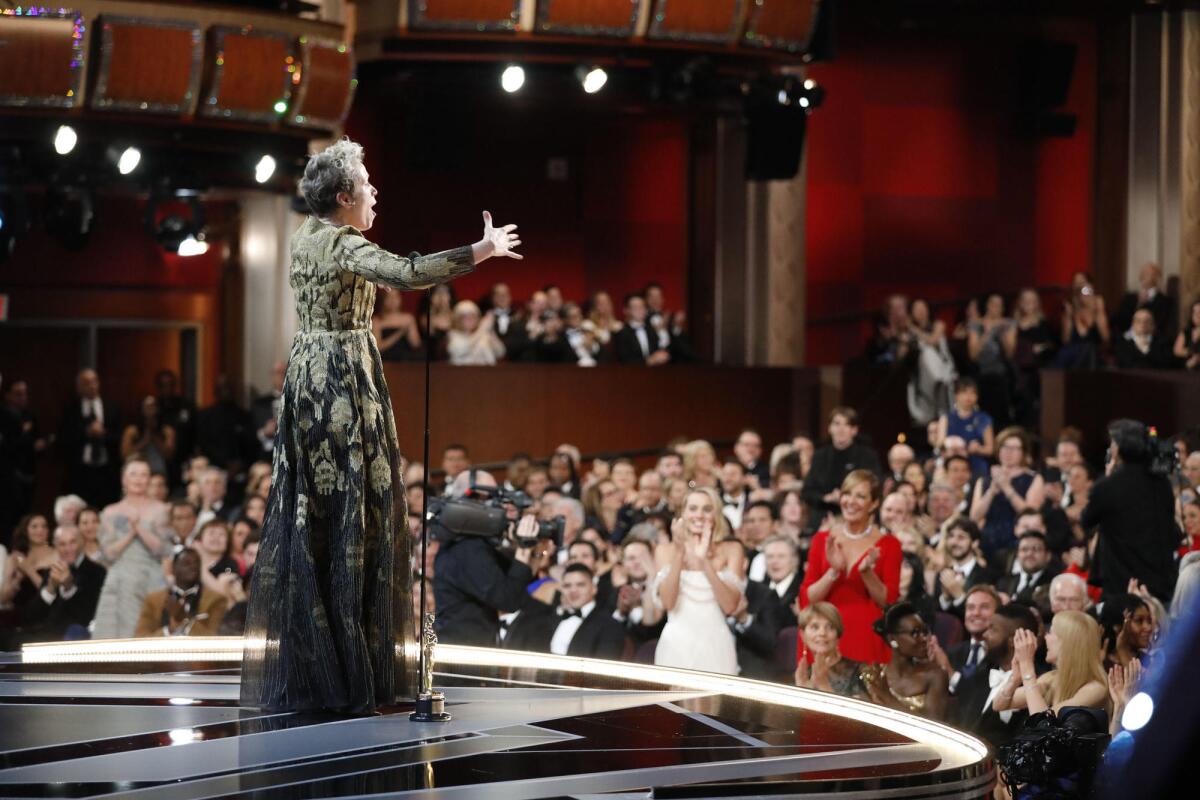
What if they awarded the Oscars and not one of the winners was a real surprise, not a single solitary one? What would the show be like, would people be glad they watched or wish they’d played pinochle instead?
That question is not an academic one — it happened Sunday night at the 90th Academy Awards. Of all the 24 little gold statues handed out, none of them could qualify as a genuine upset.
A night like this has been headed our way for quite some time as the world of Oscar prognostication has grown over the years from a genial hobby to a serious business practiced by crack teams of experts.
Analyzed and scrutinized from a multitude of angles for days, weeks and months, it was inevitable that many of the award’s secrets would be revealed, that the predilections of the academy members would be easier and easier to read.
Yet even as favorite followed favorite to the Dolby Theatre stage, there were reasons to be glad you were metaphorically in the house, watching it all play out.
Read MoreMORE PHOTOS: Red carpet | Show highlights | Backstage | Winners »
- Share via
Here is a minute by minute break down of the 90th Academy Awards
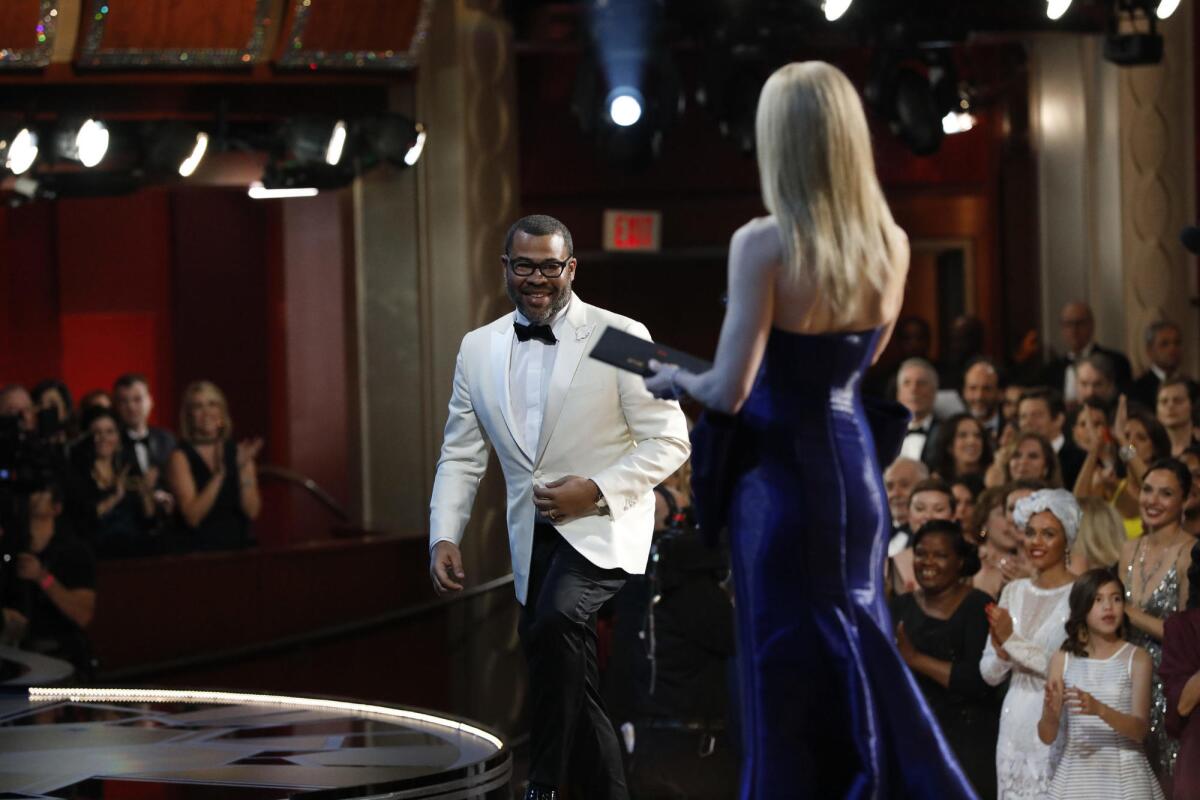
Sunday’s Oscars telecast clocked in at just under four hours. For this critic, here’s how the show broke down, minute by minute.
5:03 P.M.
Kimmel takes the stage
Jimmy Kimmel kicks things off with an acknowledgment of last year’s epic envelope snafu: “This year, when you hear your name called, do not get up right away.”
5:12 P.M.
In a “Price Is Right”-style giveaway, Kimmel offers a free jet ski to the winner who gives the shortest speech. A not-so-subtle way of saying “Hurry up, ski-daddle.”
Read MoreMORE PHOTOS: Red carpet | Show highlights | Backstage | Winners»
- Share via
Oscars’ TV audience dropped to 26.5 million — an all-time low
ABC’s telecast of the 90th Oscars was watched by 26.5 million viewers on Sunday, the smallest TV audience on record for the ceremony.
The average audience for the broadcast was down 19.5% from last year’s 32.9 million viewers and under the previous low of 32 million viewers in 2008, according to data from Nielsen.
ABC late-night host Jimmy Kimmel was the emcee of Sunday’s telecast, his second consecutive year in the role. Jon Stewart hosted in 2008.
- Share via
Man accused of stealing Frances McDormand’s Oscar is arrested; video shows him gloating with it
One person at the official Oscars after-party won himself a pair of handcuffs Sunday night.
Terry Bryant was arrested at the Governors Ball and accused of stealing Frances McDormand’s statue — after he took time to videotape himself bragging and gloating to others at the party about the prize his “team” was taking home.
The 47-year-old remained in custody Monday morning on a grand theft charge in lieu of $20,000 bail, according to the Los Angeles Police Department. He was arrested at 11:50 p.m. Sunday at the party site, which is inside Hollywood and Highland.
A photographer caught the alleged thief, LAPD Sgt. Meghan Aguilar said, and the department has seen the video of Bryant mugging on Facebook with the stolen Oscar claiming it was his. The department credits the photographer’s quick action with preventing Bryant from hightailing it with the stolen Oscar.
Aguilar said the photographer did not recognize Bryant as one of the winners, so followed him and took the statue from him without any resistance. The photographer then notified Governors Ball security, who apprehended Bryant.
Bryant had a legitimate ticket to the party, Aguilar said. Sources said that when Bryant was detained he appeared to have consumed a lot of alcohol.
In video posted to Facebook, the man who appears to also go by the name DJ Matari gloated and tried to find out the address of Jimmy Kimmel’s party.
“Lookit baby, my team got this tonight. This is mine. We got it tonight, baby,” he says before kissing the statue. “Governors Ball, baby. Who wants to wish me congratulations?” Hoots and air kisses followed. He said at one point he had won it for “music,” and later that he’d won for “best producer.”
The statue was lifted just after McDormand had it engraved at the official Oscars after-party, and she still didn’t have it with her at the Vanity Fair party later in the evening.
“Somebody tried to steal my Oscar at the Governors Ball,” she told producer Jason Blum as she made her way inside the Vanity Fair shindig. “Let me see someone try to pawn that!”
Staff writer Amy Kaufman contributed to this report.
UPDATE
1:26 p.m.: This article was updated with further details about the arrest.
11:58 a.m.: This article was updated with comment from LAPD Sgt. Meghan Aguilar.
This article was first published at 10:55 a.m.
- Share via
How Guillermo del Toro’s dark, innocent and mystical imagination propels his films
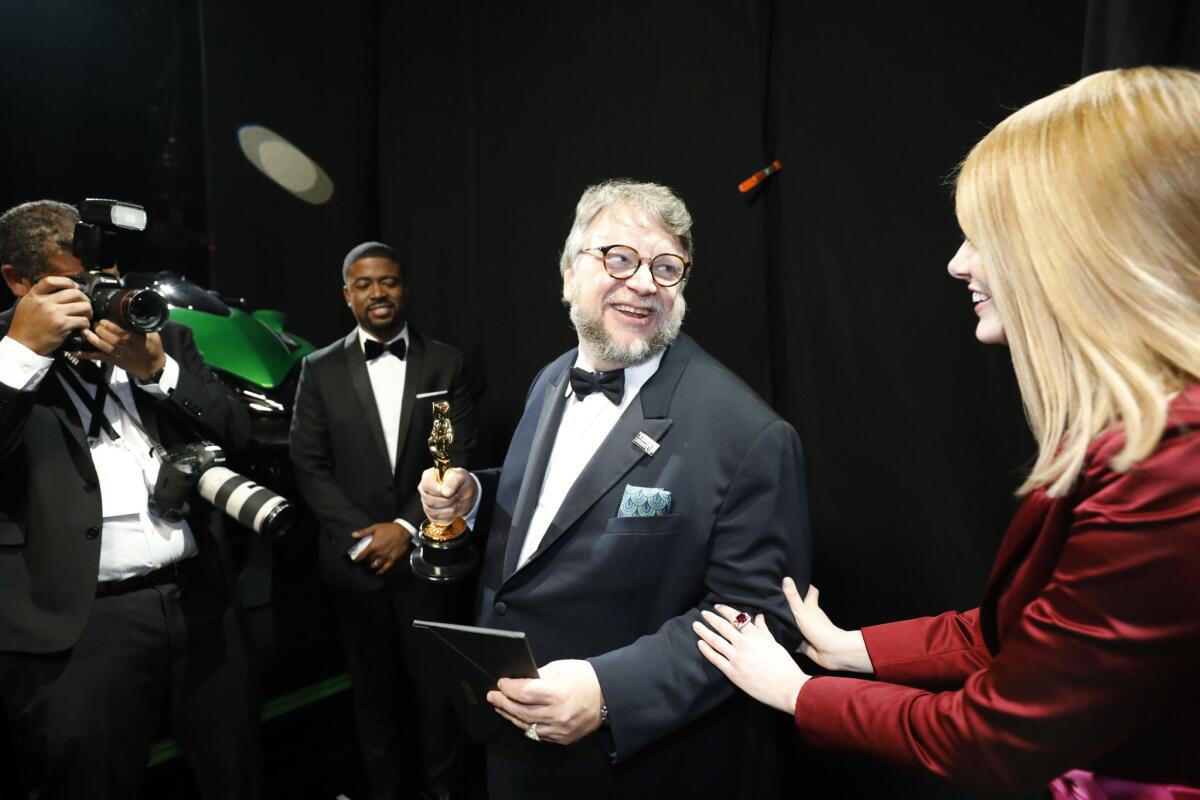
The greatest thing that art does — and our industry does — is erase the lines in the sand. We should continue doing that when the world tells us to make them deeper.
— Guillermo del Toro, filmmaker
Guillermo del Toro infuses the grotesque with innocence and wonder, as if he has slipped into our dreams and fascinations, not to judge, but to find truth and grace in the dark furrows and creaky hallways of human nature.
His characters, often children or those uncorrupted, are drawn into mystical and scary cinematic worlds of fairies, fauns, fallen bombs and, in the case of his best picture winner “The Shape of Water,” a fish-man in a Cold War parable who awakens the passions of a mute cleaning woman. Del Toro is a filmmaker who explores the soul of “the other” and how the things that frighten us can also heal and make us whole.
“I am an immigrant,” he said in his acceptance speech Sunday for his directing Oscar for “Shape of Water.” “The greatest thing that art does — and our industry does — is erase the lines in the sand. We should continue doing that when the world tells us to make them deeper.”
“The Shape of Water” is the refinement of that quest, a crucible of menace and cruelty that is transformed by the love of two misfits, one of this world, the other an exotic manifestation of another. It is in the subconscious — the flight of imagination — where Del Toro likes to play, notably in “Pan’s Labyrinth,” the story of a girl who escapes war and loss through her own fairy tale, and “The Devil’s Backbone,” about what lurks in the whispers and darkness at a boarding school.
Read MoreMORE PHOTOS: Red carpet | Show highlights | Backstage | Winners »
- Share via
What’s best and worst about awards season? The shoes definitely fall into one of those categories

On the Oscars red carpet, attendees at the 90th Academy Awards reflect on the best and worst parts of awards season.
Celebrating with peers, reuniting with castmates, talking about issues and seeing people they don’t get to see all the time. These are a few of Oscar-goers’ favorite things.
We asked folks on the Oscars red carpet Sunday about the best and worst parts of awards season, and — on the “worst” side of the conversation especially — a few themes emerged.
Hint: Even the guys were complaining about the shoes.
“It’s a lot of getting swirled up into hair and makeup, and the high heels,” Allison Janney said. “My foot, I really think I have to get an operation on my foot.”
- Share via
Review: 90th Academy Awards show speaks up yet keeps the smiles coming
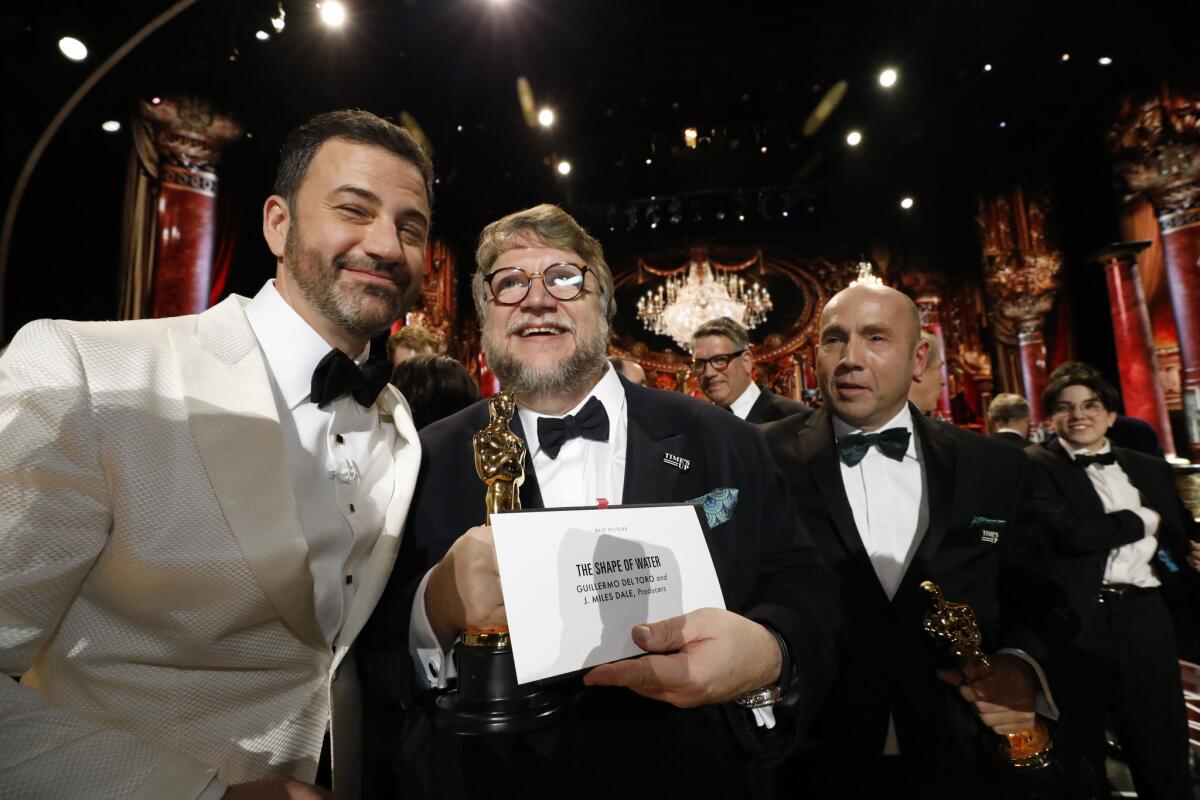
The 90th edition of the Academy Awards came and went Sunday evening, filling its nearly four hours with laughter and tears, self-mocking and self-celebration and more than a usual amount of music. Jimmy Kimmel hosted for a second time, handily.
It was, as always, a long flight, stimulating in its scenic views, enervating in its length. Compared with some earlier years, there was a decided lack of turbulence.
There were two main narrative thrusts to the evening, one looking backward, one looking ahead — looking ahead was also looking outward, to a more inclusive film industry.
The 90th Oscars ceremony was the reason for the first, which announced itself with a faux-historical, black-and-white newsreel opening and continued through the evening with well-edited montages featuring past winners of major categories. The message seemed to be that movies may have a long way to go in terms of diversity and representation but were always kind of woke: We have much to do, but we have done much.
Read MorePHOTOS: Red carpet | Show highlights | Backstage | Winners
- Share via
Watch the 5 best moments from the Oscars
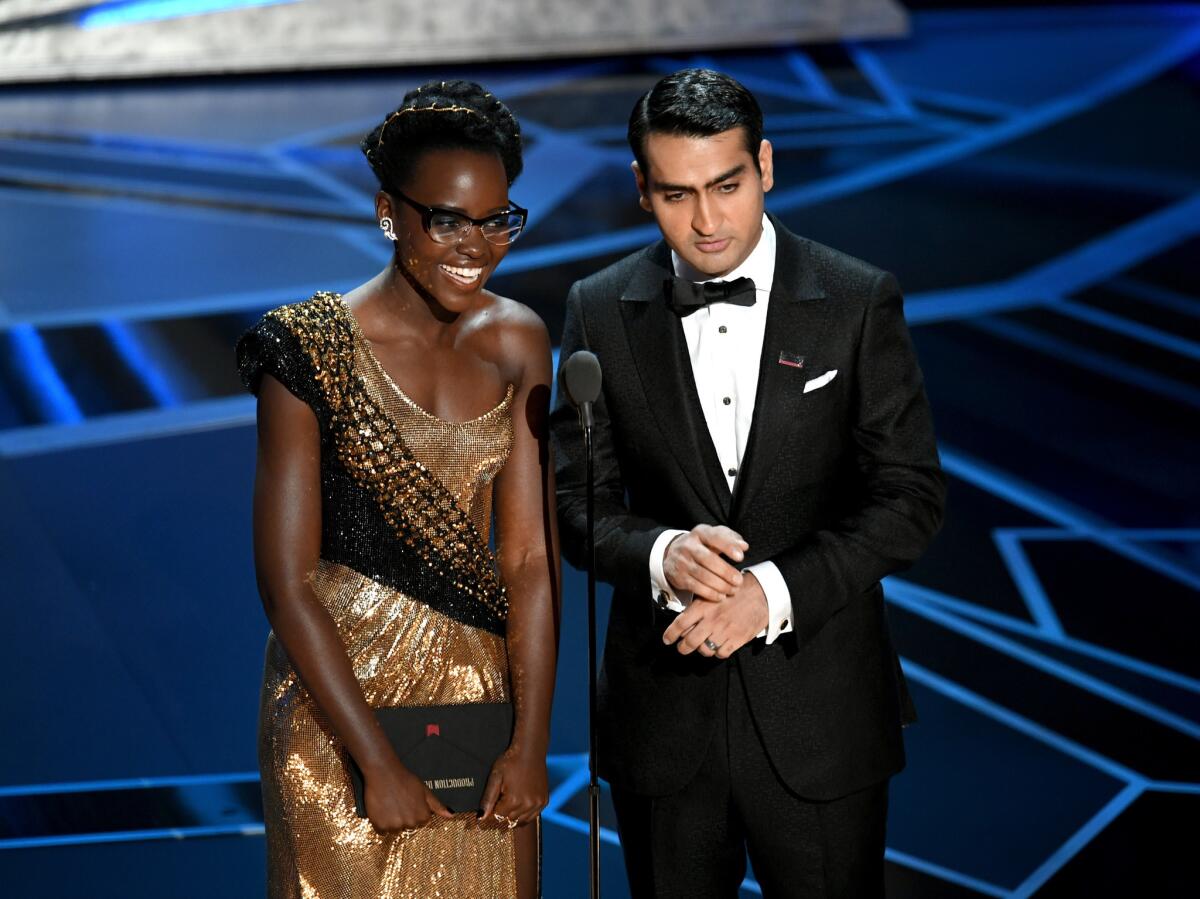
Missed the Oscars on Sunday night? Or having a hard time deciding what the best moments were? Allow us to be of service.
Jimmy Kimmel took aim at Harvey Weinstein, gave away a Jet Ski and popped into a movie theater with some famous friends. Emma Stone supported Greta Gerwig. Warren Beatty and Faye Dunaway redeemed themselves, and Guillermo del Toro double-checked that the envelope in fact declared “The Shape of Water” as the best picture winner.
But were those the most memorable moments? Nope.
Here are five of our faves, courtesy of several ladies (and Kumail Nanjiani) who dropped the act and brought realness to the Academy Awards.
1. Frances McDormand rouses the troops
In McDormand’s empowering acceptance speech for lead actress, she had some things to say, namely two mystifying words: inclusion rider. She also asked all the women nominees to stand with her.
2. Allison Janney brings the funny — all by herself
’Nuff said.
3. The dynamic duo of Tiffany Haddish and Maya Rudolph
The funny ladies had quite the #OscarsSoWhite observations. No heels required.
4. Lupita Nyong’o and Kumail Nanjiani take a stand
The presenters — whose names you have trouble pronouncing, they joked — gave a shout-out to the “Dreamers.”
5. That other dynamic duo: Jodie Foster and Jennifer Lawrence
The past Oscar winners stepped in for Casey Affleck and picked on Meryl Streep. Hence, Foster’s crutches.
- Share via
Mary J. Blige may not have won the Oscar but hers was the winning performance of the night
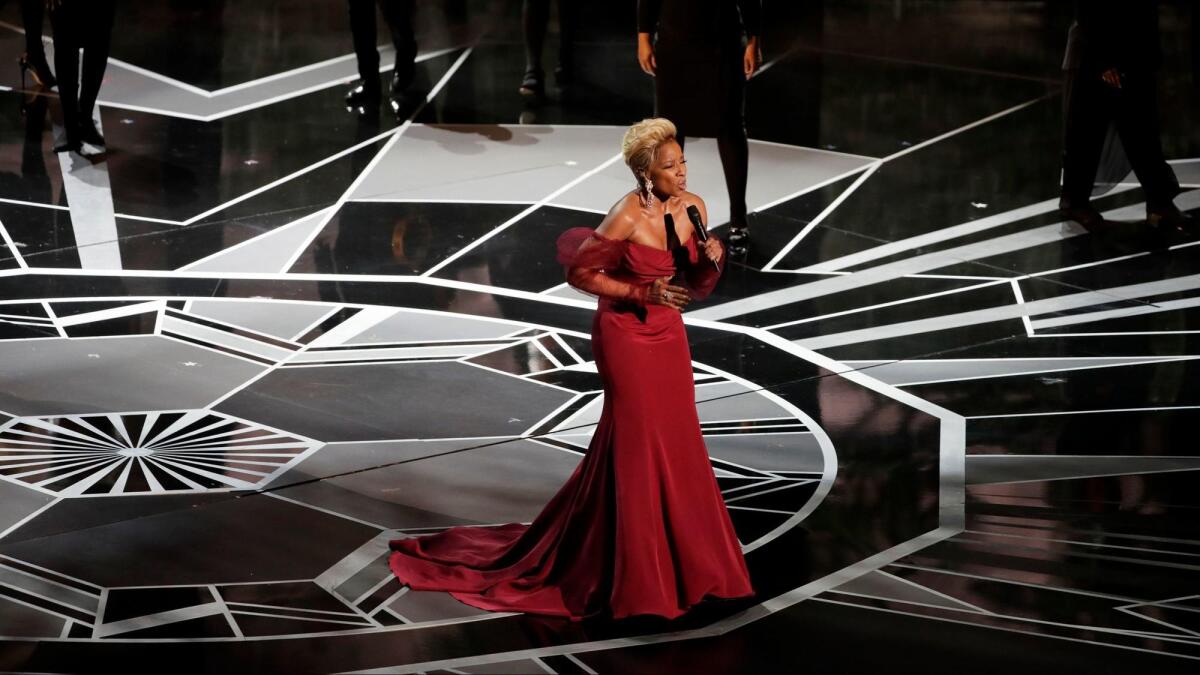
Listen closely, future Academy Awards performers: Do. Not. Let. Mary J. Blige. Sing. Before. You.
One of pop music’s most deeply committed performers, the veteran R&B artist almost always operates at 110%. And on Sunday’s Oscars telecast, where she gave the first of the night’s performances of the tunes nominated for original song, Blige made the acts that followed look like outmatched beginners.
Singing “Mighty River” from “Mudbound” — in which her screen performance led to a second Oscar nod, for supporting actress — Blige dug deep into the gospel-fired composition written by her, Raphael Saadiq and Taura Stinson.
She scrunched up her face as though experiencing the pain the song describes in lyrics like “Ego’s a killer / Greed is a monster.” She pushed her voice to its breaking point in a line about getting “this hurt off me.” And she ditched words altogether at one point to embody the type of salvation that can feel like a river’s cleansing waters.
- Share via
‘Roseanne,’ ‘House of Cards’ and ‘Mary Poppins Returns’ give sneak peeks during Oscars
Move over, Super Bowl. The Oscars are honing in on your trailer territory.
Three notable teasers made their debut during Sunday night’s ceremony, and they could not be more different.
The first look at Disney’s “Mary Poppins Returns,” starring Emily Blunt in the titular role and Lin-Manuel Miranda, hopes audiences are ready for whimsy.
The tease follows a wayward kite as it tumbles through a gray London day, eventually finding new life with a precious ragamuffin and his buddy Miranda.
Eventually the skies part and one Mary Poppins appears silhouetted in the sky via the kite.
Then there’s Poppins. We see Blunt examining herself in a mirror as Ben Whishaw and Emily Mortimer, playing the (now grown) Banks children from the original film, look on.
“Mary Poppins, it is wonderful to see you,” Whishaw says.
“Yes, it is, isn’t it,” Blunt replies, walking away from the mirror, leaving her reflection to give her the side eye.
See? Whimsy!
Audiences will have plenty of time to decide how “Mary Poppins Returns” is ruining their childhoods before the film premieres in theaters Dec. 25.
Meanwhile, Netflix gave fans their first look at the embattled, Kevin Spacey-less final season of “House of Cards.”
The only suggestion of former President Frank Underwood’s (Spacey) existence in the teaser trailer is a presidential portrait in a hallway quickly abandoned for the bustling offices within the White House.
The camera weaves its way through the crowd, finally reaching the Oval Office, where President Claire Underwood (Robin Wright) sits at her desk.
She turns in her chair, looks at the camera and says, “We’re just getting started.”
“Hail to the Chief,” reads the on-screen message that follows.
The show appears to be all systems go despite the November removal of Spacey in the wake of multiple of sexual assault and harassment accusations.
Viewers should be able to roll with anything, though. Claire became president during Season 5, and there’s apparently nothing more unbelievable than a female president.
“House of Cards” will return in the fall.
And finally, “Roseanne.”
ABC’s resurrected classic sitcom returns at the end of this month, nearly 21 years after the show’s finale in 1997.
“In the history of television, no family was quite like the Conners,” the teaser intones between clips from the original series.
“Nothing has changed,” it concludes before spinning off into new footage from the upcoming season.
The gang’s (nearly) all here in the teaser, which includes Laurie Metcalf, John Goodman, Sara Gilbert, Alicia Goranson and, of course, Roseanne Barr.
“Roseanne” returns March 27.
- Share via
Oscars red carpet: Let’s talk about the political movements sweeping Hollywood

Thoughts on the movements in Hollywood
The political movements mobilizing Hollywood toward inclusion and diversity may seem widespread, but insiders believe that Time’s Up and #MeToo are only just getting started.
“In the history of the United States, we’ve only been talking about sexual violence for four months,” #MeToo founder Tarana Burke told The Times on the red carpet. “People are already ready to rush to say what’s next. We have a lot to unpack where we are right now.”
As awareness increases, they hope that action does too.
“One of the most important things we can do is stand up and support women,” Oscar winner Common said. “If they don’t have equality, the world is out of balance. Now it’s important that we take the things that we’ve been doing and shift them and figure out ways to implement equality.”
- Share via
After months of #MeToo rage, Oscar night delivered smiles and odes to inclusiveness
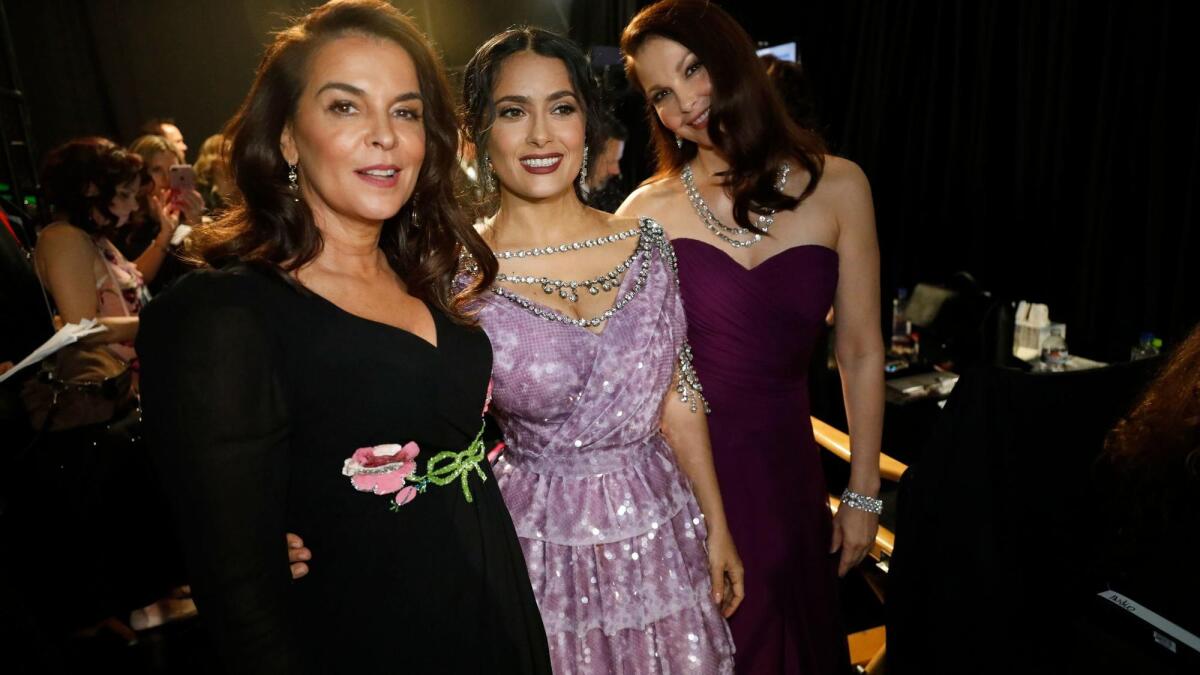
This was Hollywood at its sanitized best. After months of horrifying revelations about widespread sexual harassment and assault in the industry, the 90th Academy Awards presented a toothless, feel-good nod to the scandal.
So many of this year’s films feature transgressive female characters — Frances McDormand’s hell-bent mother in “Three Billboards Outside Ebbing, Missouri,” Margot Robbie’s blue-collar ice dancer in “I, Tonya” — but little of that anger made it onstage.
After winning for lead actress, McDormand asked every female nominee to stand and be acknowledged, a graceful gesture of support by a woman for women.
But where you might have expected some righteous rage, Oscar delivered only paeans to inclusiveness.
Earlier, a trio of actresses — all of whom were victimized by Harvey Weinstein — stood together onstage and declared that women were finally speaking as “a mighty chorus,” as one of them, Ashley Judd, put it.
- Share via
Frances McDormand lost her Oscar at the after-parties. Here’s how she found it
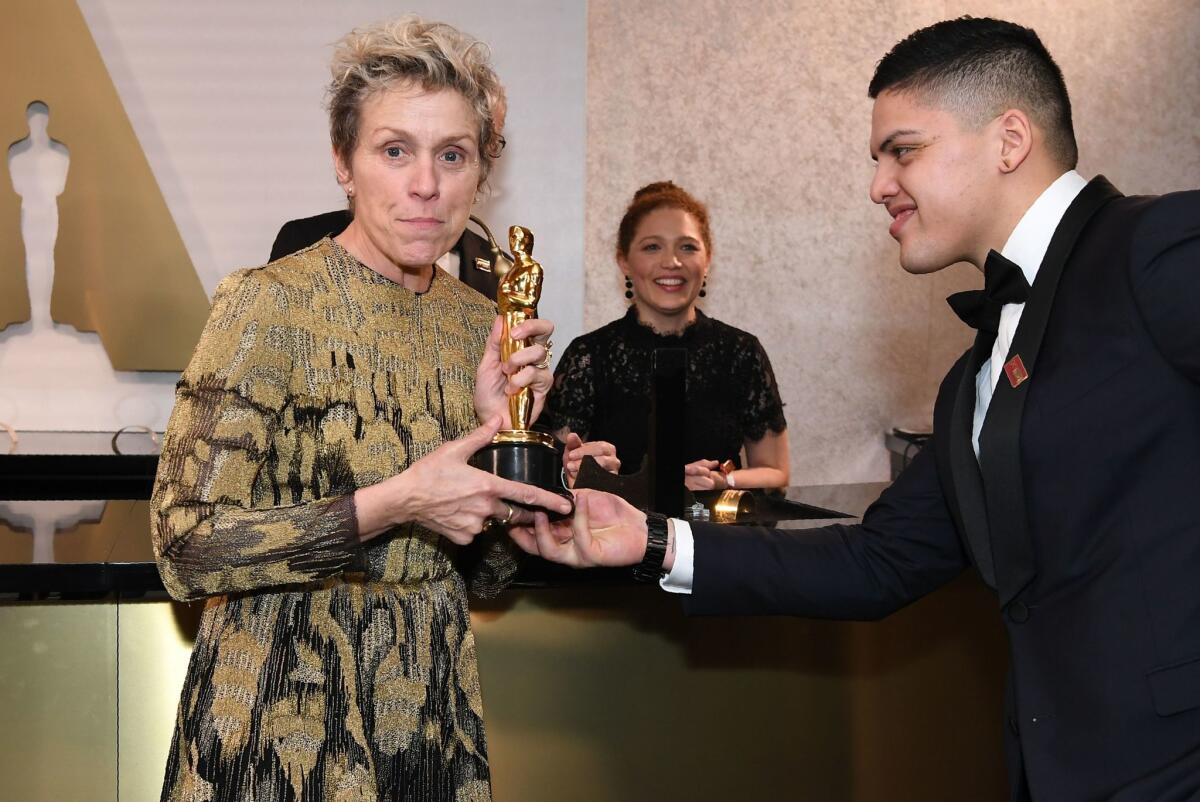
Somebody tried to steal my Oscar at the Governors Ball. Let me see someone try to pawn that!
— Oscar winner Frances McDormand
Amid the flowing Champagne, towers of seafood and passed plates of Wolfgang Puck cuisine, one of the most bizarre moments following Sunday’s telecast happened at the Governors Ball when a partygoer swiped Frances McDormand’s freshly engraved statue.
Late in the evening, McDormand was spotted red-faced from laughing and crying after an unidentified man lifted the trophy while she was chatting and darted out of the Ray Dolby Ballroom where the party was being held.
At one point, she turned to L.A. Times photographer Jay Clendenin and said, “I lost my Oscar.” Her handlers quickly rushed over to figure out where the sticky-fingered bandit had gone off to.
- Share via
Elton John Oscar-viewing party raises $5.9 million for his AIDS Foundation
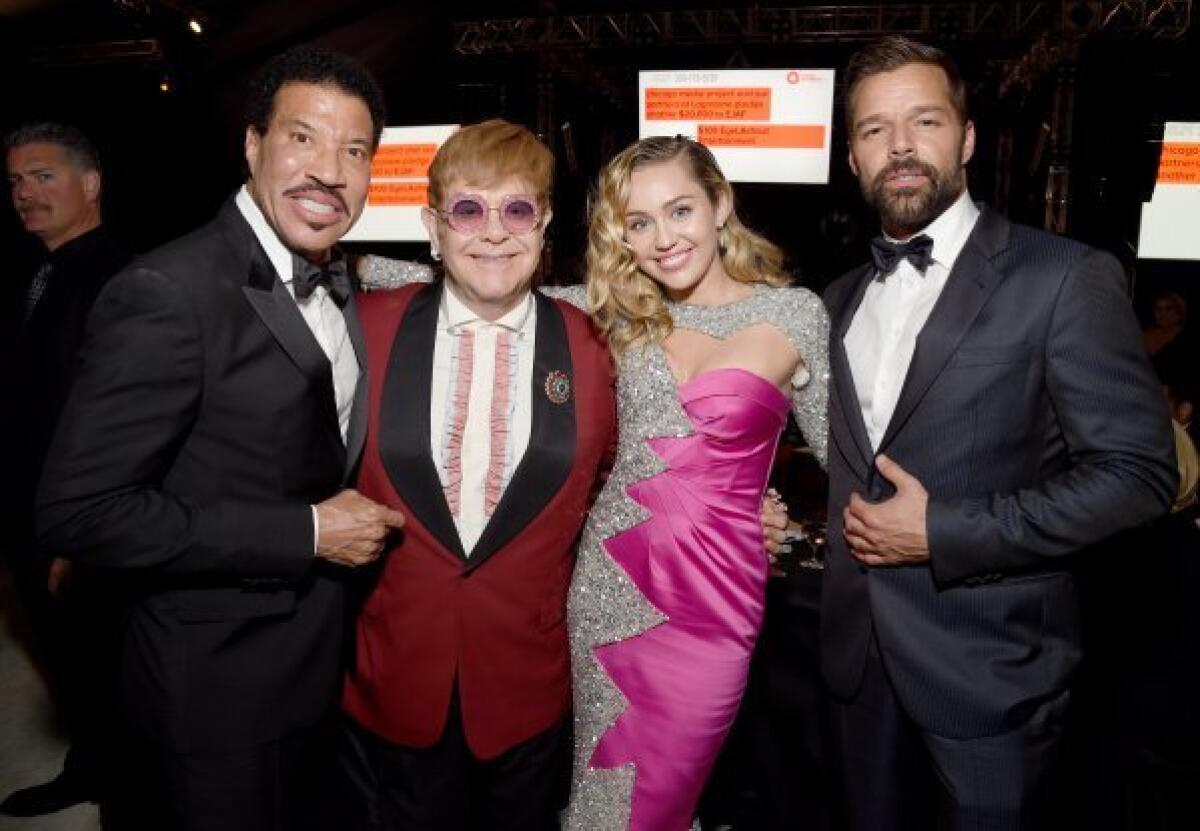
Nearly 1,000 invitees to Elton John’s 26th Academy Awards viewing party raised $5.9 million for his AIDS Foundation on Sunday night in West Hollywood.
The tony gathering under white tents set up in West Hollywood Park drew its own bevy of celebrities from film, music, TV and other realms. Among them were Miley Cyrus, Liam Hemsworth, Billie Jean King, Spike Lee, Lionel Richie, Quincy Jones, Zooey Deschanel, Gladys Knight, Heidi Klum, Ricky Martin, George Hamilton, Jennifer Garner, longtime Grammy Awards telecast executive producer Ken Ehrlich and John’s longtime songwriting collaborator, lyricist Bernie Taupin.
Attendees were invited to text in pledges as the Oscar telecast was displayed on multiple screens throughout the room. At one point, audience members were informed it was one of the rare events where “it’s OK to spend the night texting.”
The evening’s host was characteristically resplendent, wearing a rust-colored tux jacket and bejeweled round-frame glasses.
He and David Furnish, his husband and event co-creator, thanked guests for their contributions to the foundation, which has raised more than $400 million for various programs aimed at fighting AIDS globally since EJAF was founded in 1992 in the U.S., with a sibling foundation launched the following year in the U.K.
A live auction of several artworks and other items generated more than $725,000 on the spot Sunday, a major chunk of that for artist Chris Levine’s luminescent portrait of Queen Elizabeth II, “Lightness of Being, 2018,” which sold for $270,000. A Lalique sculpture that John created for the evening sold for $80,000.
Following the awards ceremony and live auction, John turned over the annual musical spotlight segment to Michigan-based hard rock band Greta Van Fleet, which let loose with Led Zeppelin-inspired riffs and decibels and high-pitched, Robert Plant-like vocals from lead singer Josh Kiszka.
“Whoever says rock music is dead is completely wrong,” said John, 70. “When I first saw them they knocked me out… They are going to be one of the biggest bands of the year.”
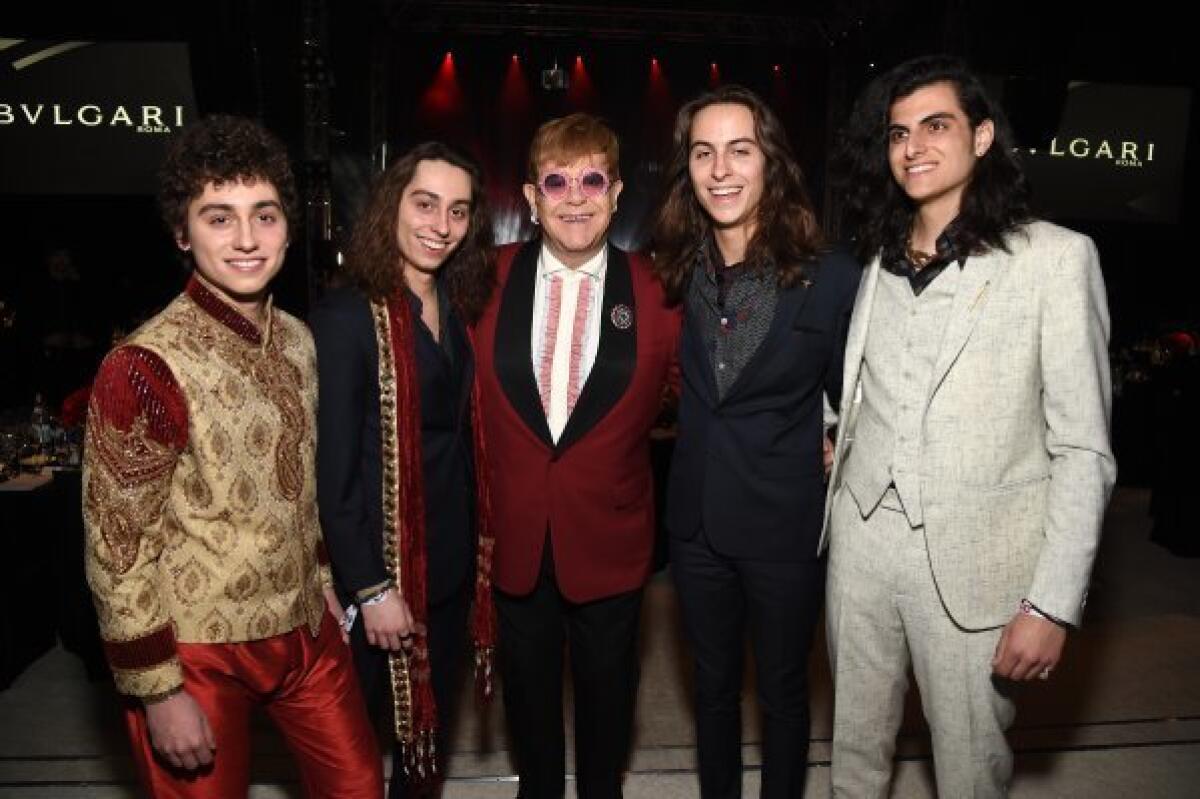
- Share via
Taraji P. Henson says she wasn’t dissing Ryan Seacrest at the Oscars
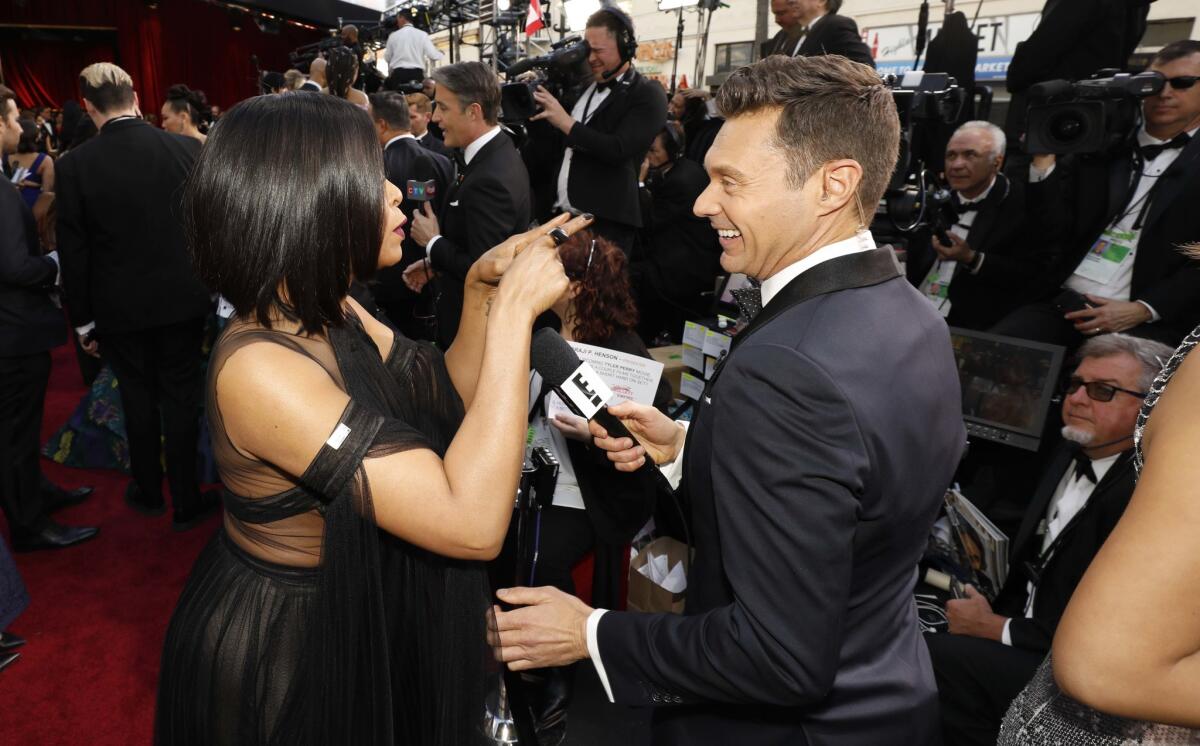
Turns out when Taraji P. Henson touched Ryan Seacrest under the chin on the Oscars red carpet, she was actually telling him to keep his chin up.
“You know what, the universe has a way of taking care of the good people,” the actress told the E! News host on Sunday night, flicking a finger under his chin as she continued, “You know what I mean?”
Twitter promptly blew up with people reacting to the moment, both for and against. Of course, the shade supporters drew more media attention, especially because Henson was one of the fewer-than-usual people who stopped to chat with Seacrest amid controversy over harassment accusations of which he’s been cleared.
Telling People later Sunday that she “absolutely” supports Seacrest as controversy dogs him, Henson clarified: “I did it to keep his chin up. It’s an awkward position to be in. He’s been cleared, but anyone can say anything.”
Too bad we didn’t keep watching through the rest of the exchange, which ended this way:
In the skeptics’ defense (and — let’s just say it — ours too), Henson’s comment to her next interviewer made her Seacrest exchange sound shadier than it turned out to be.
“I’m great now that I’m in your company,” the actress told ABC’ Wendi McLendon-Covey.
And here we thought Henson was throwing shade and then doubling down. But guess what? She’s just really, really nice.
- Share via
A glimpse behind the scenes at the 90th Academy Awards
From Jimmy Kimmel’s opening monologue to “The Shape of Water’s” best picture win, the 90th Academy Awards was a nearly four-hour long celebration of film. But not all of the evening’s magical scenes were shown on screen. Here are some candid behind-the-scenes moments captured backstage at Oscars 2018 that you didn’t see on TV.
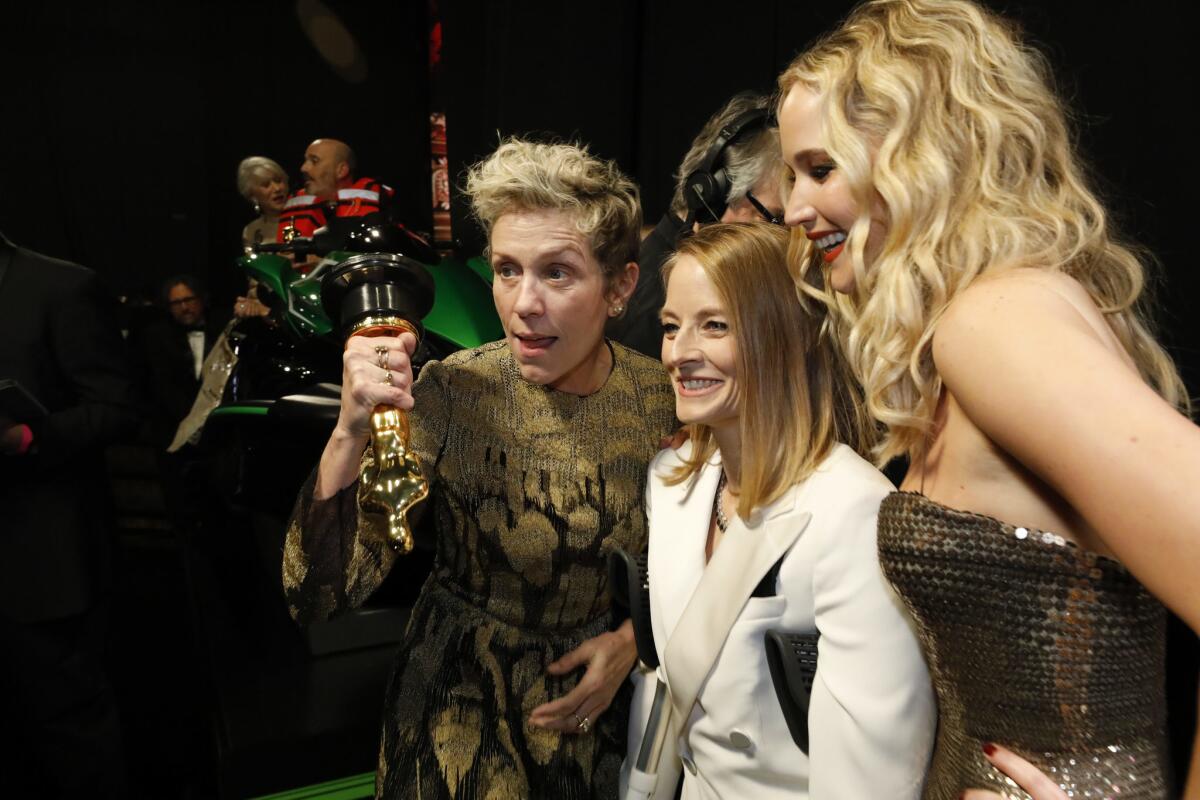
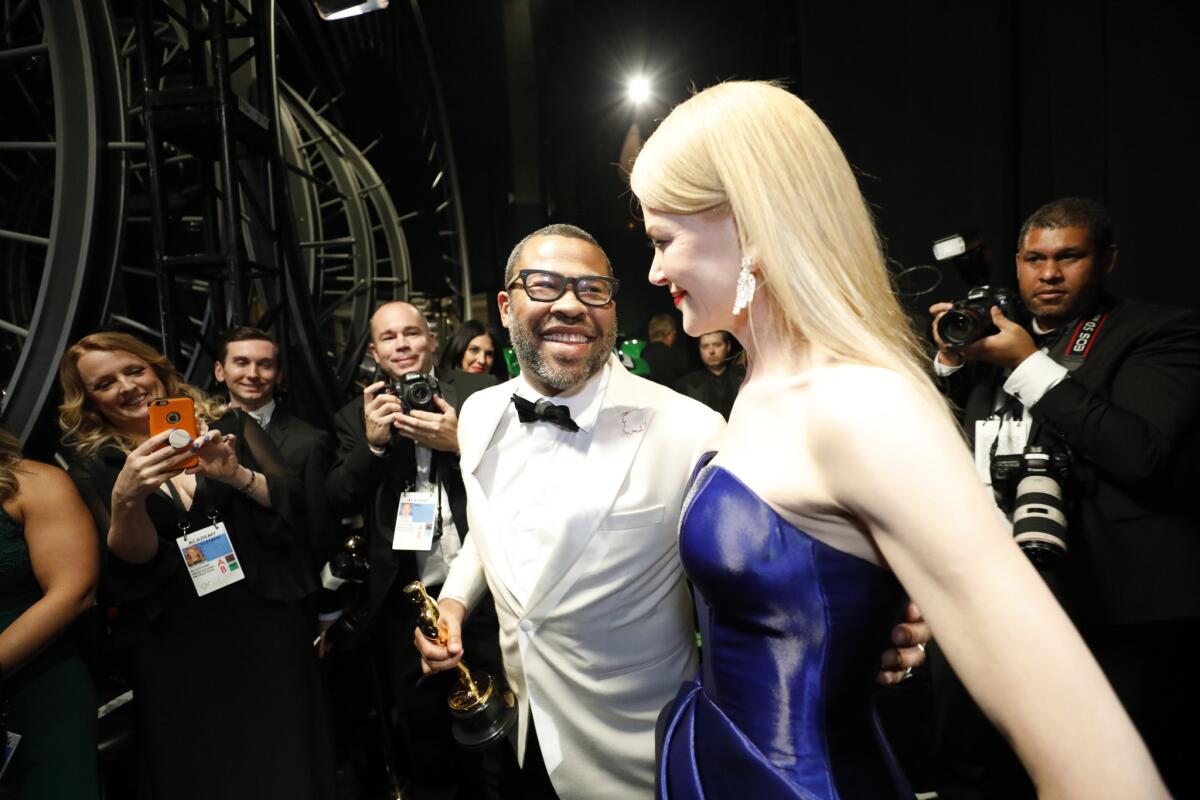
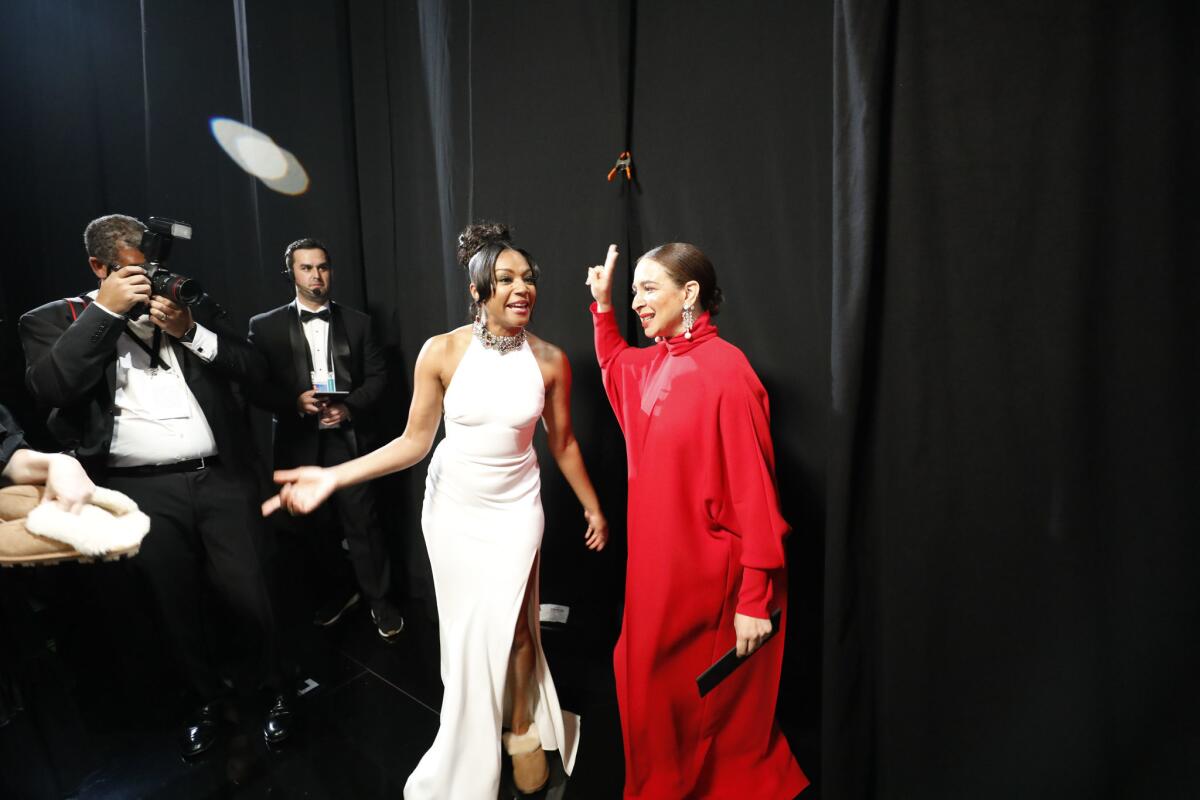
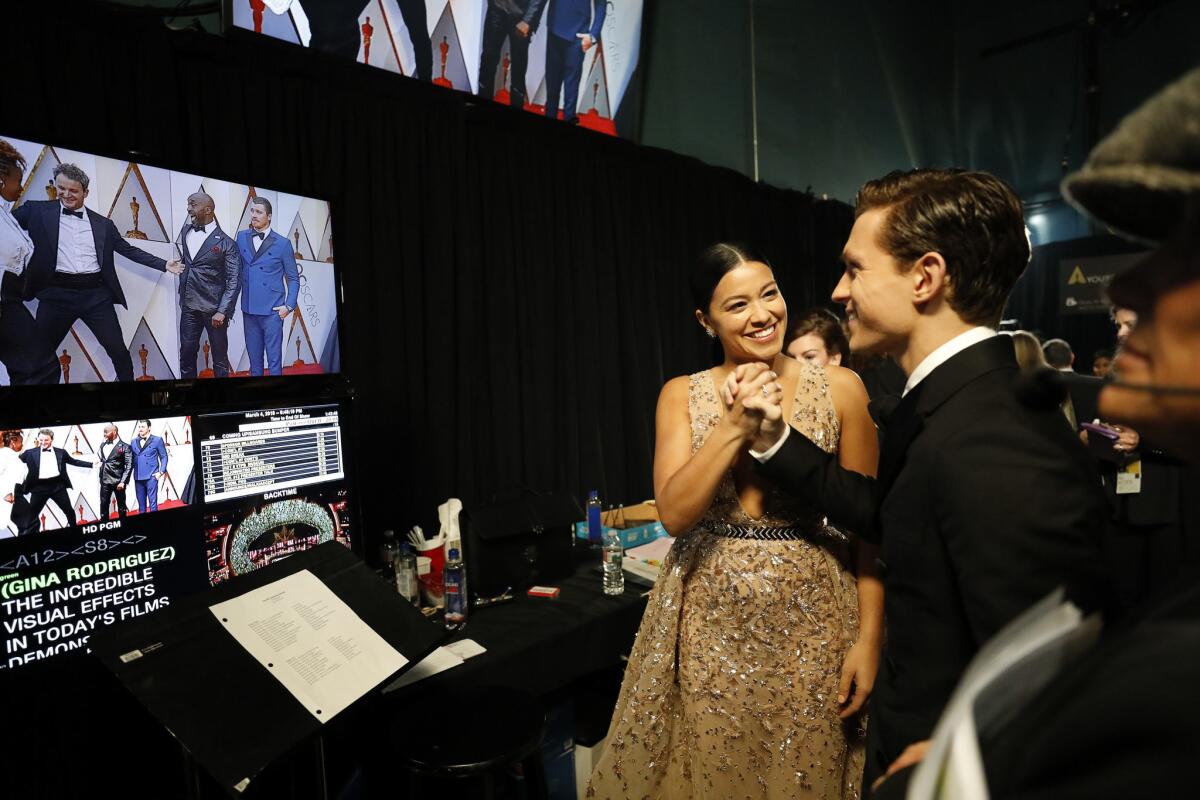
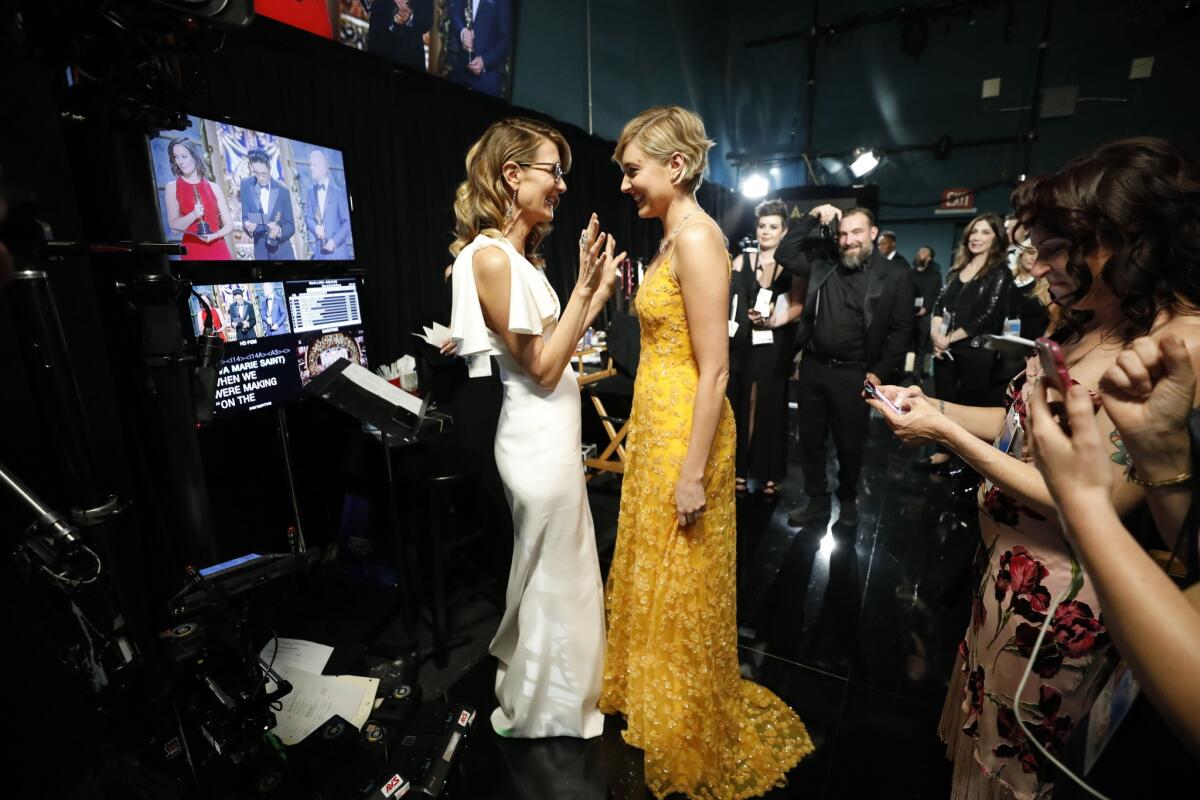
- Share via
How ‘The Shape of Water’ became the first sci-fi film to win best picture
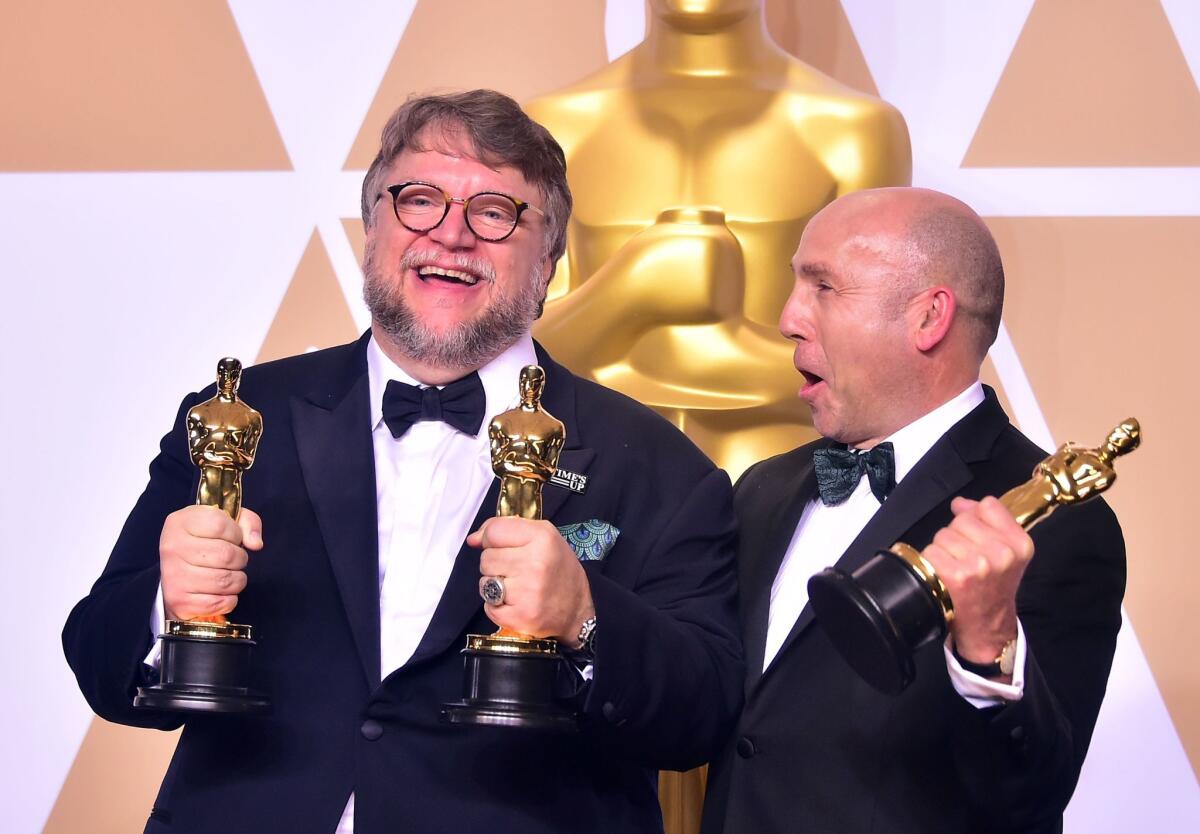
Love is much stronger than hatred, and it’s much more powerful than fear. … Love is the antidote to what we’re living through today.
— Guillermo del Toro, filmmaker
How did “The Shape of Water,” a movie about a mute cleaning woman falling truly, madly, deeply in love with a fish-man, wind up winning the Oscar for best picture?
It starts with the power of love, the film’s Oscar-winning director, Guillermo del Toro, says.
“Love is much stronger than hatred, and it’s much more powerful than fear,” Del Toro told The Times in a November interview. “Love is the antidote to what we’re living through today.”
- Share via
‘The Shape of Water’ wins best picture at the 90th Academy Awards on a night that balanced celebration and politics
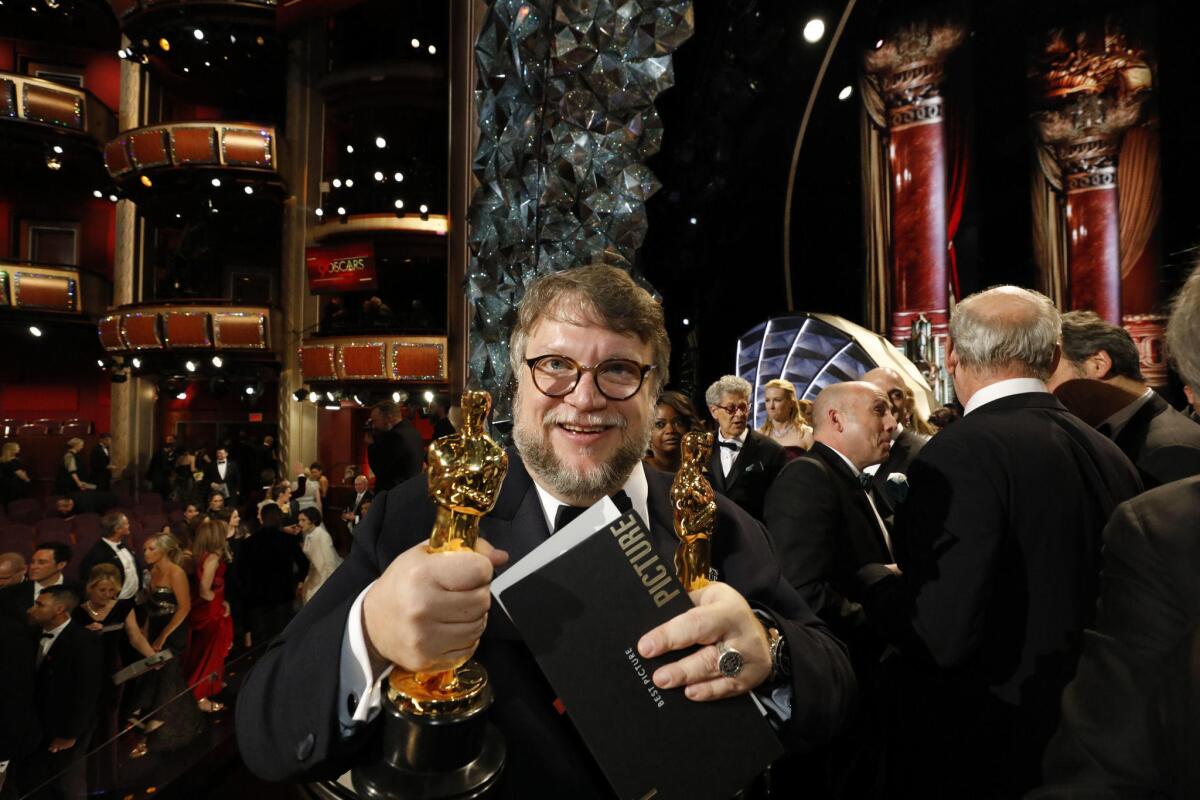
Bringing an end to one of the most wide open best picture races in years, “The Shape of Water” — a fantastical fable about a mute woman who falls in love with an aquatic creature — claimed the top prize Sunday night at the 90th Academy Awards, beating out a strong field of eight rivals that included box office hits such as “Dunkirk” and “Get Out” as well as smaller, more intimate fare such as “Call Me By Your Name” and “Lady Bird.”
Marking a moment of redemption for the Academy Awards themselves, the award was presented by Faye Dunaway and Warren Beatty, central players in last year’s shocking mix-up in which the musical “La La Land” was mistakenly named best picture over the actual winner, “Moonlight.” (“This year, when you hear your name called, don’t get up right away,” returning host Jimmy Kimmel joked in one of several nods to the bungle throughout the night. “Give us a minute. We don’t want another thing.”)
In contrast to last year’s chaos, this year’s wins proceeded in an orderly fashion, with many awards going to first-timers.
- Share via
Fox Searchlight dominates Oscars, with strong showing from Warner Bros.
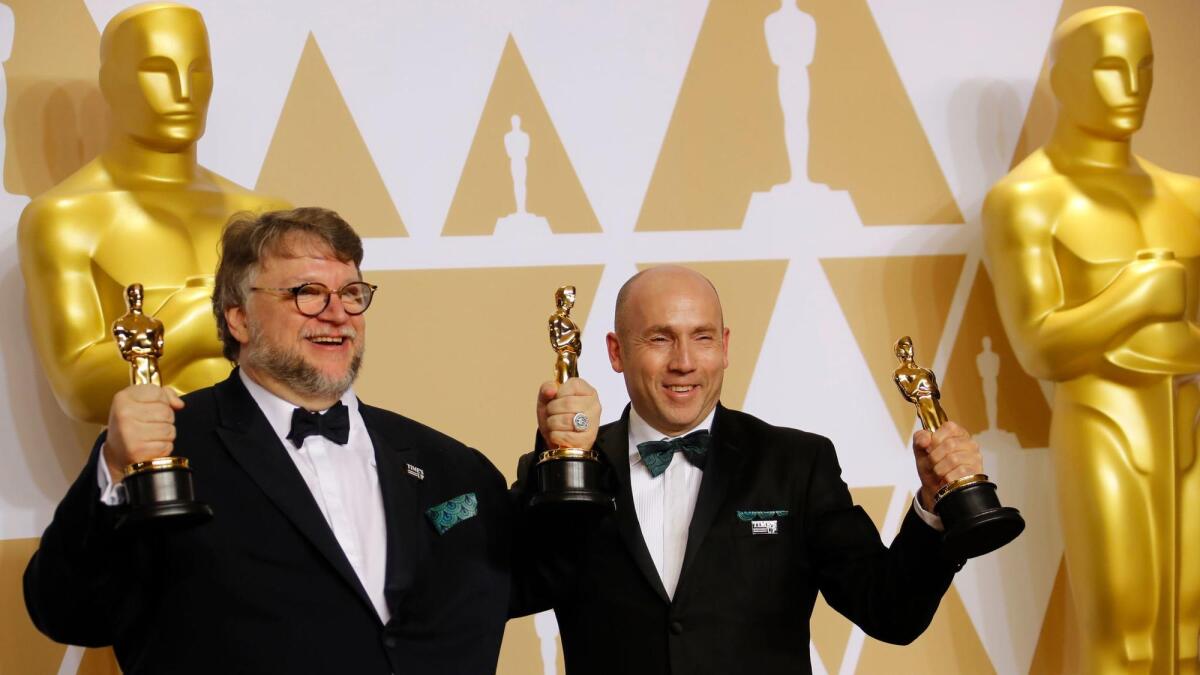
Buoyed by “The Shape of Water,” Fox Searchlight Pictures took home more Oscars than any other studio at the 90th Academy Awards on Sunday with six statuettes.
The best picture victory for “Shape” extends Searchlight’s enviable winning streak, which has seen the independent film label score best picture for “Birdman,” “12 Years a Slave” and “Slumdog Millionaire” in the last 10 years.
Warner Bros. put in a strong showing with five Oscars in the technical categories for “Dunkirk” and “Blade Runner 2049,” and Universal received four statuettes. Fox was the leader going into Sunday’s ceremony with 27 nominations, with Searchlight accounting for 20 of those.
“Shape’s” Guillermo del Toro singled out the indie studio in his acceptance speech for directing.
- Share via
With an Oscar win for ‘A Fantastic Woman,’ transgender rights take the spotlight
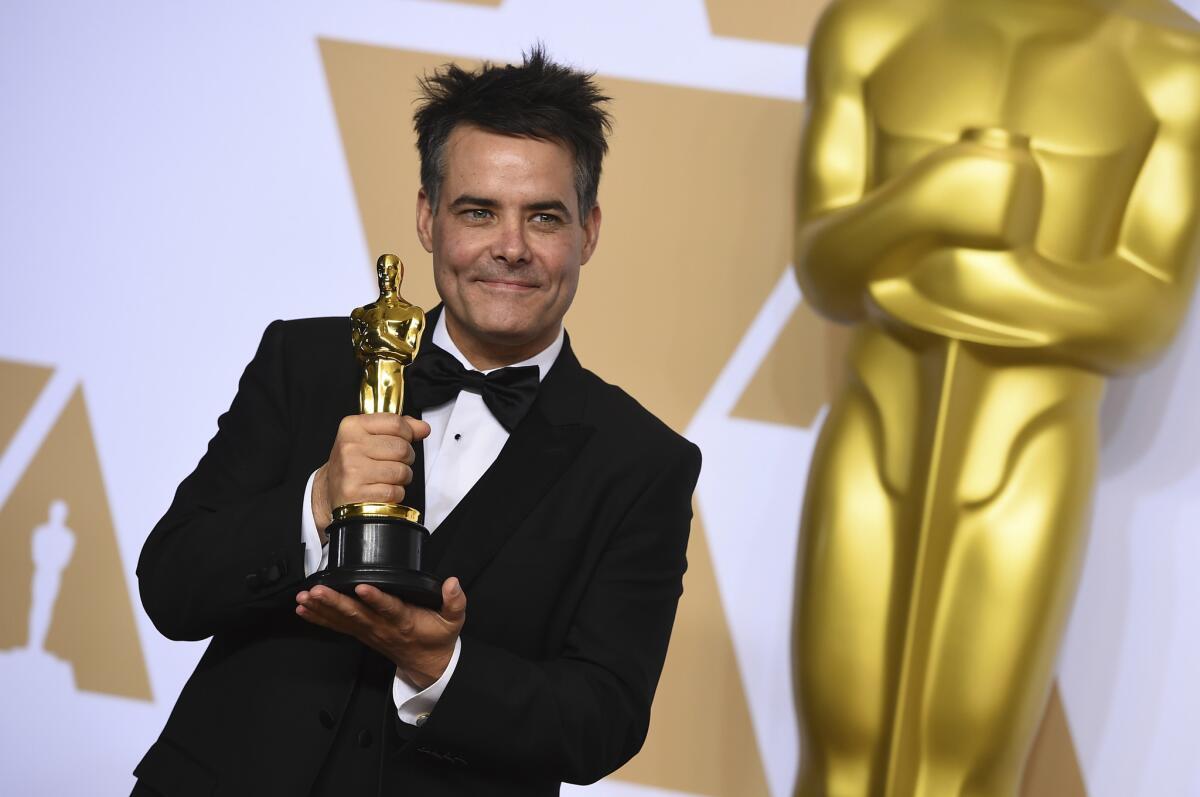
I’m on Jupiter. I can’t believe that this happened. It is a film that has managed to contribute to a necessary and urgent conversation.
— Sebastián Lelio on ‘A Fantastic Woman’
Sebastián Lelio’s “A Fantastic Woman,” which won the Academy Award for foreign-language film, is an unrepentant fable in a time when transgender people and others in the LGBTQ community are demanding wider rights in countries, including Chile, that have treated them as deviants and curiosities. The film follows Marina (played by transgender actress Daniela Vega) in a quiet rebellion for dignity against condescension and relentless humiliation.
“A Fantastic Woman” opens with Marina and her lover Orlando (Francisco Reyes) out on a date in Santiago. Things turn tragic when Orlando falls ill and dies. Marina grieves but also endures the scorn — both pointed and subtle — of a woman who is held in suspicion by Orlando’s family and the police. She moves through the story stunned but with the accustomed indignation that comes with being “the other.” In one scene, investigators subject her to a strip search, embarrassing her in the glare of florescent light.
Orlando’s ex-wife, Sonia (Aline Küppenheim), tells Marina with disdain: “When I look at you. I don’t know what I’m seeing.”
But she is unbroken; each slight brings a renewed resolve that has made the movie a bellwether for the transgender movement.
- Share via
Gary Oldman has regrets, even after his Oscar win
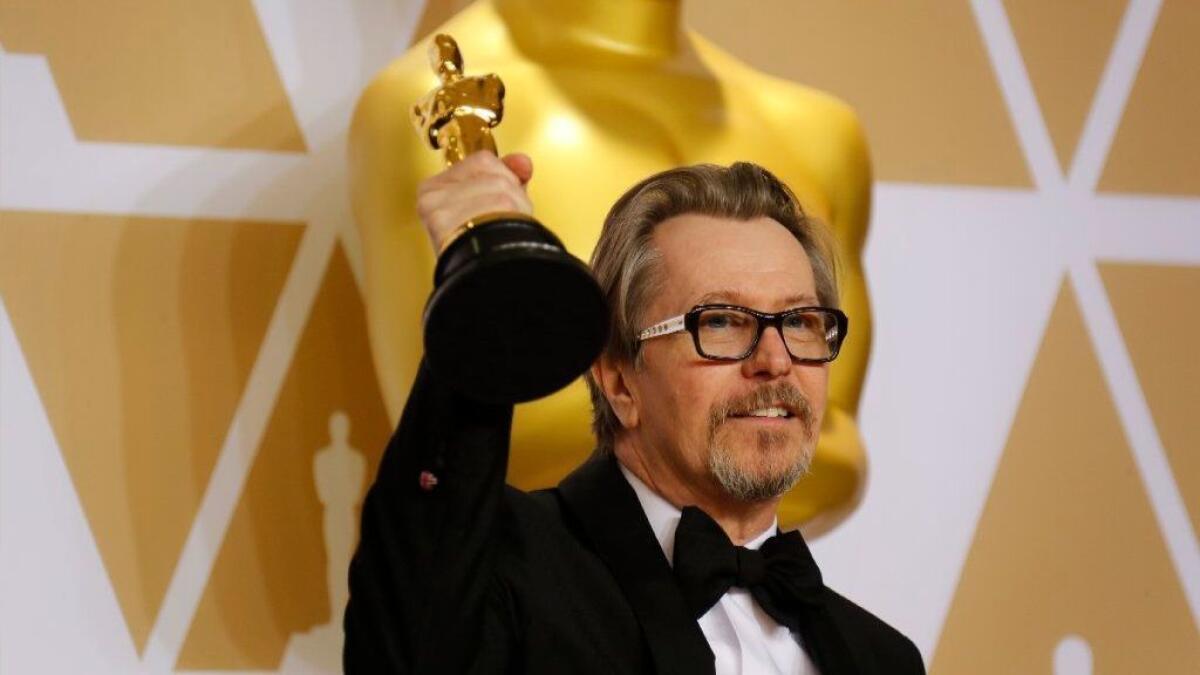
Gary Oldman won his first Oscar for playing Winston Churchill in “Darkest Hour,” and even though the film is set during World War II the actor feels it still speaks to today.
“[Director] Joe [Wright] would say that part of the movie is about doubt. But those insecurities and fears, we want to do things with the best intentions, and I would like to give people the benefit of the doubt and say they are motivated by a good heart and that they have the best intentions,” Oldman said in the press room backstage after his Oscar win.
“When you are in a position like I think Winston was in 1940, he sends 4,000 men to their deaths to save 300,000 … in war, those are the types of decisions you have to make. Then of course I don’t know how you would sleep soundly in your bed on the evening you sent 4,000 men to their death.
“And I think we … not to that extent, but most people in the audience, they’ve got financial burdens … they’re trying to put the kids through college or they have illness or sickness in their family. We’ve all got … and certainly I know I do, you know regrets and things.
“That’s the worst thing you can do as an artist is you can … second guess. I still sometimes have that little demon, that little voice.
The four actors Oldman trumped for the award include previous winner Denzel Washington and Daniel Day-Lewis and relative newcomers Timothee Chalamet and Daniel Kaluuya.
He had especially kind words for Chalamet, a critics favorite who had triumphed one day earlier at the Spirit Awards (where Oldman was not nominated). “I’m thrilled for Chalamet,” Oldman said. “He’s a lovely kid, and he really is, he’s a kid and he’s a charmer, hugely talented and I said to him tonight, in the words of Arnie, you’ll be back.”
- Share via
Rachel Shenton fulfills promise to ‘Silent Child’ star, signs Oscars speech
“The Silent Child” writer Rachel Shenton signed along to her acceptance speech when she won the Oscar for live-action short film.
Joined onstage by the director, Chris Overton, also her fiancé, Shenton said she promised their 6-year-old lead actress Maisie Sly that she’d do it.
“Our movie is about a deaf child being born into a world of silence. It’s not exaggerated or sensationalized for the movie. This is happening. Millions of children all over the world live in silence and face communication barriers and particularly access to education,” Shenton said.
“Deafness is a silent disability. You can’t see it and it’s not life-threatening,” she continued. “So I want to say the biggest of thank yous to the Academy for allowing us to put this in front of a mainstream audience.”
Shenton’s speech was a throwback to that of Oscar-winning actress Louise Fletcher. The “One Flew Over the Cuckoo’s Nest” star famously used sign language during her 1976 speech to express her gratitude to her parents.
- Share via
Guillermo del Toro lauds Mexican storytellers after Oscar wins
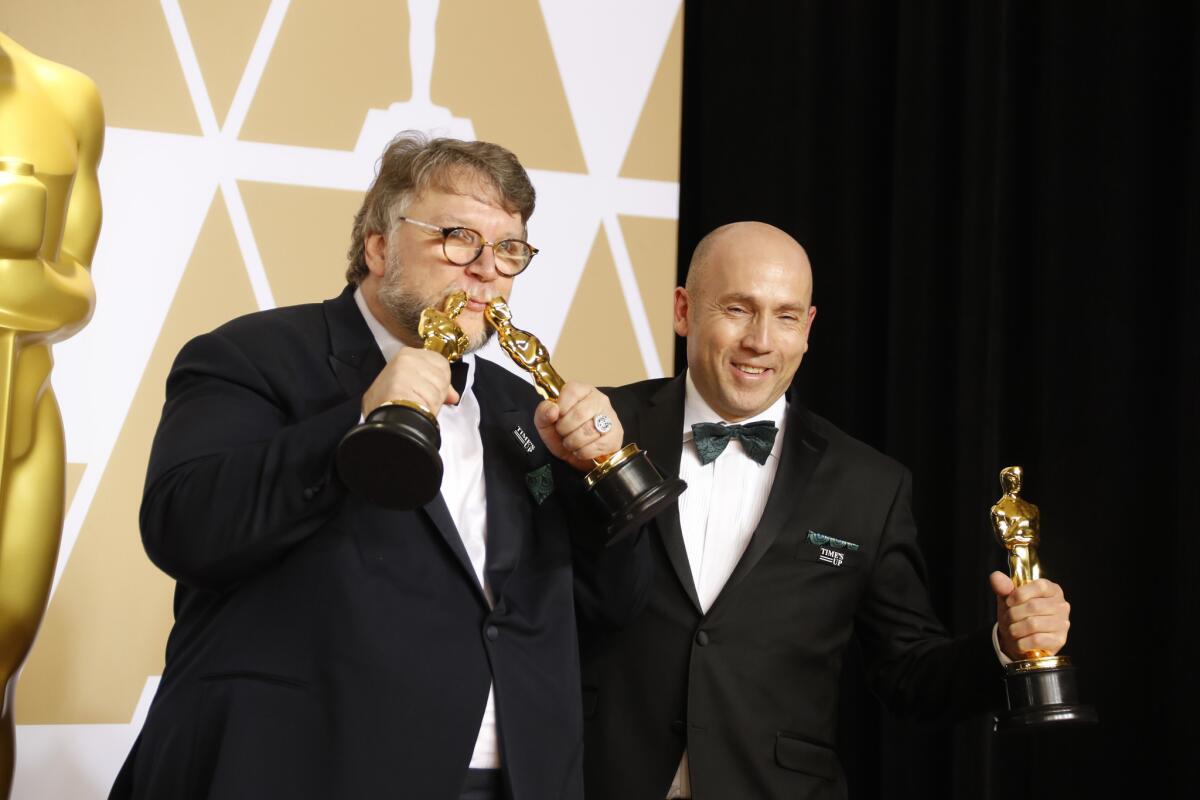
Guillermo del Toro, who won two of the night’s top honors (director and best picture for “The Shape of Water”), arrived at the press room after the show with the film’s producer, J. Miles Dale in tow.
The Mexican director volleyed questions in both English and Spanish about diversity and the significance of Mexican storytellers and stories.
“What we have to bring to the world discourse, to the world conversation is extremely important,” he said. “It’s honoring your roots and honoring your country.”
The director said his next stop would be back to Mexico, where he’s going to see his parents. “With these two,” he said, gesturing to his awards.
Del Toro was also asked what else is going on at Fox Searchlight. “It’s above my pay grade,” he said. “But what I know is I’m continuing conversations with them about future projects.”
When asked why he chose to set “The Shape of Water” in Baltimore, Del Toro said he fell in love with the the city as a kid via Barry Levinson’s “The Baltimore Trilogy.”
“I think that those three films, ‘Avalon,’ ‘Diner’ and ‘Tin Man,’ are fabulous landmarks of American cinema,” he said.
Through “Shape of Water,” which took home four statues Sunday night, the director sought to draw a parallel to Levinson’s “Tin Man,” particularly with the Cadillacs and their symbolic representation of American.
“I loved the setting,” he said of the city. “And I know we screwed up with the accent, I’m aware of that. But what I wanted was to capture that flavor. It’s such an interesting mixture, the Catholic, the industrial, how near it is to the ocean.”
Anything left to say?
“Oh, yes, a lot,” he said. “I have a lot of cousins, man.”
- Share via
Guillermo del Toro’s speech for director celebrated the power of filmmaking

Guillermo del Toro wins the 2018 Academy Award for directing for “The Shape of Water.”
Accepting his Oscar for director on Sunday, Guillermo del Toro extolled the virtues of filmmaking.
“I am an immigrant like [fellow Mexican directors] Alfonso [Cuarón] and Alejandro [G. Iñárritu], my compadres. Like Gael [García Bernal], like Salma [Hayek] and like many, many of you.
In the last 25 years I’ve been living in a country all of our own. Part of it is here, part of it is in Europe, part of it is everywhere. Because I think that the greatest thing our art does and our industry does is to erase the lines in the sand. We should continue doing that when the world tells us to make them deeper.
The place I like to live the most is at Fox Searchlight because in 2014, they came to listen to a mad pitch with some drawings and the story and a maquette. And they believed that a fairy tale about an amphibian god and mute woman done in the style of Douglas Sirk, and a musical and a thriller was a sure bet.
I want to thank the people that have come with me all the way: Kimmy, Robert, Gary, Wayne and George. And my kids. And I wanna say, like Jimmy Cagney said once, ‘My mother thanks you, my father thanks you, my brothers and sisters thank you. And I thank you very much.’”
- Share via
For Jordan Peele, his Oscar win for ‘Get Out’ marks the beginning of a movement for black directors
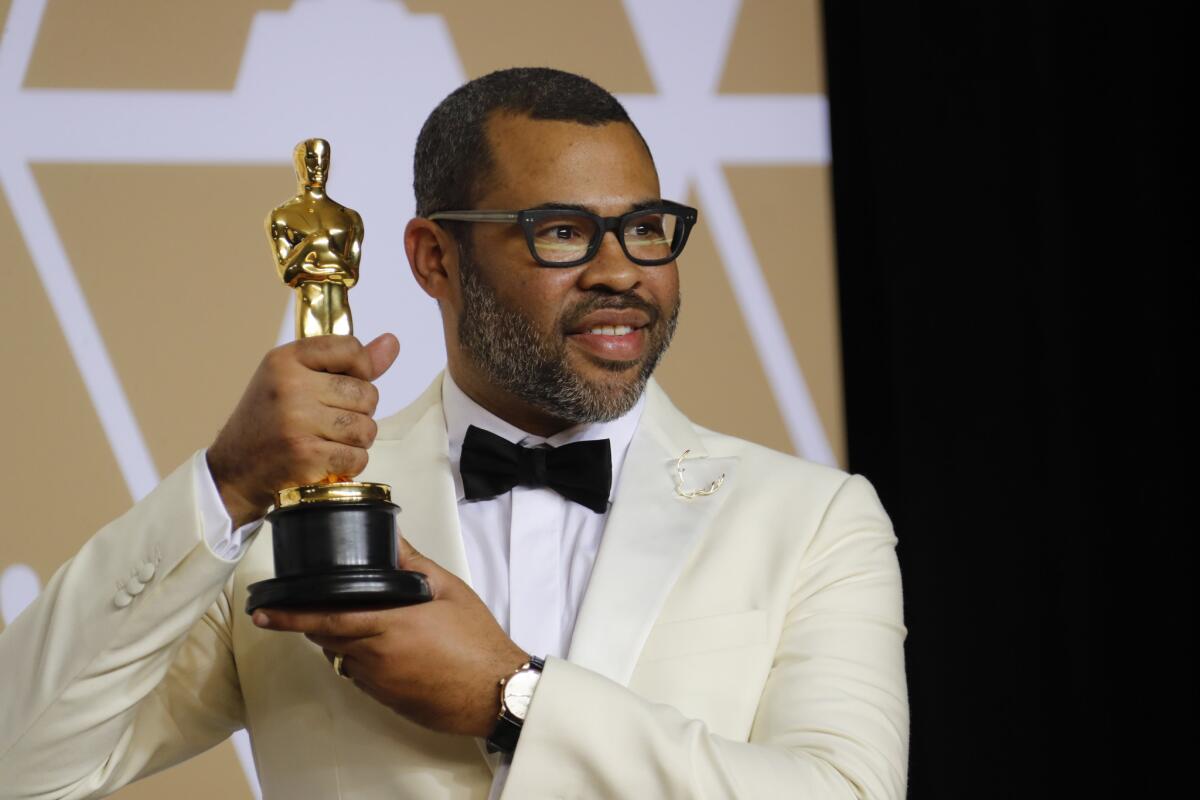
“Am I about to be auctioned off right now?”
That’s how Jordan Peele started off his question-and-answer session backstage at the Academy Awards on Sunday, when the “Get Out” writer-director faced a crowd of reporters after winning the Oscar for best original screenplay. He noted the honor was about more than him.
“I didn’t know how important this was,” he said. “I always wanted this, but the campaign is grueling and there were times where I questioned what it was all about [because] you’re watching your last jumpshot for a year. As an artist, that doesn’t feel right.”
But when the nominations came out, Peele said, he had that “amazing” feeling of looking at “that 12-year-old that had this burning in my gut for this type of validation, and I instantly realized that an award like this is much bigger than me. This is about paying it forward to the young people.”
After the academy announced his nomination, he was reminded of Whoopi Goldberg’s 1991 Oscar acceptance speech for best supporting actress in “Ghost.” He reached out to her, he said, and thanked her “for telling young people who maybe doubted themselves that they could do it.”
Peele said that when he was younger, he longed for role models but found few beyond Spike Lee, John Singleton and Mario and Melvin Van Peebles. He is happy to be a role model for those coming behind him, along with the likes of directors Ava DuVernay, Ryan Coogler, Barry Jenkins (“Moonlight”) and F. Gary Gray (“Friday”).
“It’s a renaissance,” he said of this moment when films like DuVernay’s “A Wrinkle in Time” and Coogler’s “Black Panther” will be in the cinematic conversation at the same time. “I’m glad to be part of a time, the beginning of a movement, where the best films of every genre are being brought to me by my fellow black directors.”
- Share via
More from Oscar winner Frances McDormand on ‘inclusion rider’ (she just learned about it too)
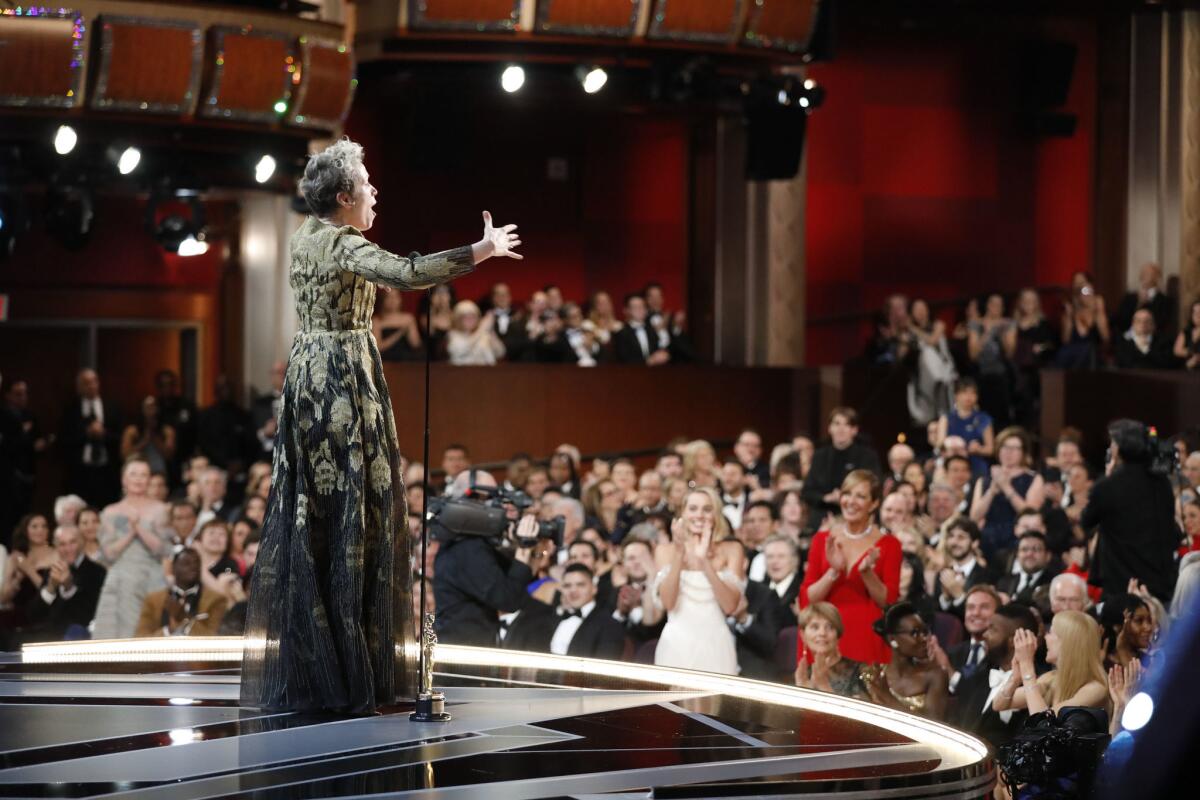
Frances McDormand arrived in the press room after winning the Oscar for her work in Martin McDonagh’s “Three Billboards Outside Ebbing, Missouri,” and she had just been informed of the online confusion that arose after she ended her rousing acceptance speech with two words: inclusion rider.
“I just found out about this last week — there has always been available to everybody that does negotiation on film, an inclusion rider, which means you can ask for, and/or demand, at least 50% diversity, in not only the casting, but in the crew, so I just learned that after 35 years of being in the film business: We’re not going back,” she said to loud applause.
McDormand stopped short of saying that this year was a historic year for the idea of inclusion, instead citing the 2017 win of the indie-film-that-could, “Moonlight,” as the beginning of the tide that has swept the industry.
When someone pointed out that “Three Billboards” has started a movement, with social justice billboards cropping up in Florida in the name of gun control and in front of the United Nations about the Syrian crisis, McDormand became animated.
“Recently my husband and I were in London, and we went to Tate Modern and saw an exhibition about the Russian Revolution and the propaganda that was used,” she said. “Now, that revolution didn’t go too well, so we don’t want to think too much about that — but red and black is a really good choice, and Martin McDonagh knew that. He was involved in the choice to use that kind of iconography.”
“Billboards still work — they still work,” she said. “That’s the kind of power that an image can have, and that’s what we’re making — we’re making powerful images.”
After only five minutes McDormand, the woman of the hour, was whisked away, but not before she was asked about the impact “Three Billboards” will have in China where it was just released.
“Are they going to see it?” McDormand asked of Chinese audiences.
When she was told that so far it has only made about $1 million in box office revenue she said, “We need to get a little more people in cinemas. It is not America — does not represent America — but it represents a really good conversation about compassion and inclusion.”
- Share via
Oscars fashion poll: You thought the best-dressed stars were Chadwick Boseman, Allison Williams and Darrell Britt-Gibson
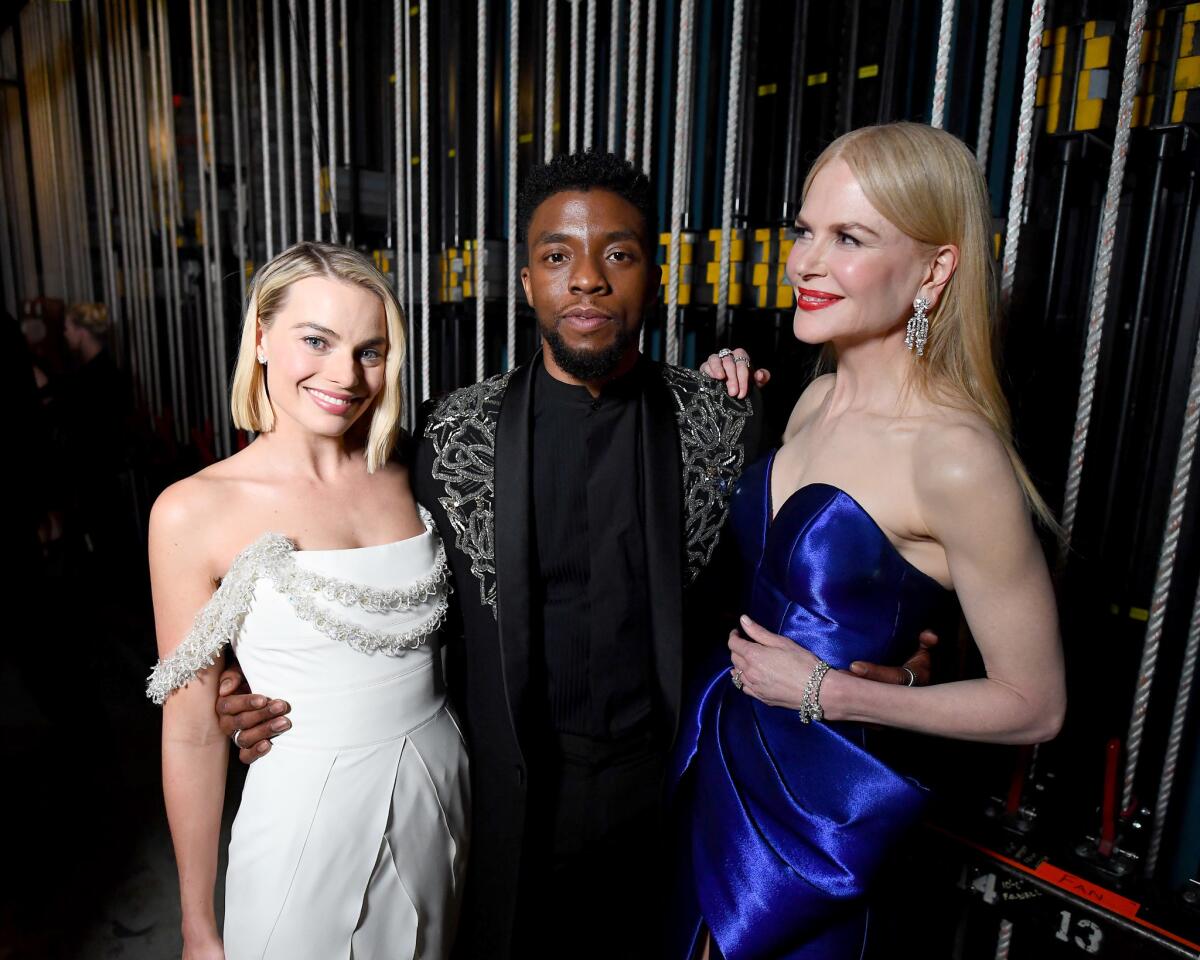
We did an Instagram poll during the Oscars on Sunday to find out what our followers thought were the best/worst looks on the red carpet. Like today’s political climate, there were a few truly polarizing choices.
Overwhelmingly, viewers appeared to like risk-taking menswear, whether it meant pink satin jackets, all-white ensembles or regally embellished coats. Initially ridiculed, now ankle-high men’s trousers appear to have passed the acceptance test.
For men, there was a tie. Top honors went to “Black Panther” star Chadwick Boseman and “Three Billboards Outside Ebbing, Missouri” co-star Darrell Britt-Gibson.
The views on women’s wear were less unified. Though previous Oscar winner Rita Moreno’s historic, vintage dress was the most talked about of the night, it wasn’t the most loved. That honor for women went to “Get Out” co-star Allison Williams and her very proper, princess-y dress.
Given how simpler, classic looks scored better overall than the avant garde, perhaps now we know why women play it so safe on the red carpet.
Here are the results of our Instagram poll from just after the conclusion of the 90th Academy Awards:
Allison Williams: 92% best, 8% worst
Allison Janney: 87% best, 13% worst
Rita Moreno: 60% best, 40% worst
Daniel Kaluuya: 75% best, 25% worst
Mary J. Blige: 72% best, 28% worst
Darrell Britt-Gibson: 90% best, 10% worst
Taraji P. Henson: 74% best, 26% worst
St. Vincent: 12% best, 88% worst
Greta Gerwig: 81% best, 19% worst
Chadwick Boseman: 90% best, 10% worst
Timothée Chalamet: 71% best, 29% worst
Saoirse Ronan: 66% best, 34% worst
- Share via
Netflix earns its first feature film Oscar as ‘Icarus’ wins in the documentary category
This year’s nominees for documentary feature all had some pretty phenomenal stories behind the scenes along with what went on the screen.
The Oscar went to “Icarus,” a real-life espionage story about Dr. Grigory Rodchenkov, a scientist turned whistleblower who helped bring down the immense state-sponsored apparatus in place for the illicit doping of Russian Olympic athletes.
The win marked the first Oscar to go to a feature film from the streaming service Netflix.
- Share via
Watch Jimmy Kimmel’s Oscars opening monologue
In the 90th Oscars’ opening monologue, host Jimmy Kimmel riffed on last year’s best picture gaffe, Harvey Weinstein and the representation of women and minorities in Hollywood.
And he actually made those things kind of funny. All that with only about a bajillion Swarovski crystals sparkling on the set behind him.
Hey, it is Hollywood.
Check out Kimmel’s opening monologue in the video above, or if you just want the highlights, read on.
- Share via
Obviously Olympic skaters Mirai Nagasu and Adam Rippon were rooting for ‘I, Tonya’
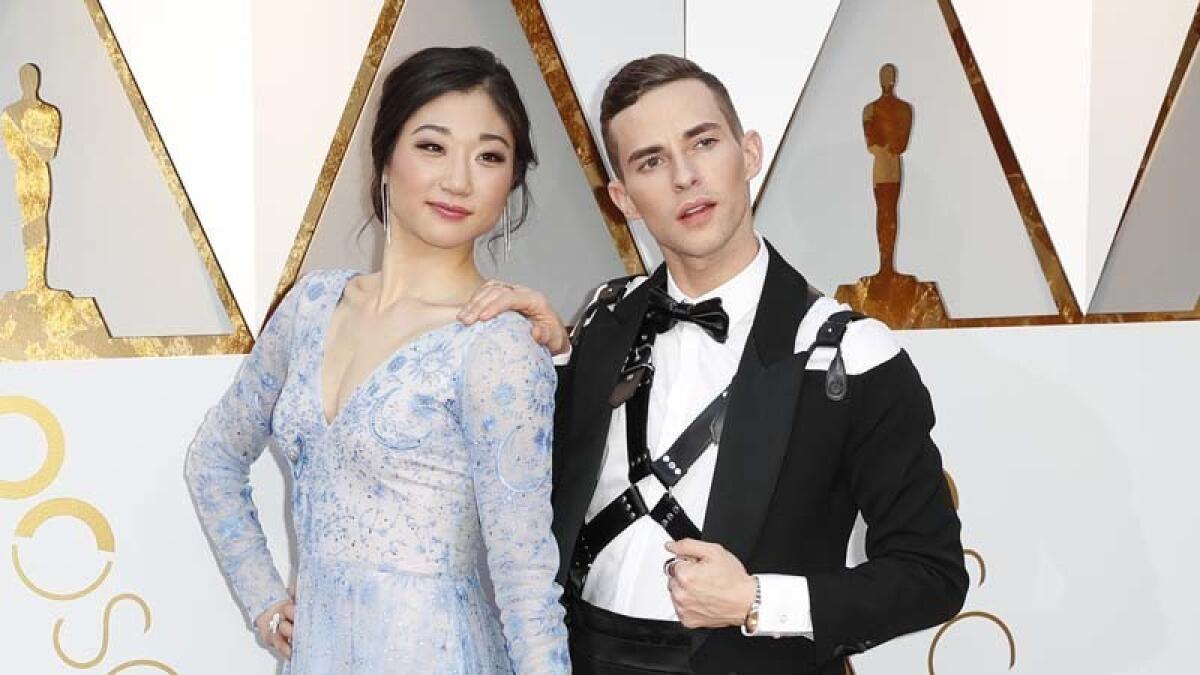
Mingling near the Oscars’ lobby bar, Olympic skaters Mirai Nagasu and Adam Rippon just barely missed a swiftly exiting Margot Robbie as the “I, Tonya” star rushed back into the Dolby Theatre for presenting duties.
The Pyeongchang bronze medalists, who were at the 90th Academy Awards for “Access Hollywood,” were of course rooting for Robbie, who portrayed Tonya Harding in the biopic.
“We’re having a great time!” said Rippon, whose harness-couture evening wear was the eye-catching talk of the red carpet.
At least a few of their faves already collected gold statuettes.
“I was really rooting for ‘Coco’ and also Allison Janney,” Nagasu said with a smile. “We feel like we’ve been rooting for all the right people.”
What did the Olympians think of “I,Tonya”?
“We loved it,” Rippon raved. “We thought it was awesome.”
Nagasu said she “wasn’t born during ‘I, Tonya’ times.”
“I didn’t really know what Tonya was feeling, and looking at it from her perspective as well was really enjoyable,” she added.
Last month Nagasu hit a milestone reminiscent of the real Harding, becoming the first American female skater to land a triple axel at the Olympics.
The next goal on Rippon and Nagasu’s Oscar night agenda? A face-to-face meeting with Robbie.
- Share via
Allison Janney’s next move after her Oscar win? Back to ‘Mom’ tomorrow morning
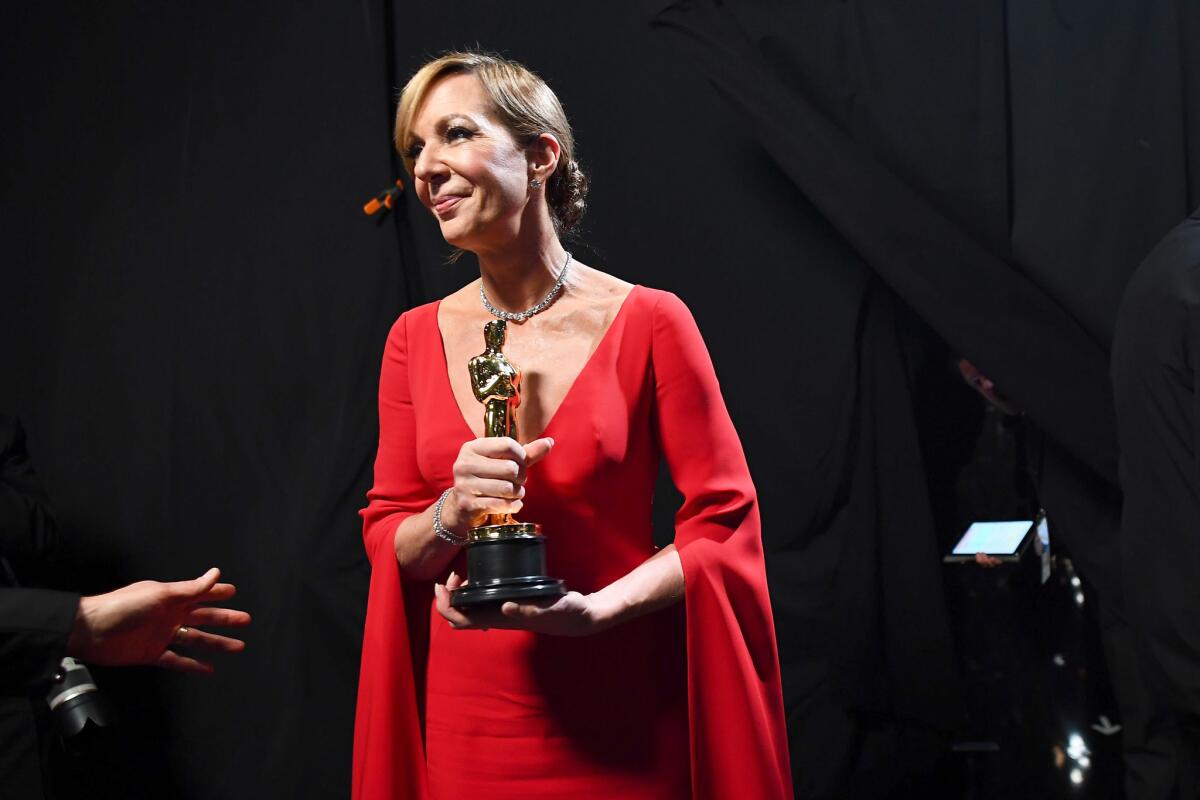
Allison Janney is a Hollywood veteran whose career began in 1993 with a role on daytime TV’s “Guiding Light.” And now, she’s an Oscar winner after taking home the Academy Award for supporting actress Sunday night for her role in “I, Tonya.”
“I didn’t dare to dream of things like this because I didn’t want to be disappointed,” she said, adding that at one point she “had given up” because she wasn’t getting the roles that would allow her to flex her acting muscles.
“But [‘I, Tonya’ writer] Steven Rogers did [that] for me, [which allowed me] to show a different side of me and show what I could do,” she continued. “It’s an extraordinary gift he’s given to me. I think I’m going to get him a Rolex and engrave it on the back.”
Still, she’s not going to allow the Oscar win to alter her work ethic in any way.
“I have to be at a table read for ‘Mom’ at 10 a.m. tomorrow morning so I’m going right back to work,” she said, referencing the CBS sitcom in which she stars. “I’m happy to have a job after something like this because it can go to your head…. I’m going to have a big crash-down after this so I’m happy to have the folks of ‘Mom’ to lift me up.”
- Share via
Watch Frances McDormand’s rousing speech that just fired up the Oscars

Frances McDormand wins the 2018 Academy Award for actress in a leading role for “Three Billboards Outside Ebbing, Missouri.”
Chances are you’ll be hearing about Frances McDormand’s triumphant Oscars acceptance speech for actress in a leading role Sunday night for her performance in “Three Billboards Outside Ebbing, Missouri.” And for good reason. Here’s what she said:
“OK, so I’m hyperventilating a little bit. If I fall over, pick me up cause I’ve got some things to say. I think this is what [Olympic gold medalist] Chloe Kim must have felt like after doing back-to-back 1080s in the Olympic halfpipe. Did you see that? OK, that’s what it feels like.
I want to thank Martin McDonagh [who created ‘Three Billboards Outside Ebbing, Missouri’] — look what you did. We are a bunch of hooligans and anarchists, but we do clean up nice.
I want to thank every single person in this building and my sister Dorothy. I love you, Dot. I especially want to thank my clan, [husband] Joel Coen and [son] Pedro McDormand Coen.
These two stalwart individuals were well-raised by their feminist mothers. They value themselves, each other and those around them. I know you are proud of me, and that fills me with everlasting joy.
And now I want to get some perspective. If I may be so honored to have all the female nominees in every category stand with me in this room tonight: the actors — Meryl, if you do it, everybody else will, c’mon! — the filmmakers, the producers, the directors, the writers, the cinematographers, the composers, the songwriters, the designers.
OK, look around, everybody. Look around, ladies and gentlemen, because we all have stories to tell and projects we need financed. Don’t talk to us about it at the parties tonight. Invite us into your office in a couple days, or you can come to ours, whatever suits you best, and we’ll tell you all about them. I have two words to leave with you tonight, ladies and gentlemen: inclusion rider.”
And for what it’s worth, Olympian Chloe Kim obviously appreciated the shout-out in McDormand’s speech.
- Share via
‘I’m shedding scales!’ Sally Hawkins’ tears of joy turn to sequins after ‘Shape of Water’s’ Oscar win
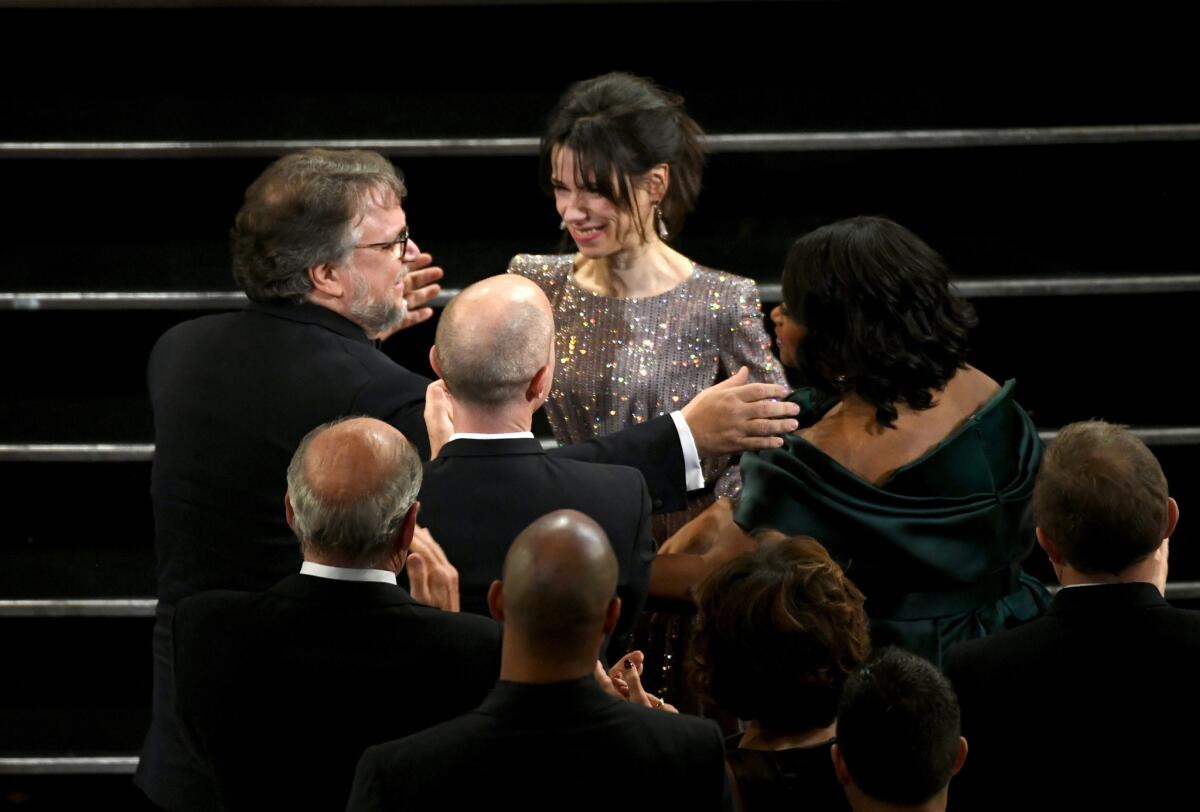
After the 90th Academy Awards broadcast wrapped, “The Shape of Water” crew reveled under the glittering awards set. Sally Hawkins, wiping tears out of her eyes, looked down at her dress and realized she had left a pool of sequins to her right.
She laughed and said, “I’m shedding scales!”
- Share via
Oscar-winning ‘Coco’ songwriters on learning to appreciate the Day of the Dead and paying tribute to mom
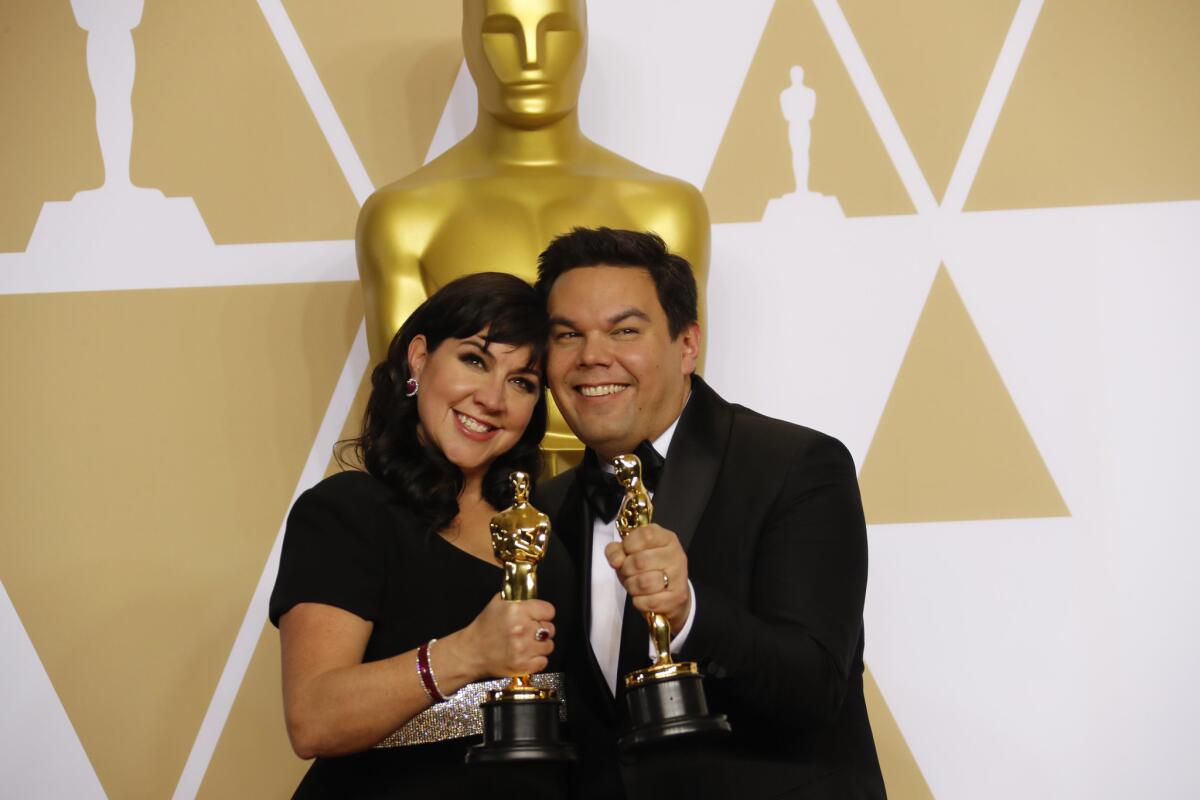
After the husband-and-wife songwriting team of Robert Lopez and Kristen Anderson-Lopez took home an Oscar on Sunday for the song “Remember Me” from “Coco,” their thank-yous in the backstage press room fittingly included a beloved family member who recently died.
“Coco” centers on the practice of mourning the departed through the Mexican holiday of Day of the Dead. That tradition proved healing to Robert Lopez after his mother died in August and his family honored her in early November, when the Day of the Dead honors lost loved ones.
“She was the main force in my childhood who encouraged me to play piano and write music, and go for my dream,” Robert Lopez said in the press room.
“She told him if he didn’t practice she would make him eat the piano,” Kristen Anderson-Lopez said.
“Remember Me” is a song about leaving people you love, Robert said. “We sang it at the funeral, and it was very important in helping me in heal.”
From now on, the couple’s family will celebrate Day of the Dead like Christmas and Halloween, Kristen said. “Because loss is inevitable. … I want to pass that tradition on to our daughters.”
The pair did not dare dream of another Oscar win after nabbing their first for the epic ballad “Let It Go” from the 2014 animated feature “Frozen.” The timing of this win, however, was serendipitous, since they just wrapped up the first week of previews for stage adaptation of “Frozen” at the St. James Theatre on Broadway. The musical includes new songs by the couple.
The Lopezes talked about the importance of “Coco” to the Spanish-speaking world. Robert lamented that even though his family immigrated from the Philippines — his father was born on a boat on the way from Manila — he never learned Spanish himself.
“It’s one of the great regrets of my life,” he said, concluding, “I’ve always felt ‘other’ even though I was assimilated. … I want to encourage every brown kid to pursue their dream just like my mom did.”
- Share via
What’s an inclusion rider? Frances McDormand mystifies at the Oscars

Frances McDormand wins the 2018 Academy Award for actress in a leading role for “Three Billboards Outside Ebbing, Missouri.”
To conclude her powerful speech at the Oscars, Frances McDormand invoked two words: “inclusion rider.”
But what is an inclusion rider, exactly?
In a 2016 TED Talk, Annenberg Inclusion Initiative founder and director Stacy Smith explained the advantages of actors including such a rider in their contracts.
Smith, an associate professor at USC’s School of Communication, said that a typical film features around 45 speaking roles and that there’s no reason that the cast, outside of the leads, shouldn’t reflect the demography of the film’s location.
“An equity rider by an A-lister in their contract can stipulate that those roles reflect the world in which we actually live,” Smith said. “Now, there’s no reason why a network, a studio or a production company cannot adopt the same contractual language in their negotiation processes.”
McDormand’s words sparked enough interest that the Annenberg Inclusion Initiative tweeted a brief explanation after her remarks.
“For those of you asking about the #InclusionRider, it’s designed to ensure equitable hiring in supportive roles for women, POC, the LGBT community, & people w/disabilities.”
You heard McDormand, Hollywood: Get those inclusion riders and make films reflect reality.
Watch the whole of Smith’s TED Talk here.
- Share via
Backstage with Faye Dunaway, Warren Beatty and this year’s PwC accountant before Oscars best picture redo
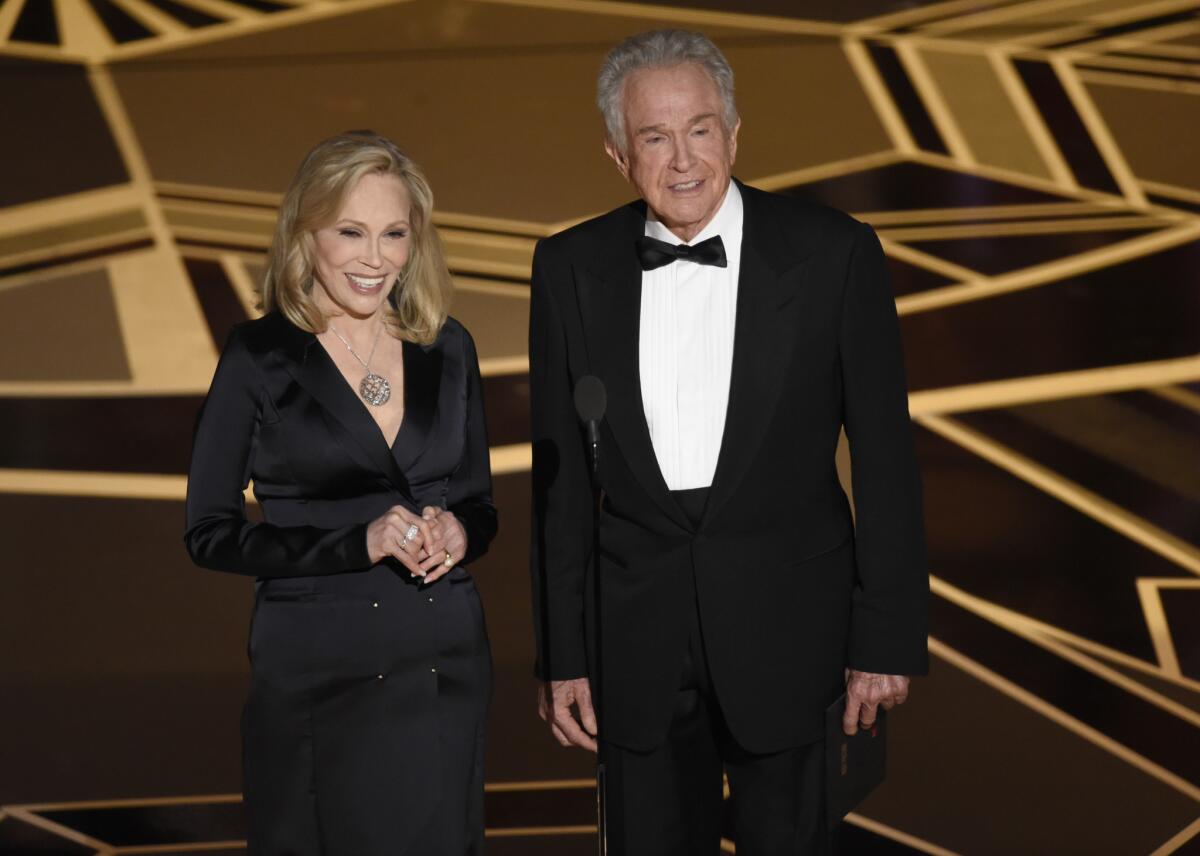
Warren Beatty and Faye Dunaway were waiting in the wings backstage at the Oscars, and Dunaway seemed nervous.
She noticed a camera snapping photos in her direction and became distressed. Even though the photographer said he was not taking her pictures, she shooed him away.
“Can you walk away? I don’t want cameras. I don’t want anyone near me. What can we do about all these cameras?”
She paced in the wings while she read her lines. This year, there would be no Oscar snafu.
She paused to watch the actress reel and exclaimed excitedly when Laurie Metcalf popped up on screen.
“I love her. She was amazing in ‘Doll’s House, Part 2,’”
she said, referencing Metcalf’s Tony-winning performance on Broadway.
Once Beatty and Dunaway took the stage and began their presentation, one of the PwC accountants who replaced last year’s wrong-envelope accountants watched the monitor closely as “Shape of Water” was announced, shaking her head in the affirmative.
“Awesome, awesome show,” the stage manager said, embracing her as she let out a huge sigh of relief.
- Share via
Yes, Tiffany Haddish swapped her Jimmy Choo stilettos for Uggs
At the Oscars, rising star Tiffany Haddish pulled off what many Angelenos do in the privacy of their own home.
In front of millions of viewers, the breakout star of “Girls Trip” swapped her shimmery Jimmy Choo stilettos for comfy Ugg slippers. For her funny skit onstage with Maya Rudolph, the 38-year-old comedian slid her tired feet into a suede and shearling style called the Coquette.
It was the second wardrobe change Haddish made that evening. She arrived at the 90th Academy Awards at the Dolby Theatre in a traditional Eritrean dress as a tribute to her late father who came from the African nation. Before she cut up the audience with Rudolph, she switched into a white Alexander McQueen gown that she first wore at the premiere for “Girls Trip” last July and then repeated when she hosted “Saturday Night Live” the following November.
After all, the form-fitting dress with a bejeweled collar and a high side slit cost $4,000 of her hard-earned money. As she stated in her “SNL” monologue: “I feel like I should be able to wear what I want, when I want, however many times I want, as long as I Febreze it.”
- Share via
Team behind Oscar-winning ‘Coco’ on the importance of representation
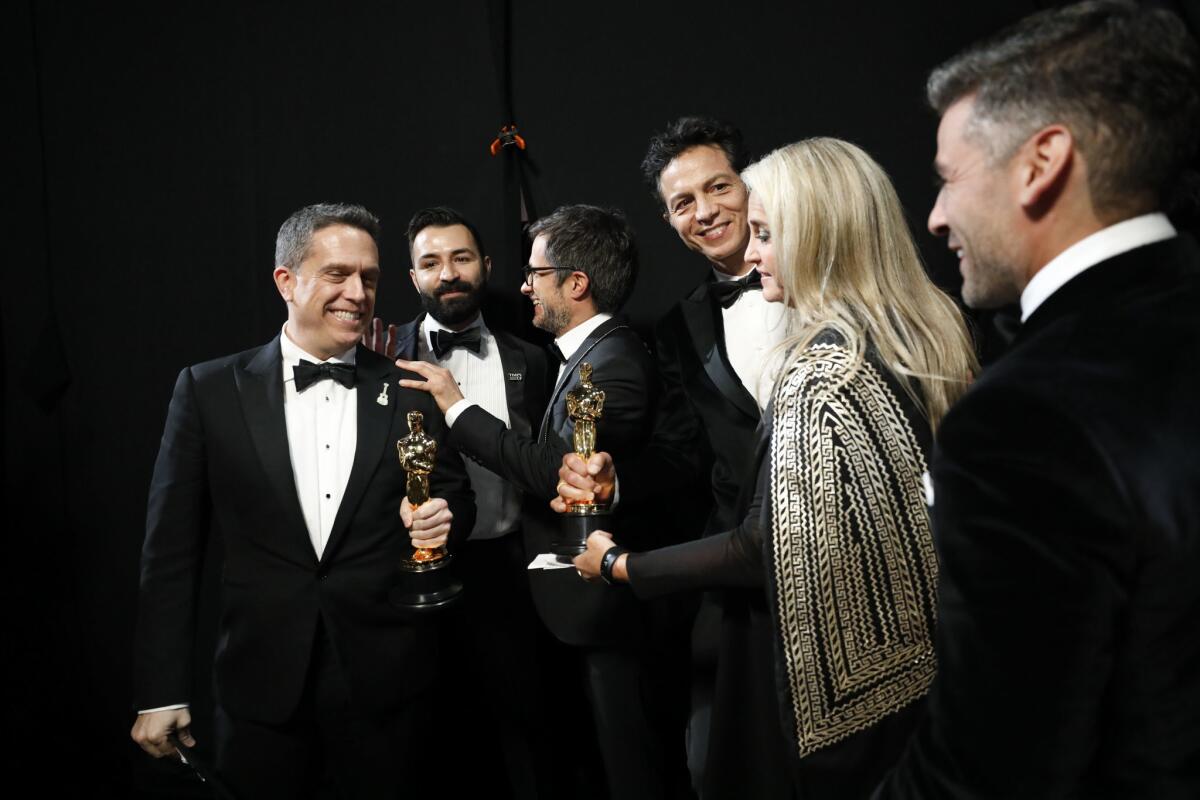
Representation was a major point of conversation in the press room after “Coco” won the award for animated feature at the 90th Academy Awards on Sunday night. Directors Lee Unkrich and Adrian Molina and producer Darla K. Anderson fielded questions and compliments about the film’s inclusivity and diversity.
“It takes an awareness of the fact that strong storytellers come from all sorts of places,” said Molina. “At Pixar… we work very hard to show that films about communities of color, films that come from particular places, have resonance that can reach across the world. We’ve seen that with ‘Coco,’ we’ve seen that with ‘Black Panther,’ and I think you’re going to see it with a lot of other films in the future.”
Molina was also asked about his Mexican heritage and what it meant to him to help bring a story about his own culture to the big screen.
“Of all of the people at Pixar who, when they heard that me and Darla would be making a film about Mexico and Dia de los Muertos, I was one of the people who said, ‘I need to work on that film,’” he said. “So much of my experience growing up, so much of the pride coming from family and a place that is proud of who they are… to have this opportunity to reflect all of those experiences with a wonderful team at Pixar, was something that I knew if not now, than when?”
When the filmmakers started making “Coco” six years ago, “It was a very different political climate, of course, than it is now,” said Lee.
“While we were making the film, we had a change in presidency and a lot of things started to be said about Mexico and about Mexican Americans that was unacceptable,” he added. “And while we were making the film, we began to feel a new urgency to get the movie out into the world. To get a positive message about the beauty of Mexico, the beauty of the Mexican people, the beauty of their culture and traditions into the world and also to give Mexican American kids something to look up to, something to aspire to, to see a bit of themselves up on-screen.”
The importance of a film like “Coco” was not lost on Lee, who aimed to keep the story as true to life as possible.
“We tried to make the best film, the most authentic, the most respectful film that we could,” Lee said. “It just means the world to us that the film ended up being the biggest movie of all time in Mexico and that it’s done so well all around the world, including places like China that you wouldn’t expect a film like ‘Coco’ to do well in.”
- Share via
Here’s why Jennifer Lawrence and Jodie Foster presenting an Oscar tonight was a big deal
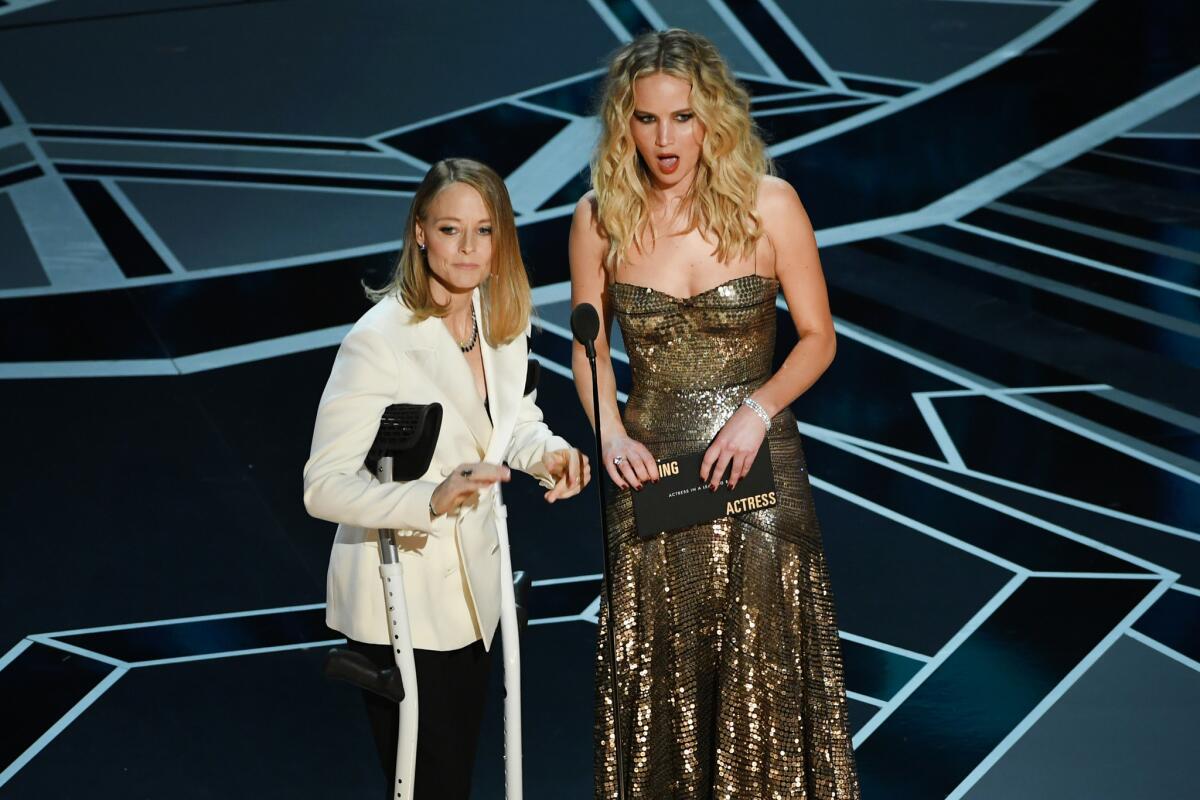
Jennifer Lawrence and Jodie Foster’s appearance at Sunday’s Oscars bucked tradition, but was not totally unexpected.
The Oscar-winning actresses presented the award for lead actress to “Three Billboards Outside Ebbing, Missouri” star Frances McDormand. They ribbed Meryl Streep during their presentation and praised the trailblazing actresses who share the honor with them.
But something was different this time.
Lawrence and Foster stepped in when Casey Affleck withdrew from the show in January in the wake of the #MeToo and Time’s Up movements coursing through Hollywood and beyond. Historically, the lead actress prize is presented by the previous year’s lead actor winner.
“We appreciate the decision to keep the focus on the show and on the great work of this year,” an academy spokesperson said when Affleck bowed out.
Allegations of past misconduct dogged the “Manchester by the Sea” star last awards season as he swept the lead actor honor. In 2010 he settled with two female crew members who sued him after accusing him of sexual misconduct on the set of his directorial effort “I’m Still Here,” which filmed in 2009.
Affleck was also the subject of 2016 lead actress Brie Larson’s silent protest at the 2017 Oscars when she refused to clap for him upon presenting him with his prize.
Foster won lead actress Oscars for “The Accused” (1988) and “The Silence of the Lambs” (1991) and was nominated for two other films. Lawrence won her lead actress Oscar for “Silver Linings Playbook” (2012) and was nominated three other times.
- Share via
Roger Deakins, after winning an Oscar at long last: ‘A big part of me was saying, “please, please, no”’
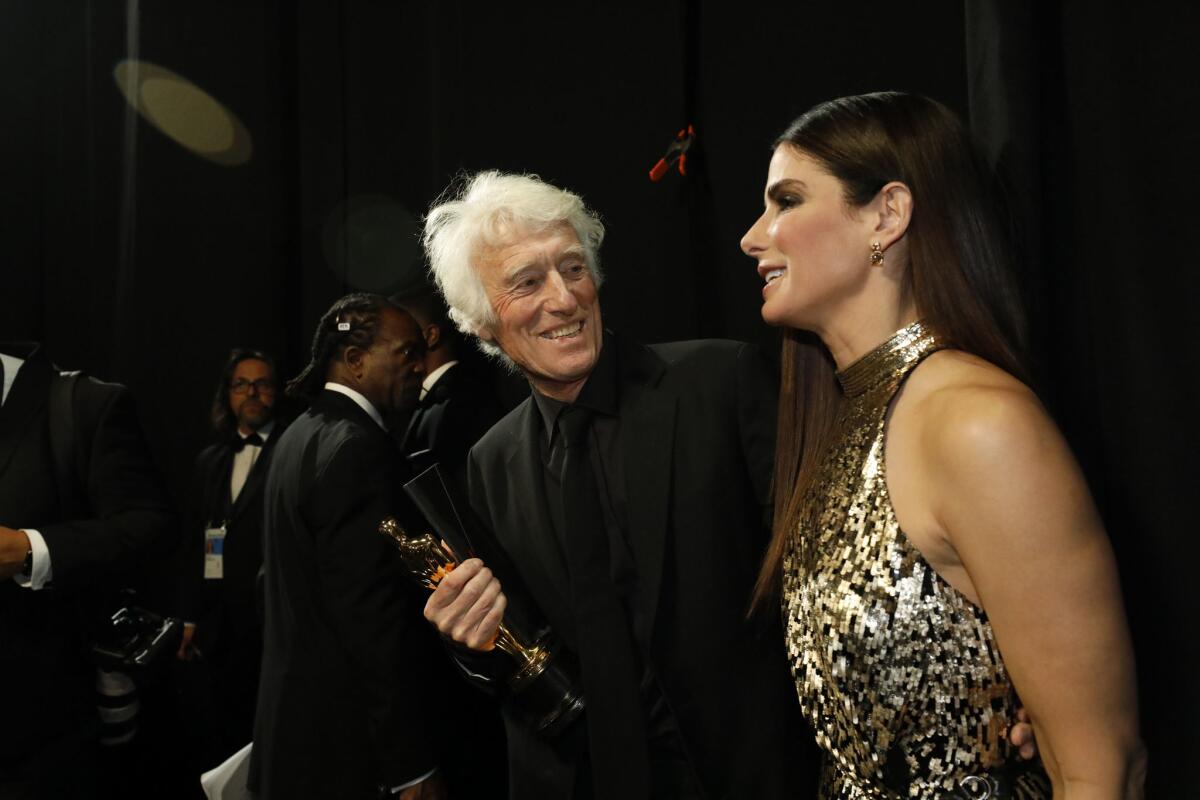
The wait is over for “Blade Runner 2049” cinematographer Roger Deakins, who finally won an Oscar after 14 nominations that go back to 1994’s “The Shawshank Redemption.”
Deakins was unfazed in the press room when a reporter mentioned that he began his career in the era of film stock.
“On the way here, I was just reminded that one of the early films I did was ‘Sid and Nancy’ with Gary Oldman,” he said. “So amazing to be with Gary in the same space. I don’t know, what can I say?”
Deakins also addressed the challenges of creating a sequel to Ridley Scott’s original 1982 neo-noir sci-fi classic.
“It’s all a part of your film memory, but this was very much Denis’ film,” Deakins said, a reference to director Denis Villeneuve. “But when you’re aware of what’s come before, I think what [“Blade Runner” cinematographer] Jordan [Cronenweth] did on that film was stunning, but I’m a different person.”
He also said that after so many years of coming close but not winning the prize, he developed a sense of hesitation.
“A big part of me was saying, ‘please, please, no,’” he said of the prospect of taking the statue. “But it’s great because I’ve worked with a lot of the same people on my crew for years and years, and I feel it’s recognition for their work — I really do — and I know they’re watching in New York and London and Budapest, and I wish I could thank each and every one of them.”
Read Times staff writer Josh Rottenberg’s interview with Hollywood’s master of light.
- Share via
Frances McDormand wins for actress in a leading role

Frances McDormand wins the 2018 Academy Award for actress in a leading role for “Three Billboards Outside Ebbing, Missouri.”
Frances McDormand wins the 2018 Academy Award for actress in a leading role for “Three Billboards Outside Ebbing, Missouri.”
- Share via
‘The Shape of Water’ wins for best picture
“The Shape of Water” wins the 2018 Academy Award for best picture.
- Share via
Keala Settle doesn’t hold back onstage in song or backstage about Jordan Peele at the Oscars
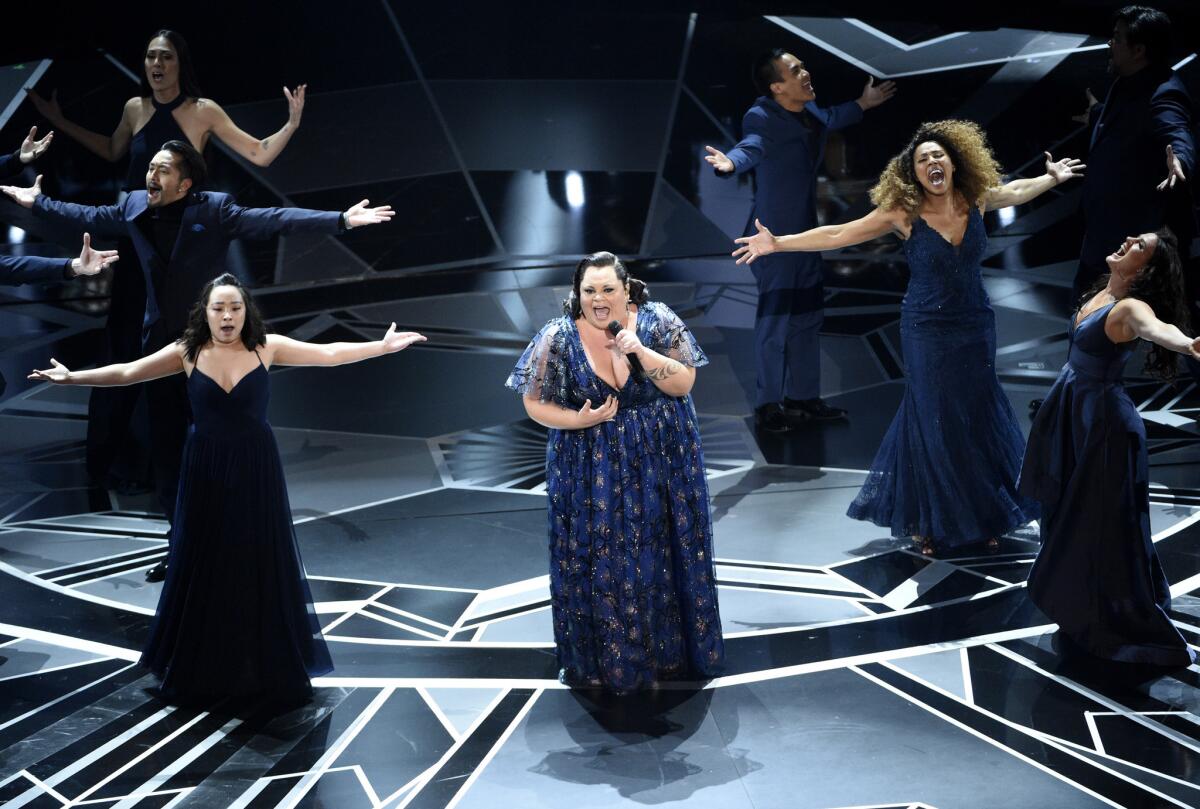
The crowd in the backstage wings erupted when Jordan Peele won his screenwriting award, but it was “The Greatest Showman” star Keala Settle who was most excited for him.
“Yes! Yesssss! Y-y-y-es!” she shouted as he was making his acceptance speech. As he exited the stage, she pumped her fist in his direction. “Bro! BROOOO!”
After bringing down the house with a performance of the nominated song “This Is Me” from “The Greatest Showman,” she emerged backstage and shouted a phrase we can’t print in this publication, “Yes, … !”
After taking a few moments to catch her breath, she looked at a stagehand. “Um, can I go?”
On her way out, production staffers kept stopping her to congratulate her on her performance.
“Man, you guys are nice!”
- Share via
We’re with Sofia Coppola. Red-carpet fashion could use some more personality

We’re with director Sofia Coppola, who recently wrote an essay for W magazine lamenting the sterile perfection on the red carpet.
“I miss the days before actresses hired stylists, when women dressed themselves for formal events,” Coppola said. “There was personality, style — and mistakes.”
No doubt minutes after the best picture Oscar is awarded this year, it will be hard to remember who wore what — and perhaps worse, you won’t care that you can’t recall.
However, if you need a real reminder, check out our best/worst gallery of red-carpet looks from the 90th Academy Awards.
- Share via
Gary Oldman wins for best leading actor
Gary Oldman wins the 2018 Academy Award for actor in a leading role for “Darkest Hour.”
- Share via
89-year-old James Ivory on his long-awaited first Oscar win: ‘It feels good... It’s mine.’
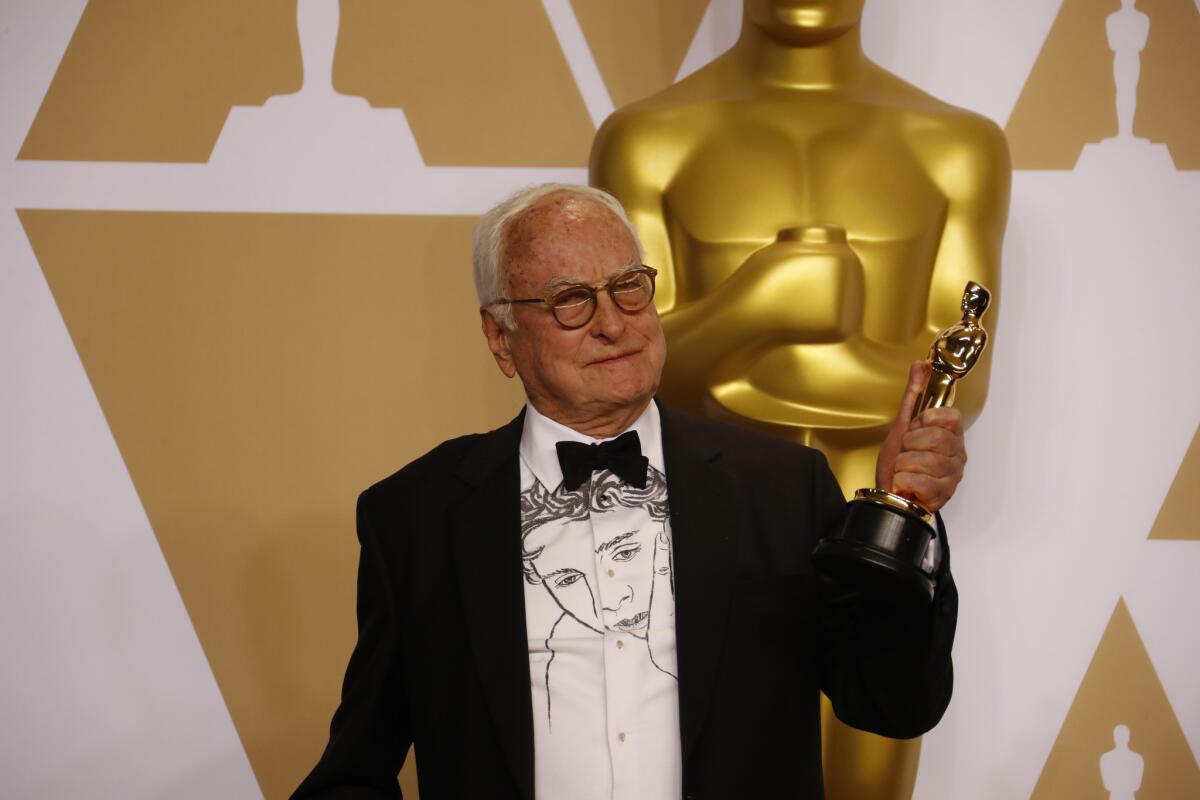
With James Ivory’s win for best adapted screenplay for “Call Me by Your Name,” he became the oldest person ever to take home the golden Oscars statue. And he’s taking the honor in stride.
“Ninety years for anything you do is extraordinary,” he said, about the age he’s turning in June. “Having won the Oscar at that age seems like a hiccup in nature. It feels good to be holding onto that Oscar. It’s mine.”
Ivory’s win is something of a marvel, considering the industry veteran has never taken home one before. With a career spanning more than six decades, he has done more than direct, and sometimes write, great films; he helped shape American cinema. From the mid-’80s until the mid-’90s, the films of Merchant Ivory Productions, which he led with his late life partner, Ismail Merchant, and their late longtime writing collaborator Ruth Prawer Jhabvala, were such a dominant force at the box office and during awards season that “Merchant Ivory” became a genre unto itself.
Ivory directed almost all of them, and although “A Room With a View,” “Maurice,” “Howards End” and “Remains of the Day,” among others, nabbed countless Oscar nominations (including three for Ivory) and at least six wins, this year’s writing honor for adapting the gay love story “Call Me by Your Name” is his first.
“I’m glad it was an Oscar for writing,” he said.
- Share via
If you noticed Guillermo del Toro’s pocket square, here’s the story behind it
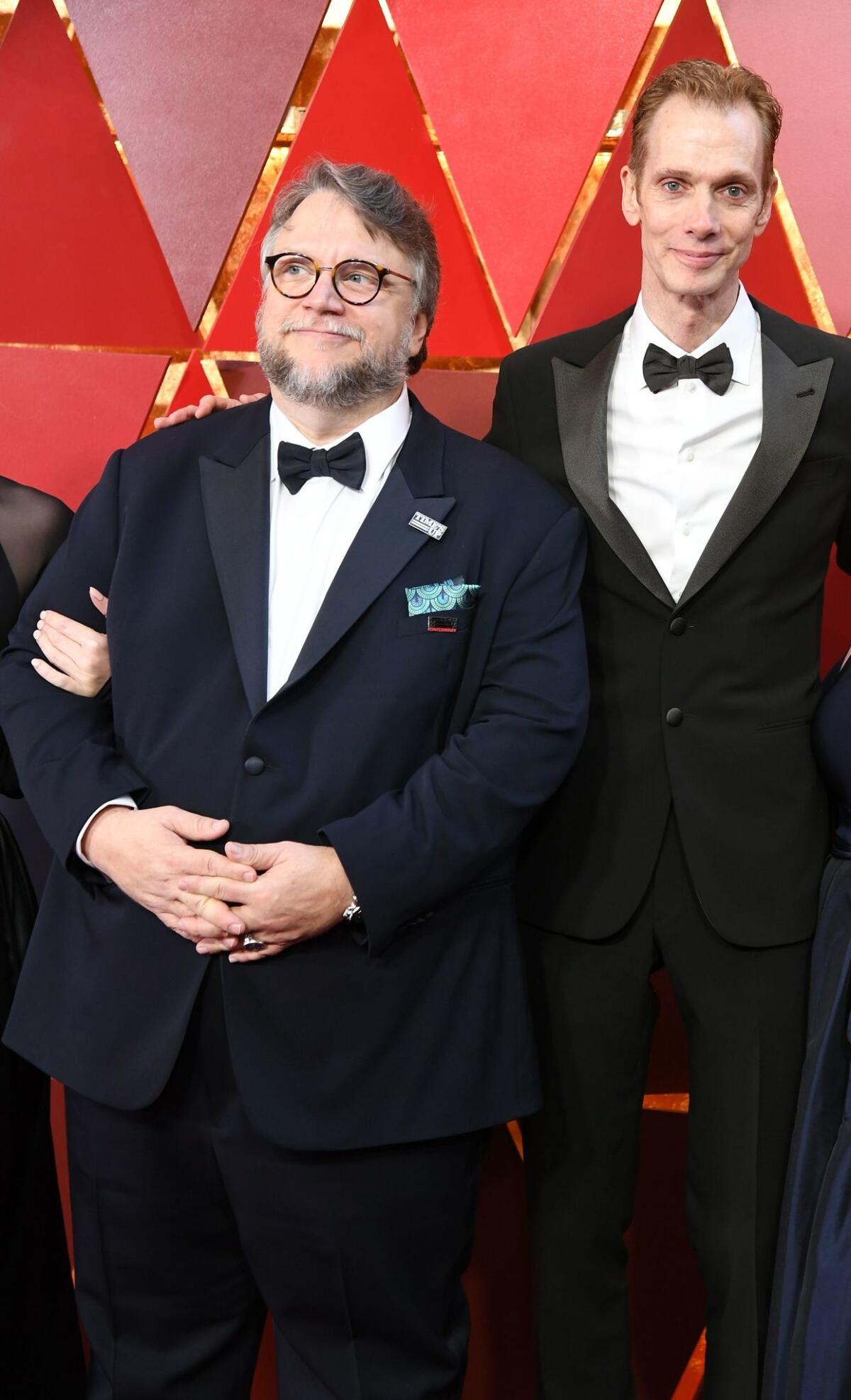
After the Time’s Up pin, the second-most common men’s accessory may have been a particular pocket square worn by many of the male nominees from “The Shape of Water.”
Throughout awards season, the teal silk pocket square has been a signature look for the film’s director Guillermo del Toro, set decorator Shane Vieau and costume designer Luis Sequeira.
Created by production designer Paul Austerberry, the fabric was custom printed with the water-inspired wallpaper pattern that lined the hallway outside Elisa and Giles’ apartments in the film.
- Share via
Guillermo del Toro wins for directing

Guillermo del Toro wins the 2018 Academy Award for directing for “The Shape of Water.”
Guillermo del Toro wins the 2018 Academy Award for directing for “The Shape of Water.”
- Share via
Tiffany Haddish and Maya Rudolph rock the room at the Oscars
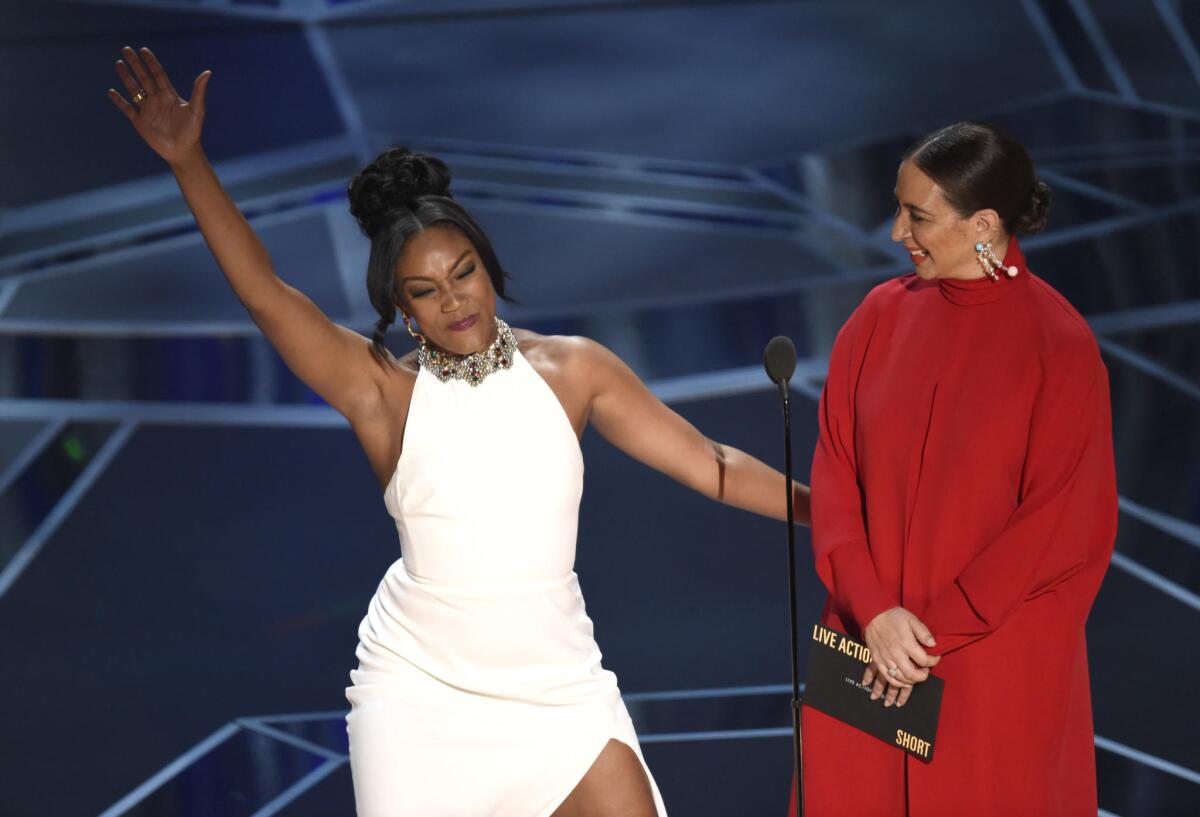
Social media wanted an encore after Tiffany Haddish and Maya Rudolph took the stage to present the short-film Oscars and assure the audience that despite the number of black people onstage, they shouldn’t worry: There were still plenty of white folks to come.
The women might as well have been auditioning together for a buddy movie, starring roles in a TV series or — watch your back, Jimmy Kimmel — the hosting gig at next year’s Academy Awards. Social media was calling for all of that.
Some even suggested Haddish and Rudolph run on the same ticket in 2020.
Here’s just a taste of the response the ladies generated on social media.
And yes, Haddish’s dress should’ve looked familiar. It’s the same one she wore when she hosted “Saturday Night Live” back in November.
Yup, the one she said she was going to wear everywhere.
- Share via
‘Remember Me’ wins for original song
“Remember Me” wins the 2018 Academy Award for original song for “Coco.”
- Share via
Kobe Bryant backstage at the Oscars: Thanks to Oprah and Shonda
After Kobe Bryant won an Oscar for best animated short, the former NBA champion took a question backstage in the press room about his “sheroes” by naming two Hollywood powers: Oprah Winfrey and Shonda Rhimes.
“The first person I called was Oprah,” Bryant said of his decision to start his own studio, adding that Winfrey has long been a mentor and that she spent over an hour with him on the phone, going into great detail about how she built her studio, Harpo.
Rhimes invited him to visit her production company, Shondaland, Bryant said.
“Shonda Rhimes is absolutely amazing,” he said, adding, “when you have mentors like that in your life, you get to learn from the best of the best.”
The scene backstage made for an interesting moment in the #metoo era, as social media was awash in consternation about the win for Bryant, accused of rape in 2004. That case was settled out of court in 2005.
None of this, however, was mentioned when Bryant took questions in the press room, where he appeared thrilled and breathless and was greeted with loud applause.
“It feels better than winning a championship, to be honest,” Bryant said. “As a kid I grew up dreaming of winning a championship, but to have something like this coming out of left field … people asked, ‘What do you want to do when you retire?’ and I said, ‘writer.’ And they were like, ‘That’s cute,’ but to be here right now, to have a sense of validation — it’s crazy, man.”
What’s the difference between playing basketball and writing for film?
“Playing basketball, the hardest thing to do is get out of the way of yourself,” he said. “As a writer you have to get in a deeper connection with yourself, to understand your fears beneath the surface, to communicate with them.”
Asked if he struggled working to establish himself in a new field, Bryant was sanguine.
“I’ve been hard at work for the last two years focusing on novels, writing a series of books that we’re looking forward to bringing those to the market,” he said. “When you start over you have to quiet the ego — begin again. My advice to athletes first and foremost is to do the thing that you love to do. I wake up in the morning and I can’t wait to go to the studio.”
The film’s score was by the inimitable John Williams, and Bryant was awed by the experience of working with the film legend.
Williams told Bryant that each key has its own soul.
“He’s a real Obi-Wan Kenobi,” Bryant said. “He was so energized he nearly knocked me over.”
- Share via
Something up their sleeve? More standout looks from the Oscars
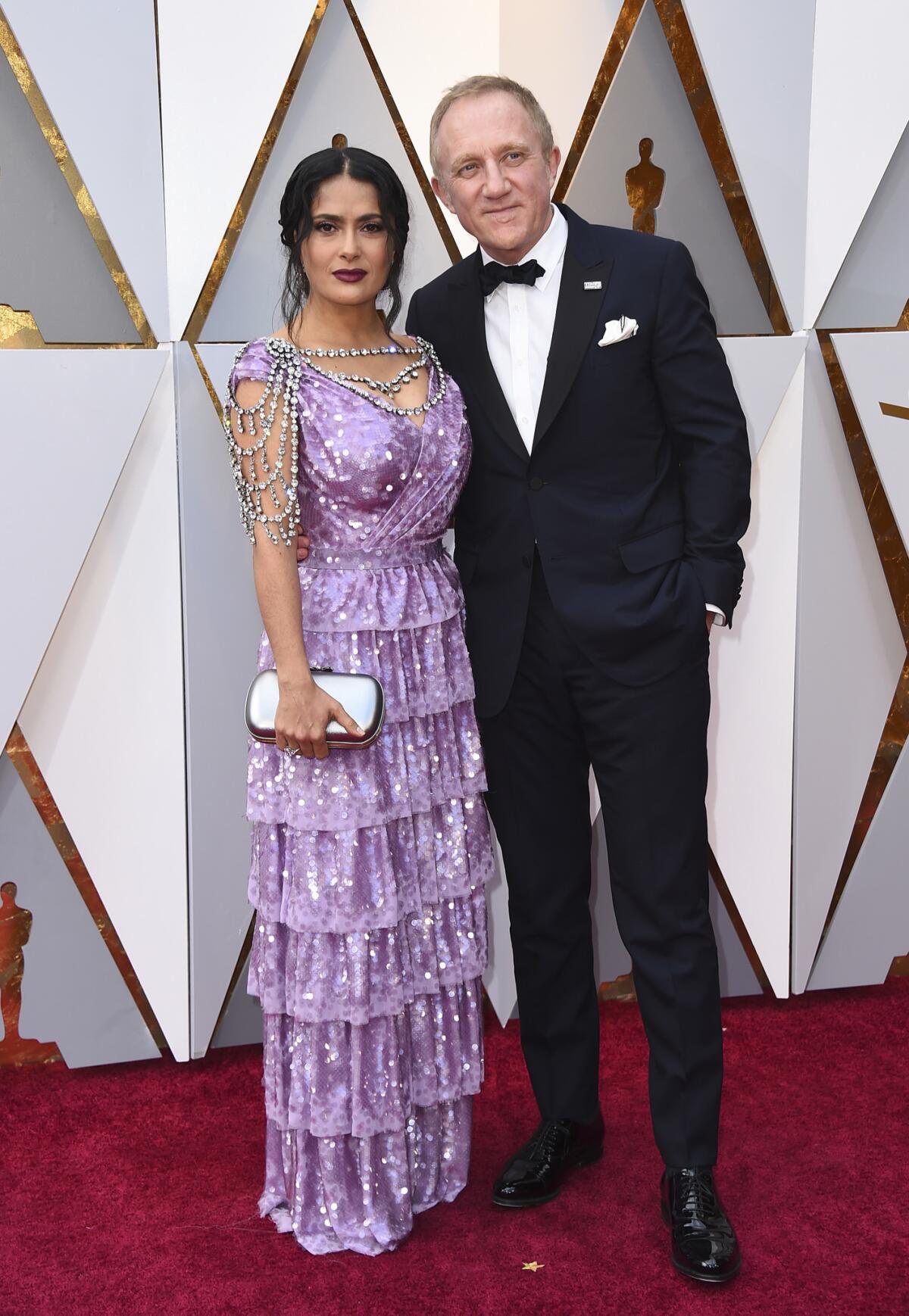
With slit sleeves cascading to the floor, Allison Janney swept along the Oscar red carpet in a vivid red Reem Acra gown that captured a growing trend — interesting sleeves.
Notable sleeve details provided a bit of cover to otherwise-bare shoulders or plain gowns.
On the simple side: Laura Dern’s sheath with a capelet sleeve by Calvin Klein by Appointment and Mary J. Blige’s white Atelier Versace gown with an asymmetric sleeve detail.
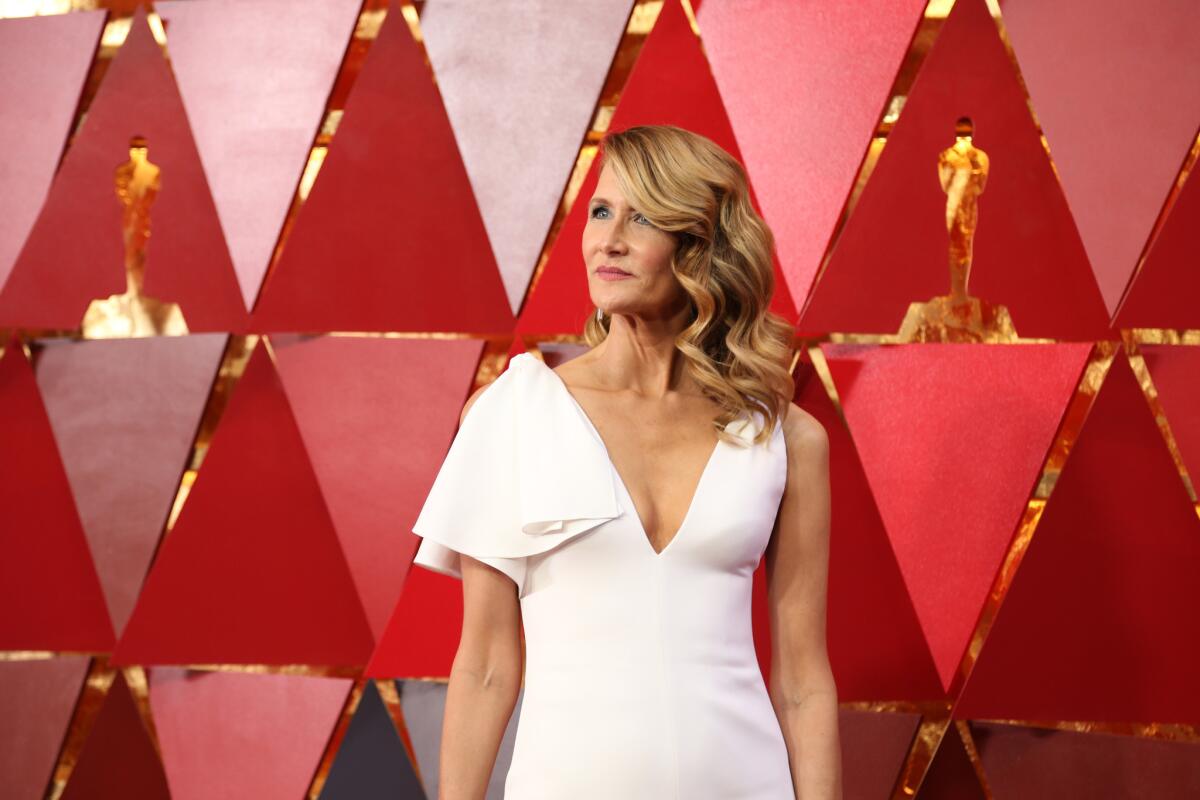
Salma Hayek Pinault took the look to the max in a love-it-or-hate-it Gucci laden with heavy swags of crystals draped along her chest and shoulders.
- Share via
Alexandre Desplat wins for original score
Alexandre Desplat wins the 2018 Academy Award for original score for “The Shape of Water.”
- Share via
‘Star Wars’ has not won an Oscar since 1981
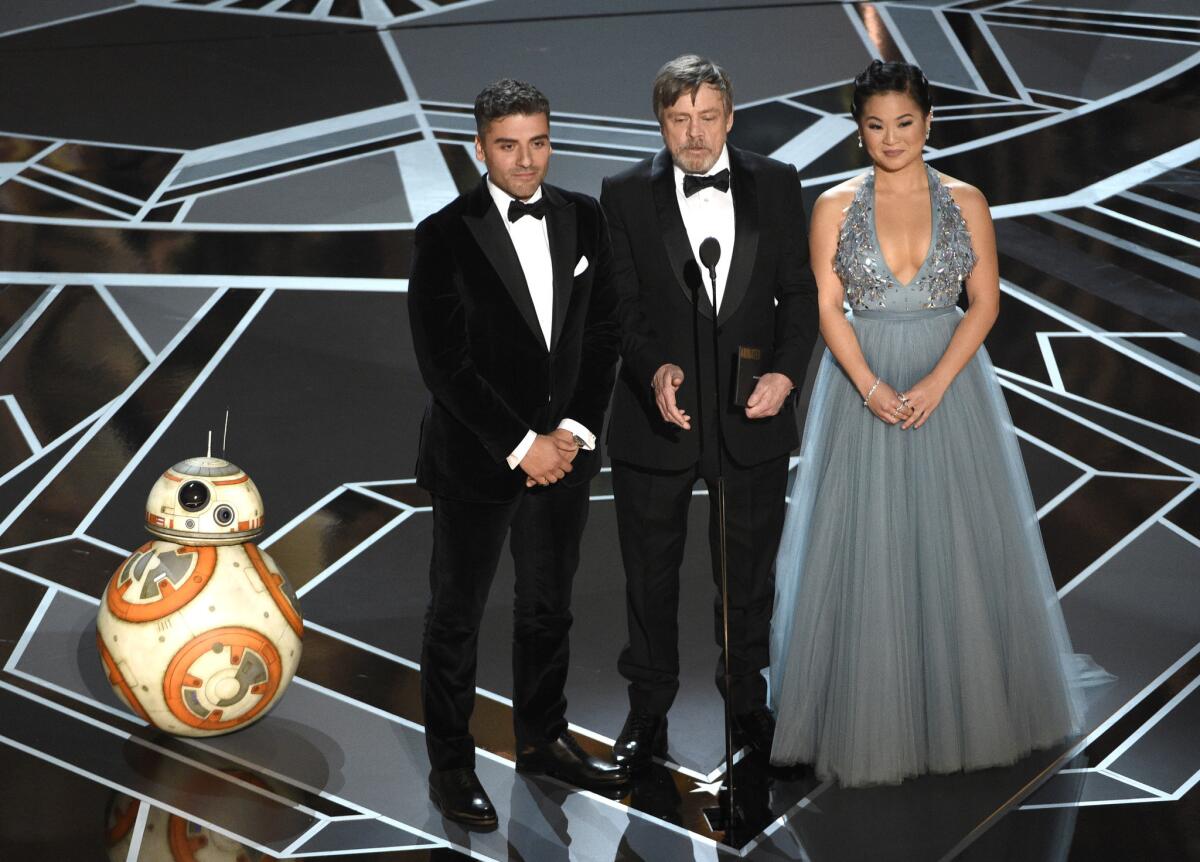
Mark Hamill, Kelly Marie Tran, Oscar Isaac and BB-8 took the stage at the 2018 Oscars to present the awards for animated short and animated feature.
But their film, “Star Wars: The Last Jedi,” ended the night winless, extending the franchise’s Oscars drought.
It’s been 40 years since George Lucas and his galactic fairy tale made their debut at the Academy Awards, and “Star Wars” has made itself at home in the years since.
But while the franchise has racked up a respectable 33 nominations, spread over nine films (including 2016’s “Rogue One: A Star Wars Story”), the series hasn’t brought an Oscar home since 1981.
The galaxy far, far away had by far its most successful showing at the 1978 ceremony, where “Star Wars: A New Hope” won six categories, including film editing, score and visual effects.
(Fun fact: George Lucas has never won an Oscar for the “Star Wars” franchise. His ex-wife, Marcia Lucas, has won an Oscar for the films, thanks for her part in editing the original film.)
“A New Hope” garnered the most nominations among “Star Wars” films at the Oscars, with 10 nominations. At the 1981 awards, heat for the series was already fading, with “The Empire Strikes Back” earning three nominations but only one win.
“Empire’s” win for best sound is the last Oscar the franchise has earned, special achievement awards notwithstanding.
But Oscar nominations continue to roll in for the “Star Wars” universe. Here’s a look at how nominations break down by picture.
“Star Wars: A New Hope” — 6 wins, 10 nominations
“Star Wars: The Empire Strikes Back” – 1 win, 3 nominations
“Star Wars: Return of the Jedi” – 4 nominations
“Star Wars: The Phantom Menace” — 3 nominations
“Star Wars: Attack of the Clones” — 1 nomination
“Star Wars: Revenge of the Sith” — 1 nomination
“Star Wars: The Force Awakens” — 5 nominations
“Rogue One: A Star Wars Story” — 2 nominations
“Star Wars: The Last Jedi” — 4 nominations
We’ll see how the next “Star Wars” film fares next year.
For more historical Academy Awards moments, check out the Times’ Oscar timeline.
- Share via
Time’s Up has its Oscars moment and touts diversity, inclusion and intersectionality
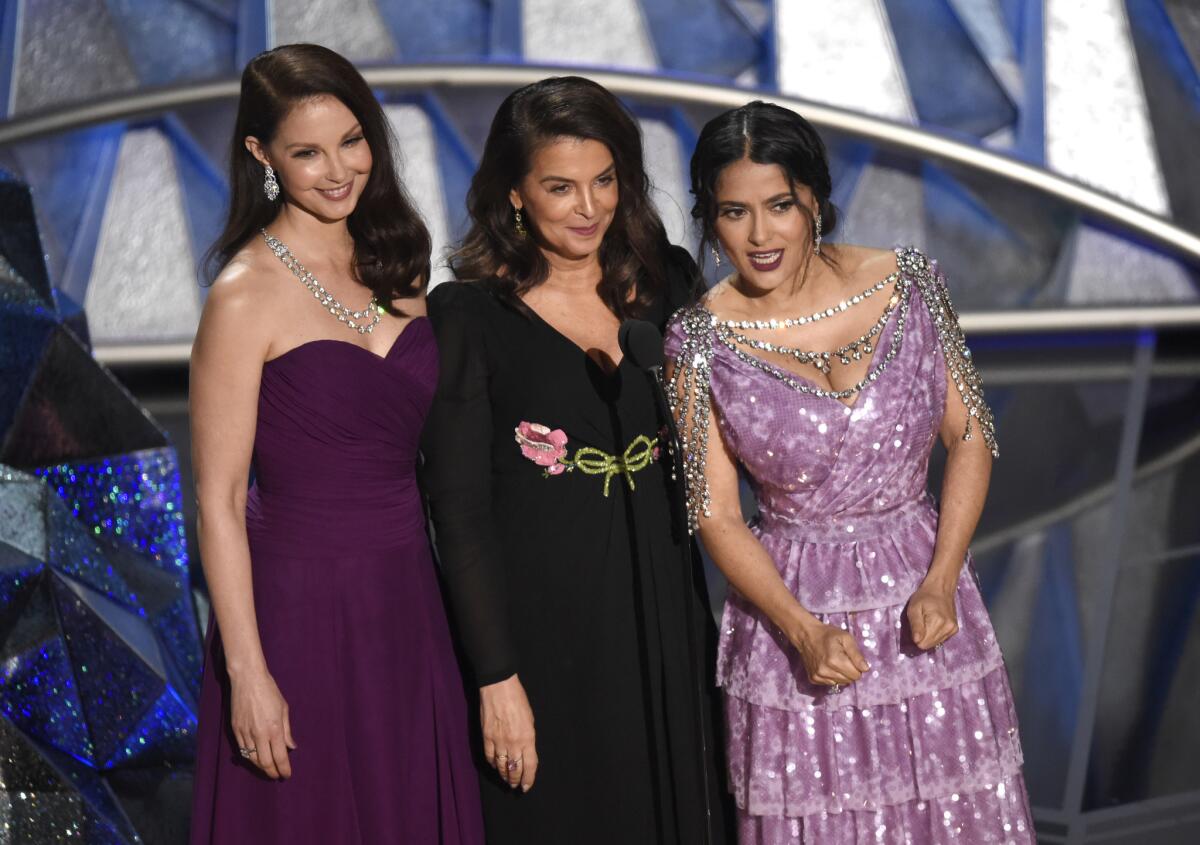
Disgraced producer Harvey Weinstein — a perennial Oscars fixture — wasn’t at Sunday’s Academy Awards but his presence still loomed large.
Host Jimmy Kimmel ribbed the mogul and others sullied by harassment scandals in his opening monologue, and the ceremony was peppered with additional commentary on Time’s Up, diversity and more.
But the most explicit moment addressing the watershed moment came in the form of three Weinstein accusers — Ashley Judd, Anabella Sciorra and Salma Hayek — speaking to the effects ushered in by the producer’s downfall.
The women used the platform to reflect on the changing landscape (which was called into question when Kobe Bryant took home his first Oscar earlier that night) and highlight the academy’s strides toward inclusion and diversity.
“This year, many spoke their truth. The journey ahead is long, but slowly, a new path has emerged,” Sciorra said.
“The changes we’re witnessing are being driven by the powerful sound of new voices, of different voices, of our voices joining together in a mighty chorus that is finally saying time’s up,” Judd added.
The moment was remarkable because all three women were among the scores who brought allegations of sexual misconduct against Weinstein. The former Oscars fixture has kept a low profile since the game-changing reports led to his downfall.
Upon introducing a video package, the women told the audience to look forward to make sure that the next 90 years are filled with “equality, inclusion and intersectionality.”
Here are a few quotes from those featured in the video:
“Everyone is getting a voice to express something that’s been happening forever.” — Mira Sorvino, Oscar winner
“Some of our best work has come from turmoil… Get ready for more ‘Get Outs,’ ‘Black Panthers,’ ‘Wrinkle in Times’ — we’re here and we’re not going anywhere.” — Lee Daniels, two-time Oscar nominee
“Now, straight white dudes can watch movies starring me and relate to that… it’s not that hard! I’ve done it my whole life.” — Kumail Nanjiani, Oscar nominee
“When ‘Thelma and Louise’ came out, everyone said, ‘This changes everything,’ there will be so many more movies starring female characters. That didn’t happen, but this is now that moment.” — Geena Davis, Oscar winner
“There’s nothing to be scared of. It’s just equality.” — Sarah Silverman, comedian
“Seeing ‘Wonder Woman’ and seeing women cry, something clicked — I’ll say it. This is what white men feel all the time. I imagine it’s gonna be the same thing when people go see ‘Black Panther.’” — Barry Jenkins, Oscar winner
“Go make your movie. We need your movie. I need your movie. So go make it.” — Greta Gerwig, Oscar nominee
Times staff writer Amy Kaufman contributed to this report.
- Share via
Roger Deakins wins for cinematography
Roger Deakins wins the 2018 Academy Award for cinematography for “Blade Runner 2049.”
- Share via
Jordan Peele wins for original screenplay

Jordan Peele is the first African American to win a best original screenplay Academy Award.
Jordan Peele wins the 2018 Academy Award for original screenplay for “Get Out.”
- Share via
Armie Hammer had a hot dog cannon at the Oscars and nothing else matters
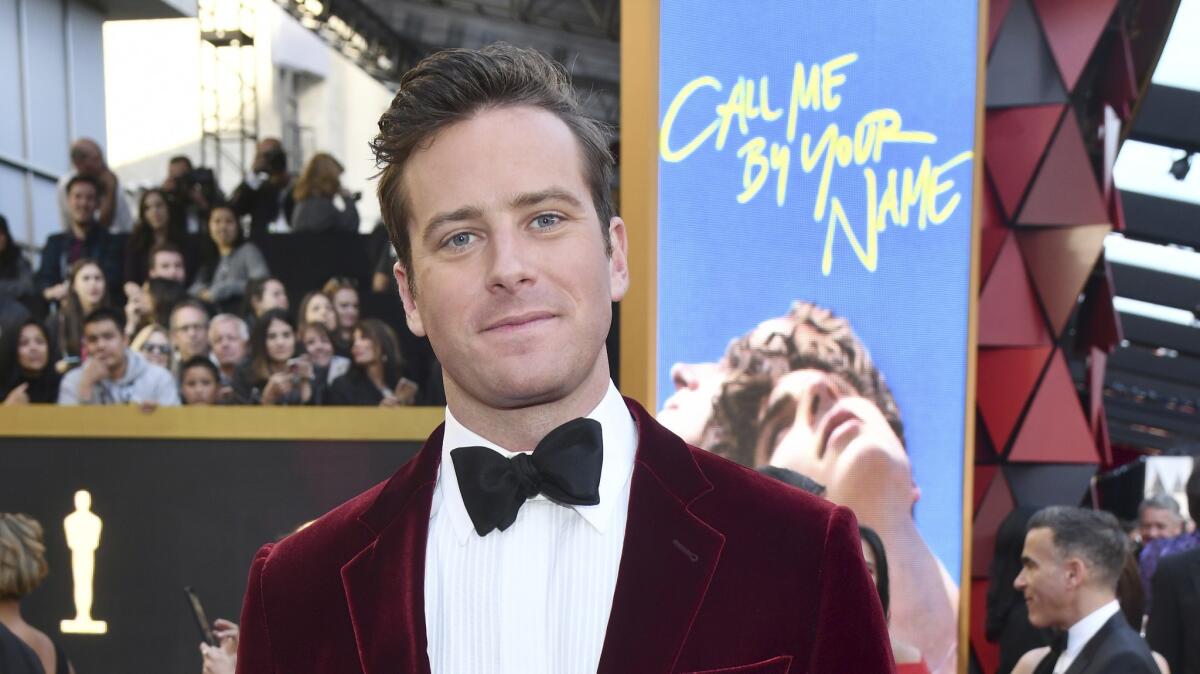
Ever since Ellen DeGeneres staged her fabled Oscar selfie in 2014, each Academy Awards host has been compelled to throw an unpredictable element into their ceremony.
From Ellen’s pizza delivery to Gary from Chicago, the bits land with varying degrees of success, but all that changed Sunday night. Because Jimmy Kimmel gave Armie Hammer a hot dog cannon.
Kimmel took a big bunch of celebrities across the street to surprise a group of strangers watching a screening of “A Wrinkle in Time” with candy and snacks, specifically, hot dogs.
That’s right, hot dog cannons exist and they are magnificent.
Check out the photos below to see the glory for yourself.
- Share via
James Ivory wins for adapted screenplay
James Ivory wins the 2018 Academy Award for adapted screenplay for “Call Me by Your Name.”
- Share via
Women over 50 make a sartorial splash at the 90th Academy Awards
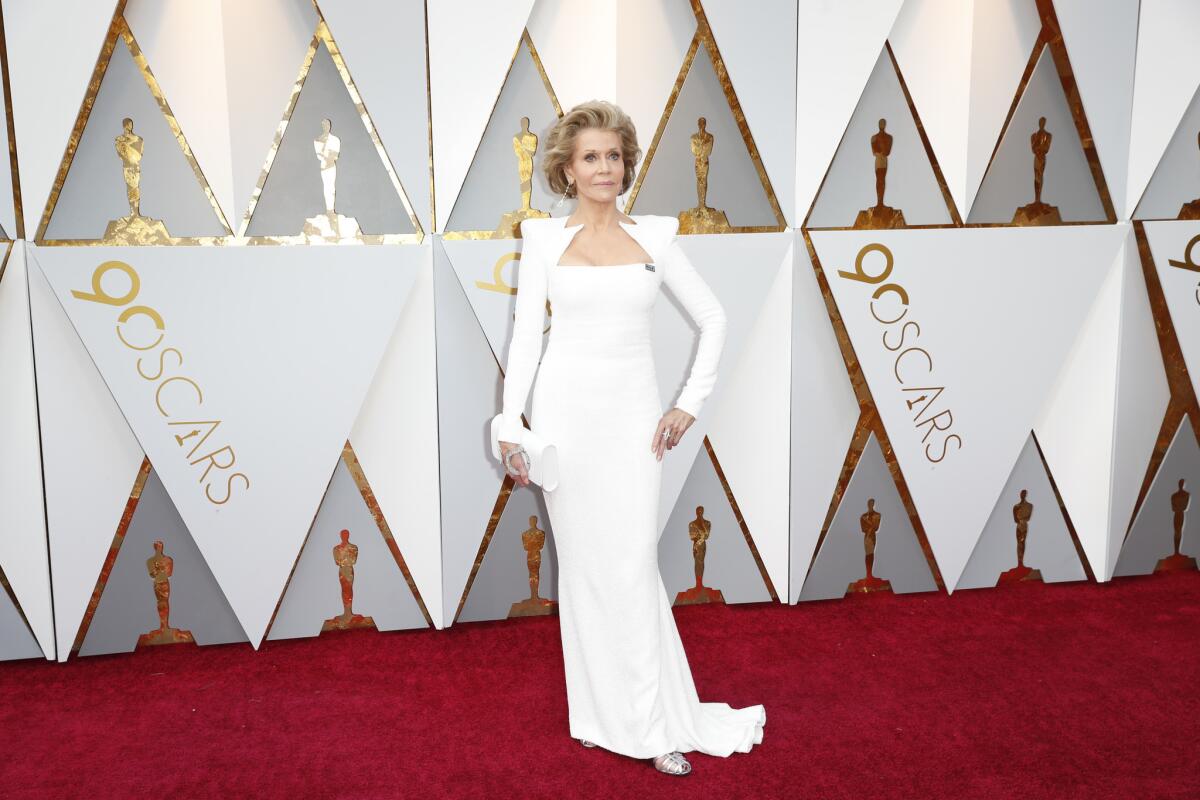
When it comes to defining classic Hollywood glamour, few did it better than the women over age 50 who graced the Oscars red carpet.
As awards shows continue to tilt toward safe, simple silhouettes, women of a certain age have the advantage. When you no longer have to flaunt your body, classic looks become a mature woman’s best friend.
Variations on the simple white sheath brought glamour to Laura Dern, 51, and Jane Fonda, 80. Helen Mirren 72, and Eva Marie Saint, 93, defined elegance in jewel-tone, long-sleeve gowns. Meryl Streep, 68, in a sweeping red gown with a deep-V neckline, showed that décolletage is ageless.
In a move that may stretch the definition of “vintage clothing,” Rita Moreno, 86, the first woman to EGOT— she has an Emmy, Grammy, Oscar and Tony — wore the same dress she wore to accept her 1962 Oscar for “West Side Story.” Is it still vintage if you wore it the first time?
- Share via
Before Tiffany Haddish took the stage with Maya Rudolph ... a foot note
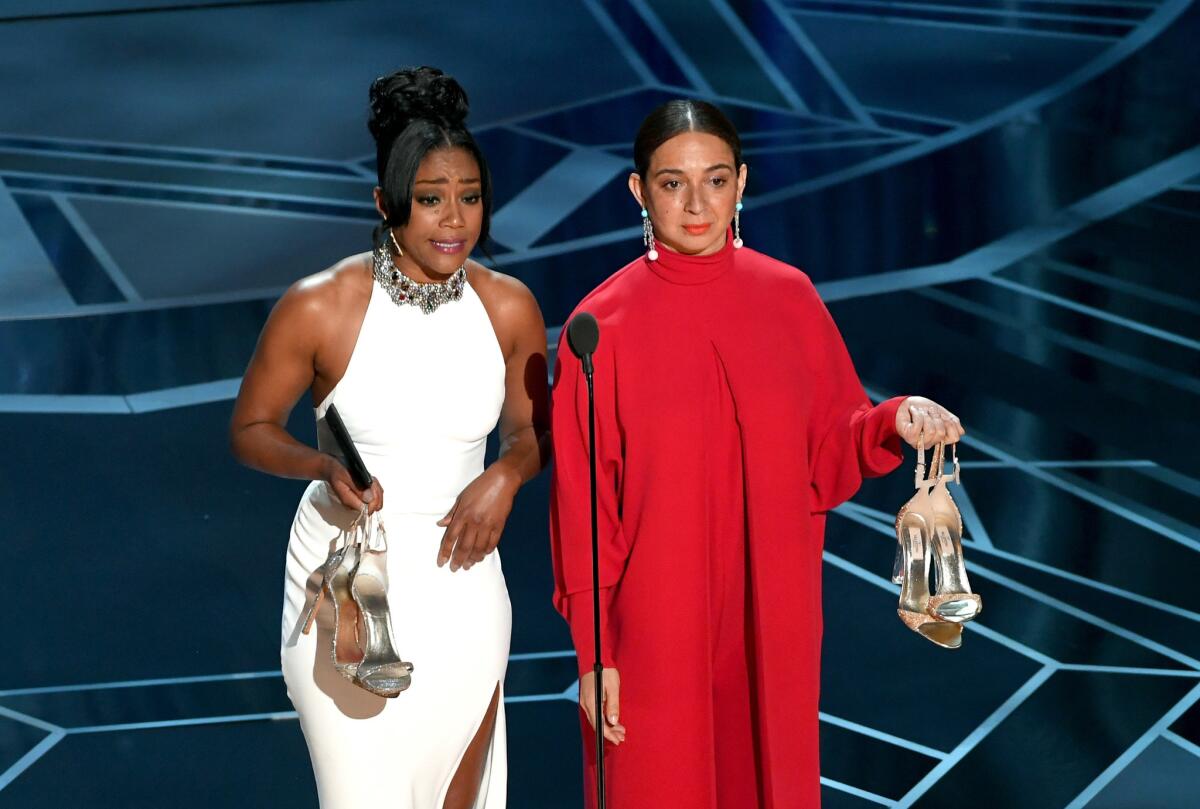
Tiffany Haddish walked backstage clutching a glass of white wine.
“Hold that for me,” she said, looking at this reporter as she put it down on the table. “I’m coming back for that, OK?”
The actress was radiating with excitement before presenting with Maya Rudolph, spontaneously erupting into song. “I’m so excited, and I just can’t hide it!” “No, no, no!”
Rudolph chimed in, making it a duet. Both actresses were walking onstage without their heels for a bit — and Haddish advised the production crew not to zoom in on her feet.
“Then the foot fetish people be like, ‘She got a bunion! I’m all into that corn.’”
After the two came offstage, Haddish returned to retrieve her wine, as promised.
“You didn’t let anybody Bill Cosby it, did you?” she asked. “Good, good, good!”
One more footnote: Yes, if you think you’ve seen Haddish’s Alexander McQueen dress before . . . you have. See below . . .
- Share via
These are the 10 activists Common and Andra Day asked to join them during their Oscars performance of ‘Stand Up for Something’
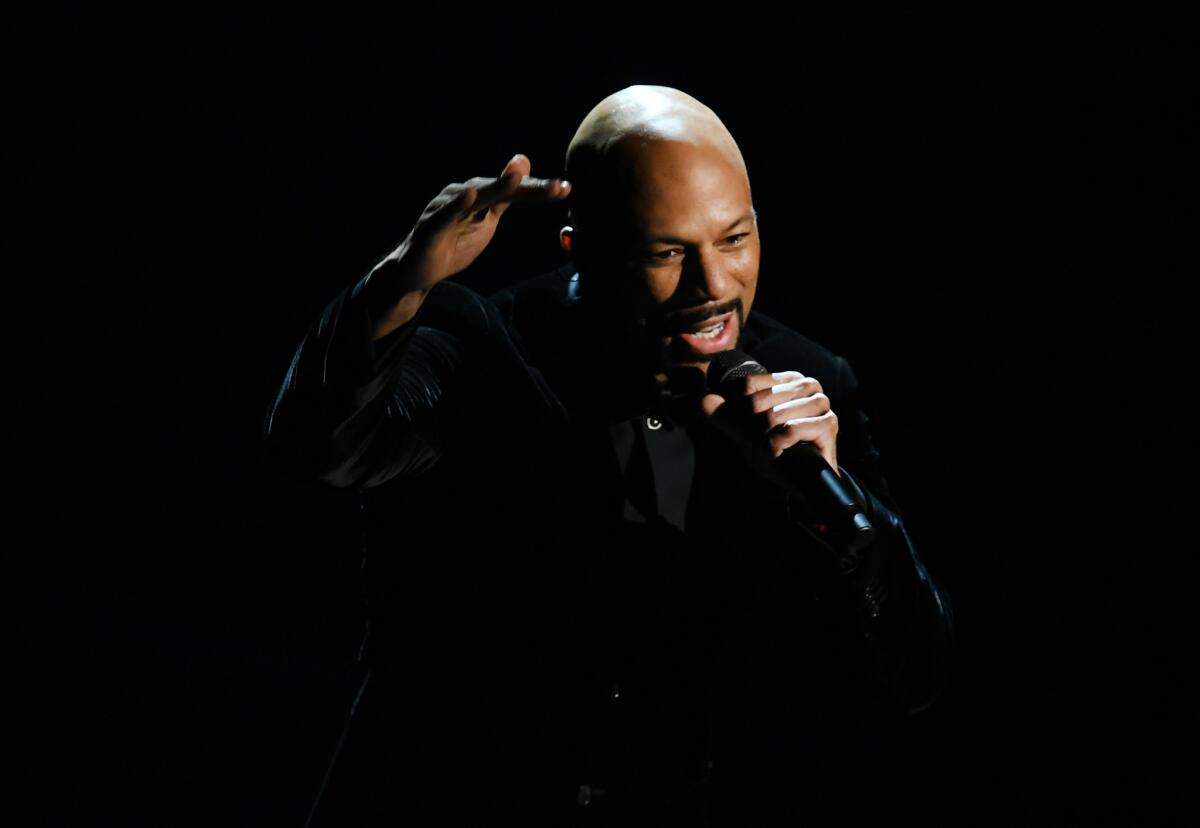
Common and Andra Day’s performance of “Stand Up for Something” was among the most poignant moments of Sunday’s Academy Awards as the pair were joined by nearly a dozen activists.
In recent months the powerful record — lifted from last year’s “Marshall” and up for original song — has taken on a life of its own as a potent anthem of resilience. It has been used as a rallying cry for the gun violence prevention movement and was a cornerstone of the L.A. Women’s March, and the People’s State of the Union in New York City, and was used to raise awareness on immigration rights.
For Sunday’s performance Day and Common wanted to spotlight 10 individuals working to create change, including the founder of the #MeToo movement and activists from a myriad of causes.
“If it’s one thing I learned from being a part of ‘Selma’ is that, an activist is someone who lives their life for what they believe in and works for that cause everyday,” Common said in a statement before the show. “The activists we asked to join us on stage are people who have dedicated their lives to making the world better. For some because their own personal experiences have driven them to this place, and some because they’ve seen the injustices going on in the world and felt they had to take action.”
Added Day: “I am truly honored to share the stage with such powerful people. People who work, sacrifice and have fought through their personal pain to make the world a better place. ... Common and I wanted to show people who are working everyday in the trenches to transform perceptions, circumstances, legislation, social and political landscapes, and bring hope to the hopeless.”
Here’s a breakdown of everyone who appeared onstage alongside the performers:
Alice Brown Otter, the 14-year-old who was a prolific voice of the #NoDAPL movement. In the summer of 2016, she ran 1,519 miles from Standing Rock Sioux Reservation in North Dakota to the front steps of the Army Corps of Engineers office in Washington, D.C., to protest the construction of the Dakota Access Pipeline.
Patrisse Cullors, queer activist and co-founder of the Black Lives Matter movement.
Bana Alabed, a Syrian refugee from Aleppo, who tweeted during the siege of the city in 2016. The 8-year-old penned a book, “Dear World: A Syrian Girl’s Story of War and Plea for Peace” about her experience, which J.K. Rowling describes as “a story of love and courage amid brutality and terror.”
Bryan Stevenson, the director of the Equal Justice Initiative and the author of “Just Mercy.” Stevenson and EJI won relief for scores of people wrongly convicted or unfairly sentenced.
Cecile Richards, a lifelong activist for women’s rights and social justice, including more than a decade as president of Planned Parenthood Federation of America and Planned Parenthood Action Fund.
Tarana Burke, founder of the #MeToo movement.
Dolores Huerta, the president and founder of the Dolores Huerta Foundation. Huerta also co-founded the United Farm Workers of America with Cesar Chavez in 1962. She has received numerous awards, among them the Eleanor Roosevelt Human Rights Award in 1998 and the Presidential Medal of Freedom in 2012.
Janet Mock, the New York Times bestselling author of two memoirs, “Redefining Realness” and “Surpassing Certainty,” books that broke ground by centering her journey as a young trans woman. Mock spoke at the Women’s March on Washington and founded #GirlsLikeUs, a project that empowers trans women. Mock is also the first trans woman of color to write and produce for television as she’s working on Ryan Murphy’s upcoming series “Pose.”
José Andrés, who was named one of Time’s 100 Most Influential People, Outstanding Chef and Humanitarian of the Year by the James Beard Foundation. He served more than 3.3 million meals in Puerto Rico following the devastation of Hurricane Maria last year, reaching communities in need across all 78 municipalities through 23 kitchens. Andrés’ work has earned numerous awards including the 2015 National Humanities Medal, one of 12 distinguished recipients of the award from the National Endowment for the Humanities.
Nicole Hockley, mother of Dylan Hockley, who was killed in the Sandy Hook shooting. She is the founder and managing director for Sandy Hook Promise, the national non-profit organization founded and led by several family members who lost loved ones at Sandy Hook Elementary School in 2012.
- Share via
At the Oscars, it’s a sea of blush, nude and pale pink gowns
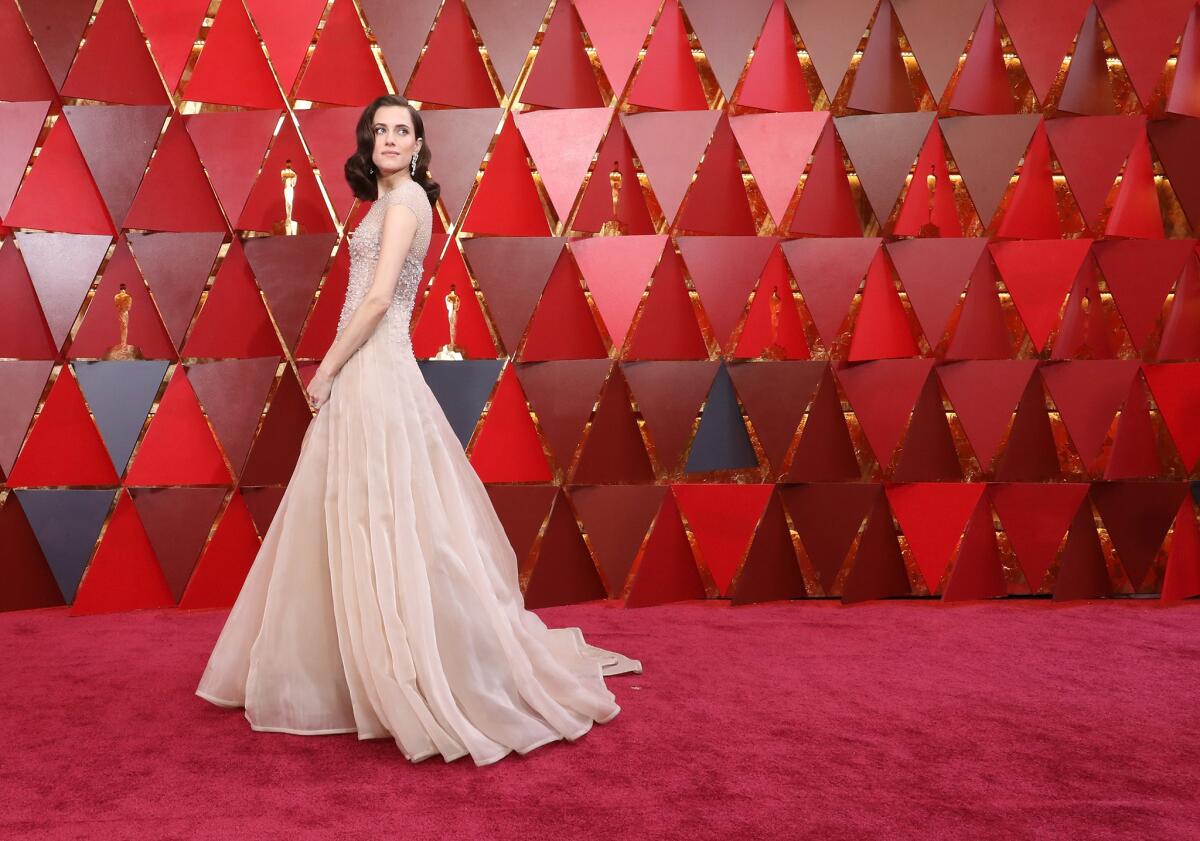
Striking a note between bold and bland, blush-tone gowns gave that sense of barely-there coverage mixed with innocence. Blush, nude, pale pink — whatever you call it — the tone can melt into paler complexions, but when it’s embellished with plenty of sparkle, those subtle hues come alive.
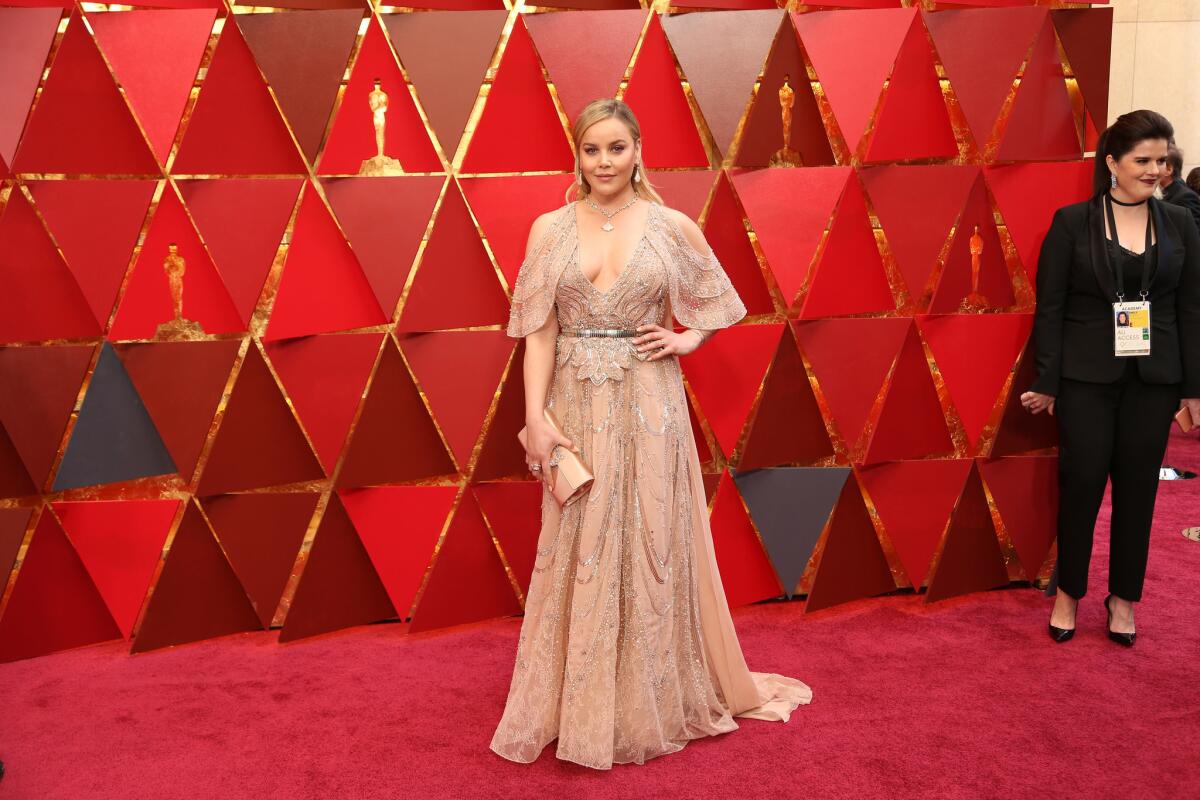
They were a popular choice on the Academy Awards red carpet on Sunday night, chosen by Allison Williams in Armani Prive, an Elie Saab Couture-clad Abbie Cornish, Emily V. Gordon in J. Mendel and Elisabeth Moss, who wore Dior Haute Couture.
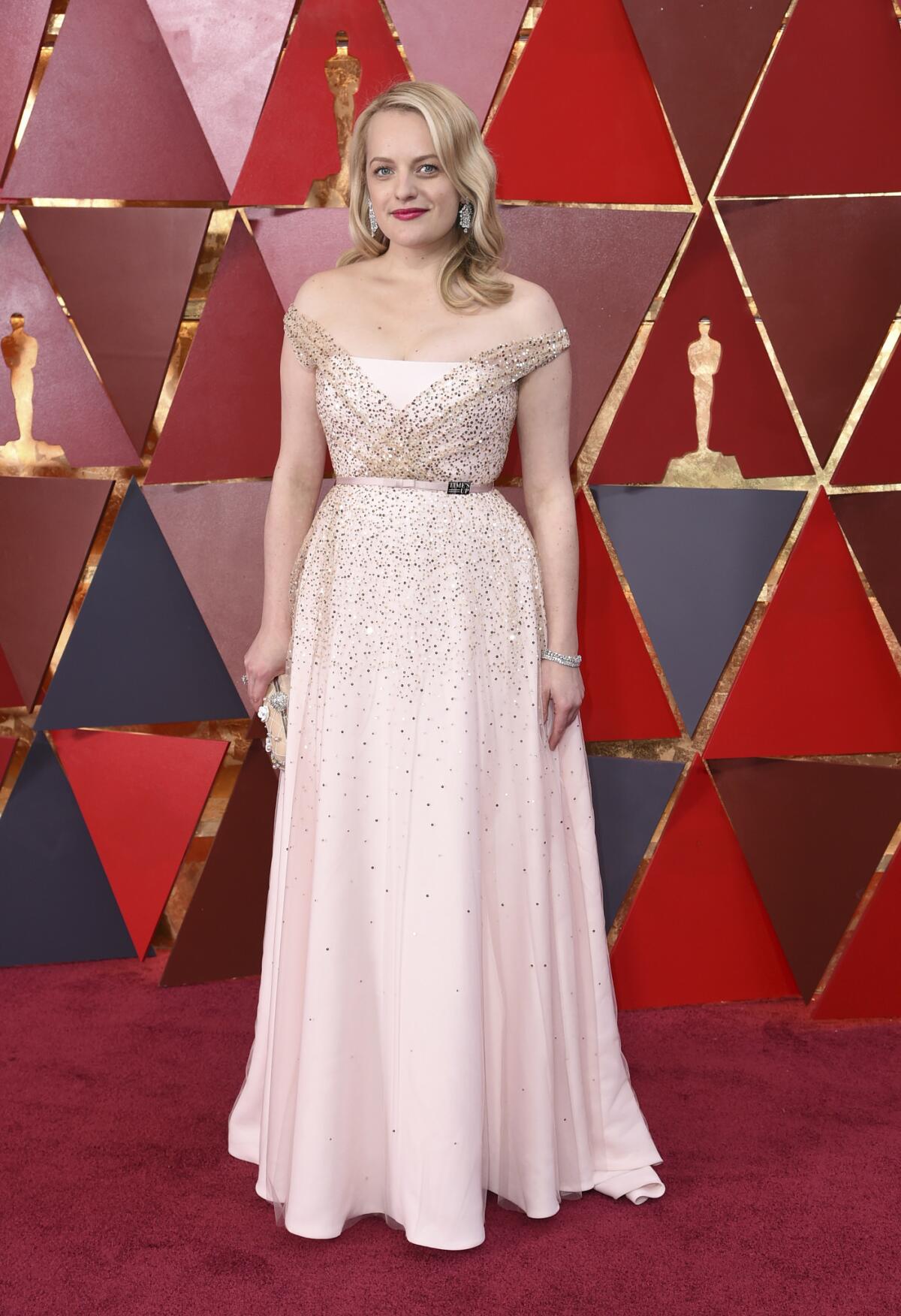
- Share via
‘The Silent Child’ wins for live-action short
“The Silent Child” wins the 2018 Academy Award for live-action short.
- Share via
Call him Oscar winner Kobe Bryant now. Or not
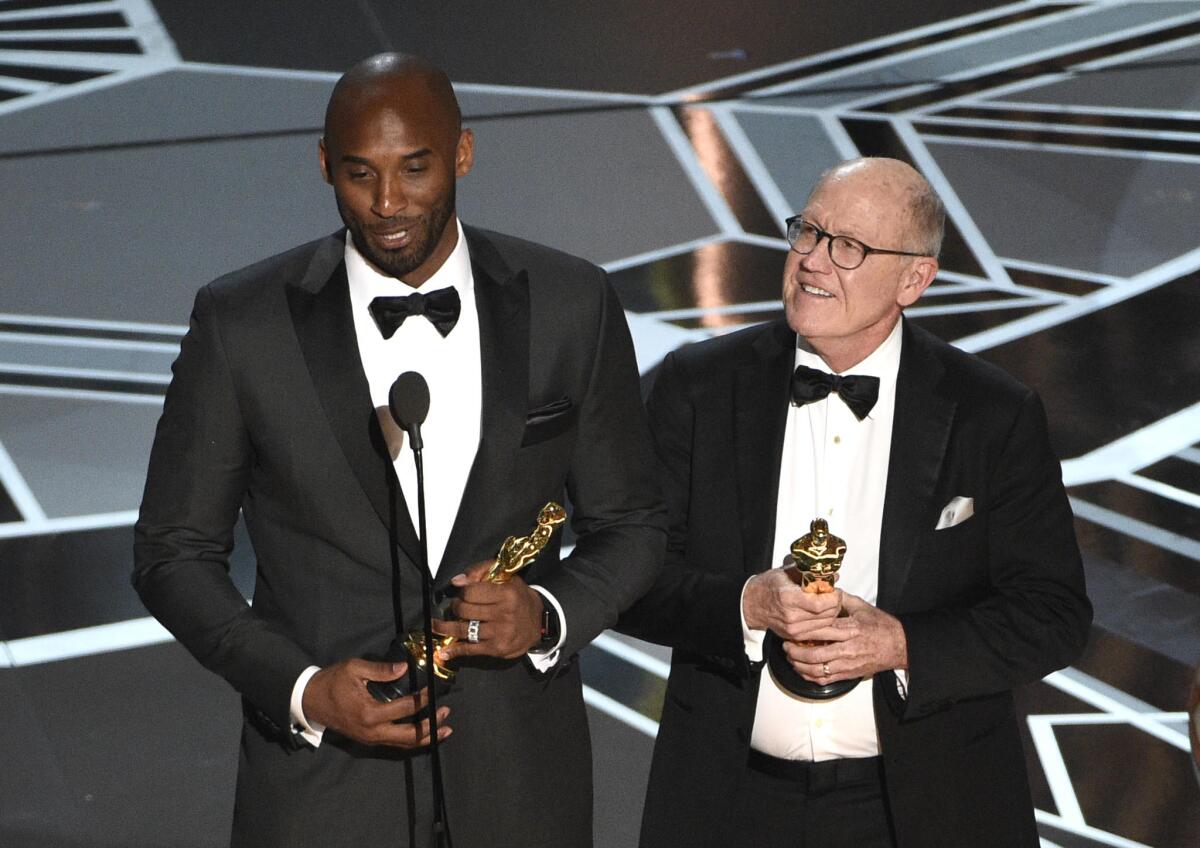
Eighteen-time NBA All-Star and five-time champion Kobe Bryant received his first Academy Award Sunday night.
The former Lakers star accepted his Oscar for animated short during Sunday’s ceremony alongside artist Glen Keane, who gave life to his 2015 “Dear Basketball” letter, which announced the baller’s retirement from the game. Composer John Williams scored the film.
“It’s a message for all of us,” Keane said in his speech. “Whatever form your dream may take, it’s through passion and perseverance that the impossible is possible.”
Bryant, who produced and wrote the short, interrupted Keane’s speech to remind viewers that “as basketball players, we’re supposed to shut up and dribble.” He additionally thanked his wife and three daughters and kept his comments onstage brief.
The athlete’s nomination alone sparked controversy in the age of #MeToo and Time’s Up. Sexual misconduct scandals ended careers throughout the entertainment industry in the past year, so Bryant’s recognition by the academy will no doubt raise eyebrows given that he was charged with rape in 2003.
That was the same year the academy awarded the director Oscar to convicted sex offender Roman Polanski for “The Pianist,” as the The Times’ columnist Robin Abcarian wrote this week. The charges against Bryant were later dropped, but, Abcarian wrote, that “is not an exoneration.”
Read more about “Dear Basketball” here and Abcarian’s column on Hollywood’s moral confusion here.
- Share via
‘Heaven Is a Traffic Jam on the 405’ wins for documentary short
“Heaven is a Traffic Jam on the 405” wins the 2018 Academy Award for documentary short.
- Share via
A dazed-looking Sufjan Stevens triggers Oscar memories of Elliott Smith
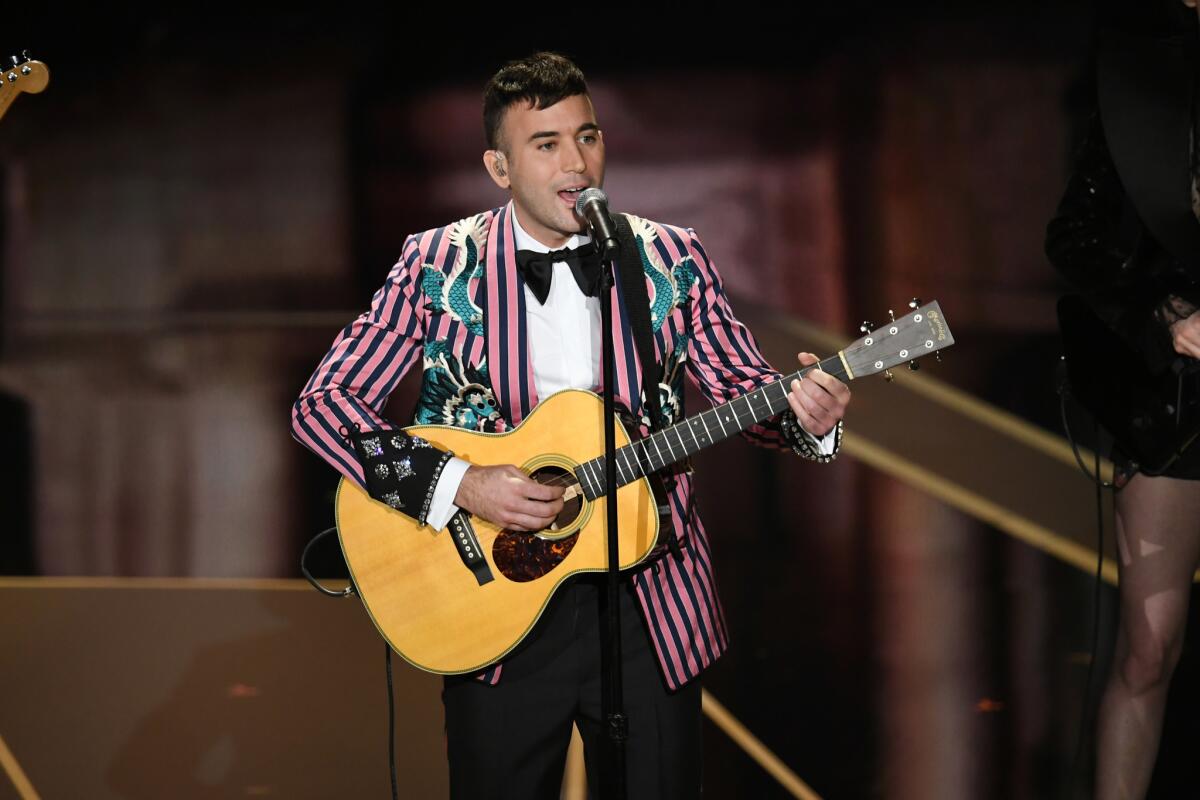
Reaffirming the established idea that nothing makes a gentle indie boy look more frightened than the Oscars stage, Sufjan Stevens sang his very pretty “Mystery of Love” (from “Call Me by Your Name”) like someone who’d been called unwillingly to the principal’s office.
The performance — for which Stevens was aided by a hipster’s dream team that included St. Vincent, Chris Thile and Moses Sumney — took place almost 20 years to the day after Elliott Smith flashed his best deer-in-headlights look as he did “Miss Misery” (from “Good Will Hunting”) on the Academy Awards in 1998.
- Share via
Lee Smith wins for film editing for ‘Dunkirk’
Lee Smith wins the 2018 Academy Award for film editing for “Dunkirk.”
- Share via
Allison Janney drops some truth on the Oscars crowd
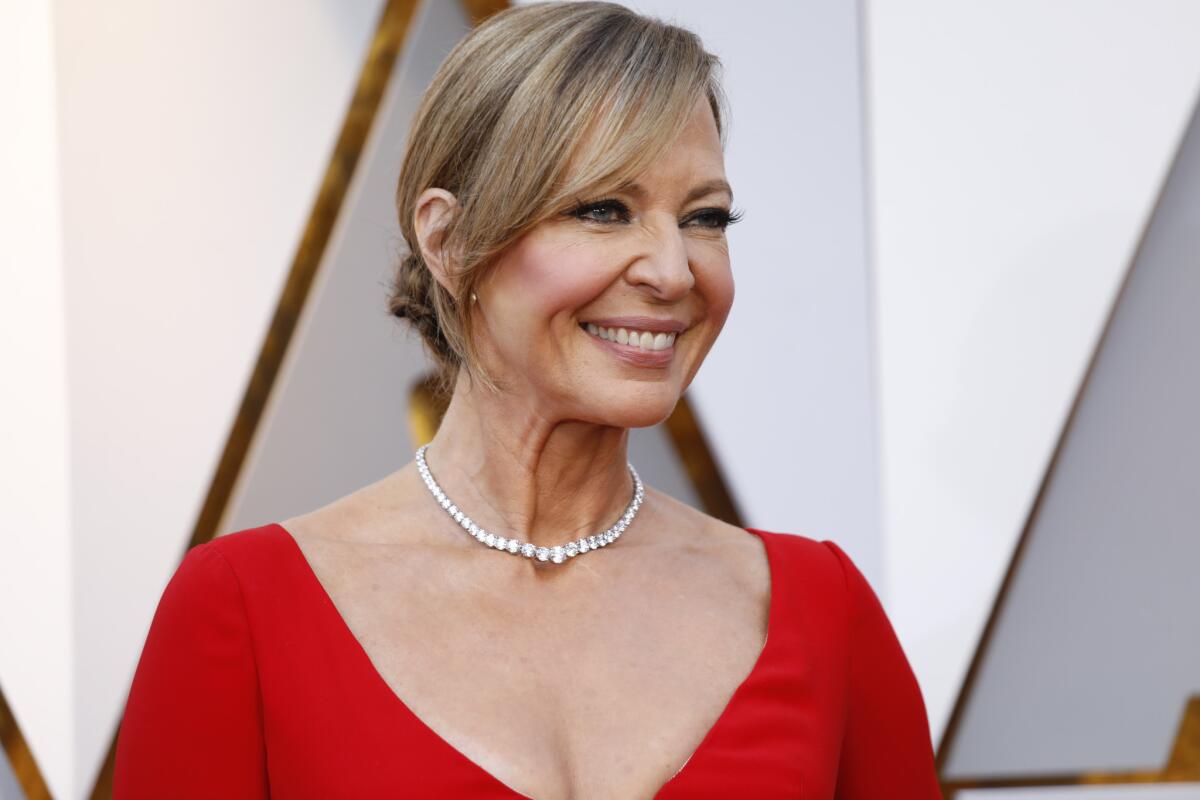
“I did it all by myself.”
— Allison Janney
- Share via
‘Dear Basketball’ wins for animated short
“Dear Basketball” wins the 2018 Academy Award for animated short.
- Share via
‘Blade Runner 2049’ wins for visual effects
The 2018 Academy Award winners for visual effects are John Nelson, Gerd Nefzer, Paul Lambert and Richard R. Hoover for “Blade Runner 2049”
- Share via
Sam Rockwell backstage after his Oscar win: ‘I could go on for an hour about Philip Seymour Hoffman’
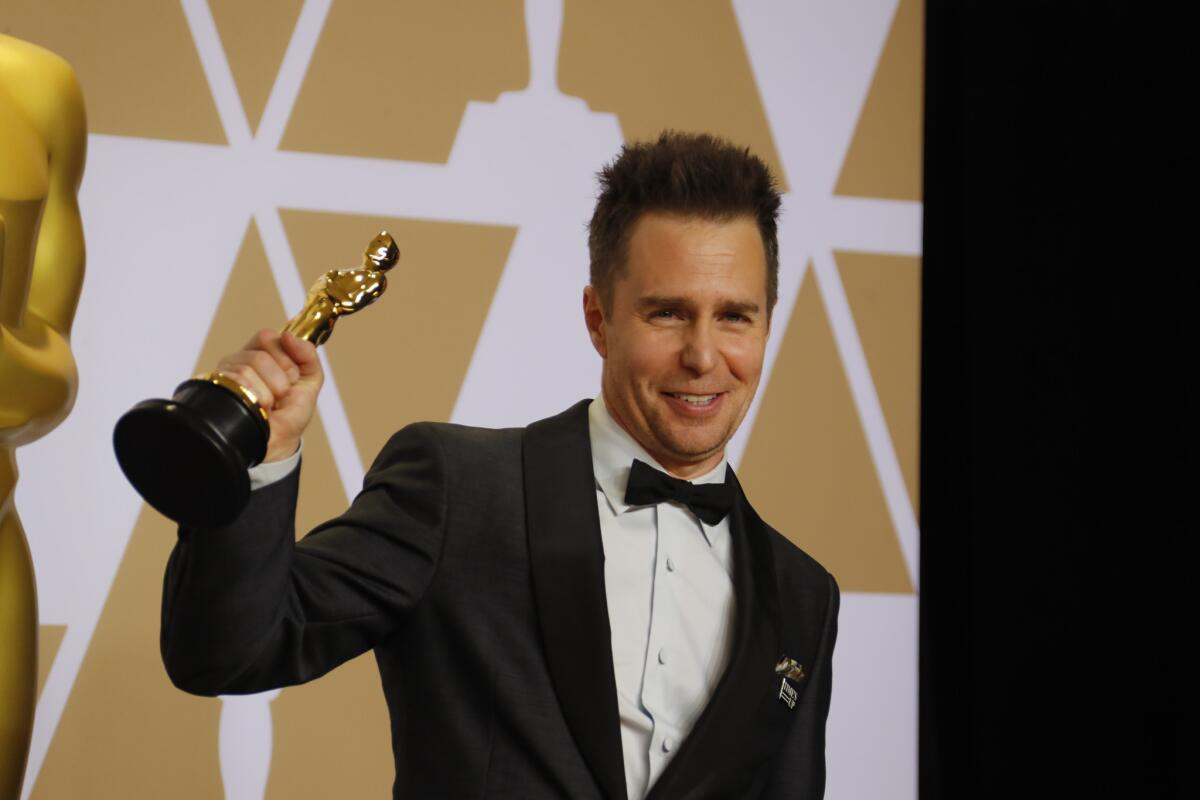
Sam Rockwell sauntered backstage after winning the supporting actor Oscar for his portrayal of an erratic and racist police officer in director Martin McDonagh’s dark fairy tale, “Three Billboards Outside Ebbing, Missouri.”
He looked relaxed, like a man who expected to win after an awards season that found the film he starred in alongside Frances McDormand and Woody Harrelson garnering a wealth of critical accolades, including seven Academy Award nominations.
Asked what he did to prepare for the volatile role of a deputy who tries to prevent a grieving mother from continuing to publicly chastise the sheriff’s department for not solving the rape and murder of her teenage daughter, Rockwell called his process, “A big soufflé, a stew. I did some ride-alongs with some cops, met with some skin-graft patients. I had two or three months to indulge in all this research.”
He also elaborated on a previous statement that his character’s arc was similar to Barney Fife from “The Andy Griffith Show” transitioning into Travis Bickle from the ultra-violent 1970s parable, “Taxi Driver.”
“The town of Ebbing is very much like Mayberry, and Woody Harrelson is very much like Andy Griffith,” he said. “The goofiness of Barney Fife morphing into Travis Bickle was kind of a generalization. It’s a lot more complicated than that, obviously.”
Rockwell became extra animated when asked why he thanked the late Philip Seymour Hoffman when he accepted his Oscar statuette. He wasn’t sure anyone had heard him because the music was swelling when he uttered his last words.
“He was an old friend of mine, he directed me in a play at the Public Theater,” Rockwell said, adding that Hoffman was an inspiration to all of his peers including Billy Crudup, Liev Schreiber, Mark Ruffalo and others. “Phil Hoffman was the guy, and he was a great director. He vowed to direct a play of a year ... I could go on for an hour about Philip Seymour Hoffman.”
Regarding McDonagh’s contention that “Three Billboards” couldn’t be set in Ireland or England, Rockwell said he felt it could be set in almost every working-class town around the world, but, he added, “There is something very timely about it now with what’s going on in this country.”
- Share via
‘A Fantastic Woman’s’ Daniela Vega’s advice to other trans people in the industry
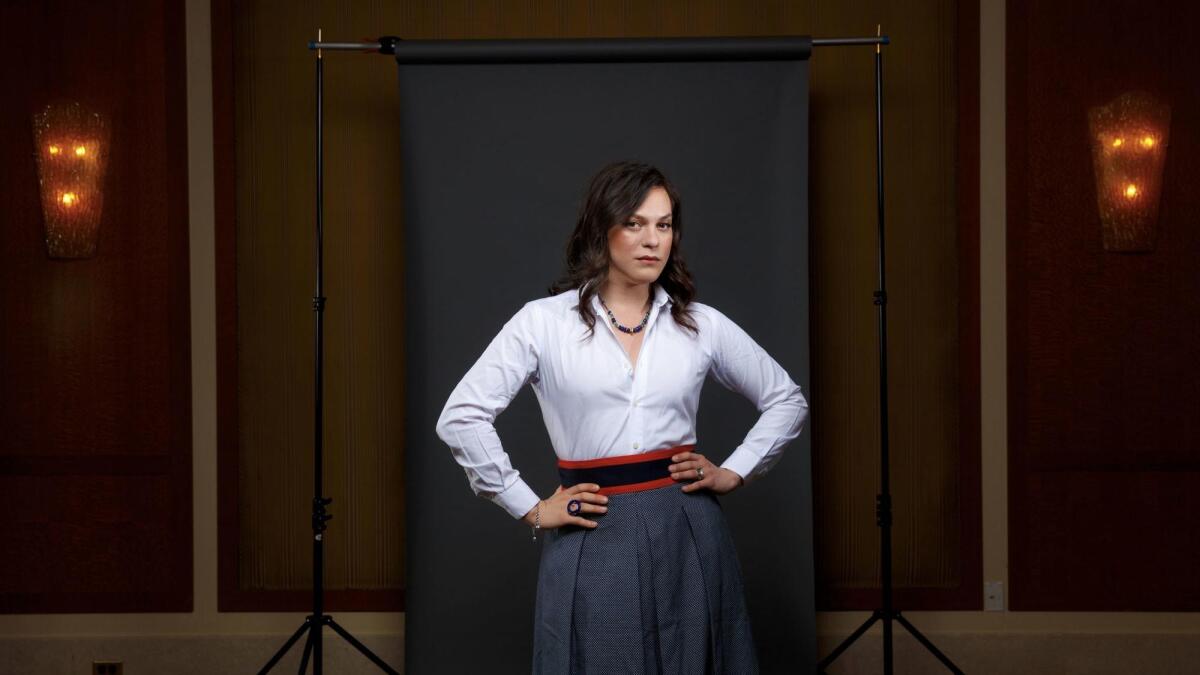
“I would like more trans people to take their own path. And those of us that have been paving the way for others and opening doors, we need to continue to keep those doors open for the next generation. But a question is, why is it just now that trans individuals are starting to run next to people who have always had those opportunities to play the main roles. Why is that just happening?”
— Daniela Vega, actress
READ MORE: ‘A Fantastic Woman’ star Daniela Vega on her breakout role and trans rights in Chile >>
- Share via
‘Coco’ wins for animated feature film
“Coco” wins the 2018 Academy Award for animated feature film.
- Share via
Allison Janney wins for actress in a supporting role
Allison Janney wins the 2018 Academy Award for actress in a supporting role for “I, Tonya.”
- Share via
In Sacramento, they’re holding their breath for ‘Lady Bird’
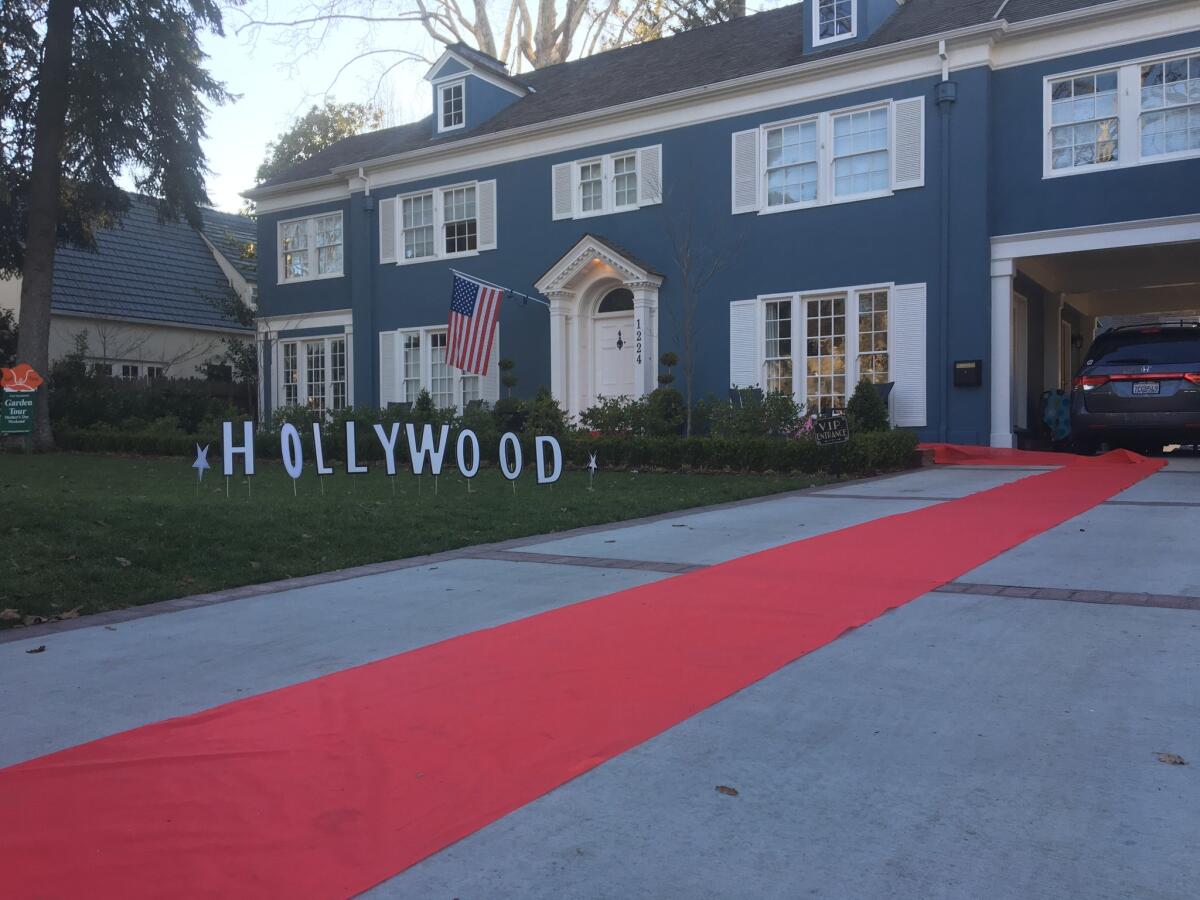
There was a red carpet in front of the iconic blue house featured in “Lady Bird” as Oscar night drew neighbors rooting for their hometown favorite, writer-director Greta Gerwig.
“Her story really resonates,” said Chris Wood, the owner of the East Sacramento home that serves as the setting for some of the movie’s most poignant moments.
Wood and a large throng of neighbors gathered to watch the Academy Awards, all hoping the movie that has resonated so deeply in California’s capital city would walk away with at least one of the statues on Sunday night.
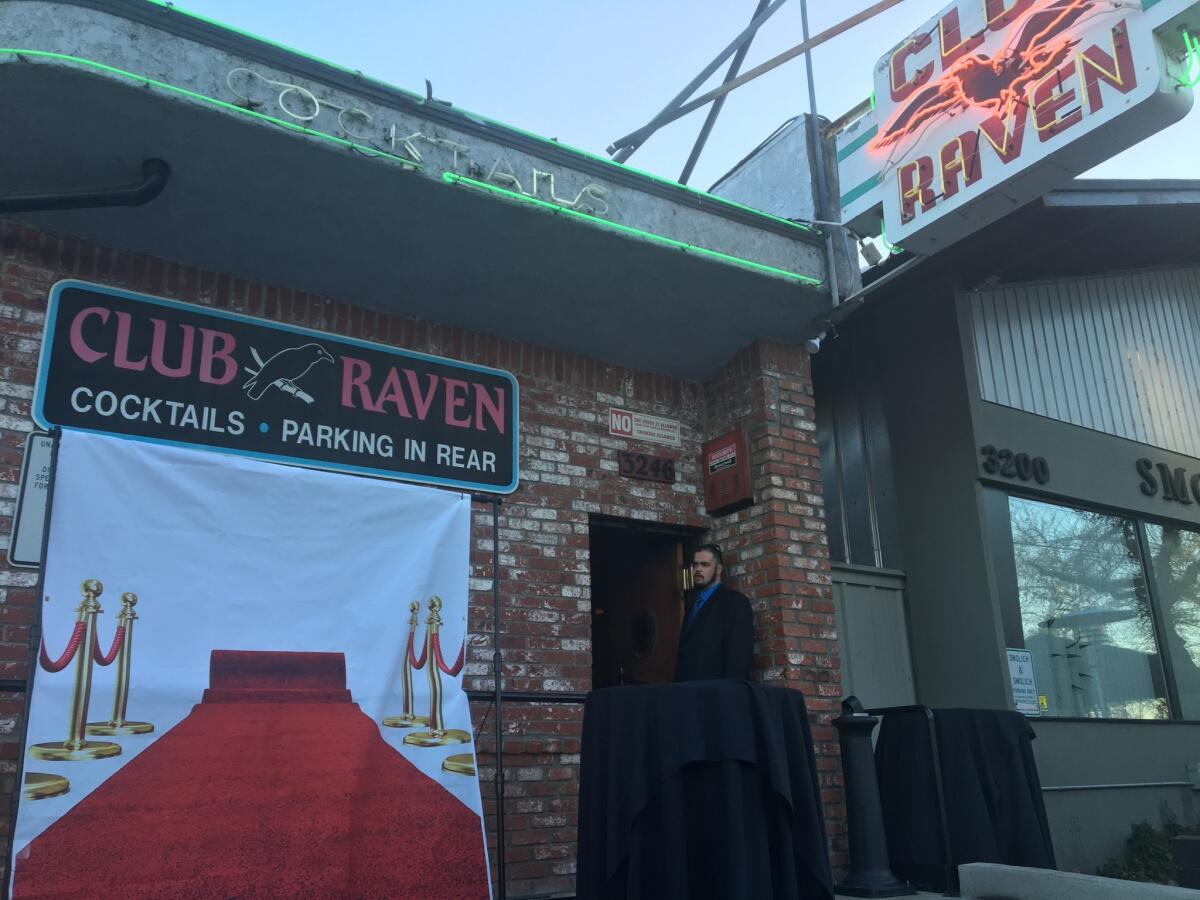
A few blocks away, a large crowd gathered at Club Raven, a neighborhood bar whose neon sign also got its brief few seconds of fame in Gerwig’s movie. Inside, patrons were dressed up in ball gowns and black tie. (After the film opened, the bar began serving a “Lady Bird” cocktail--vodka, blackberry syrup, sweet and sour mix and soda water.)
Back at the Wood family home, neighbors joked that the house should’ve been nominated for best supporting actor.
“We’ve had fun,” said Wood of the notoriety.
- Share via
Kazuhiro Tsuji just made Oscar history — but he’d rather focus on his work
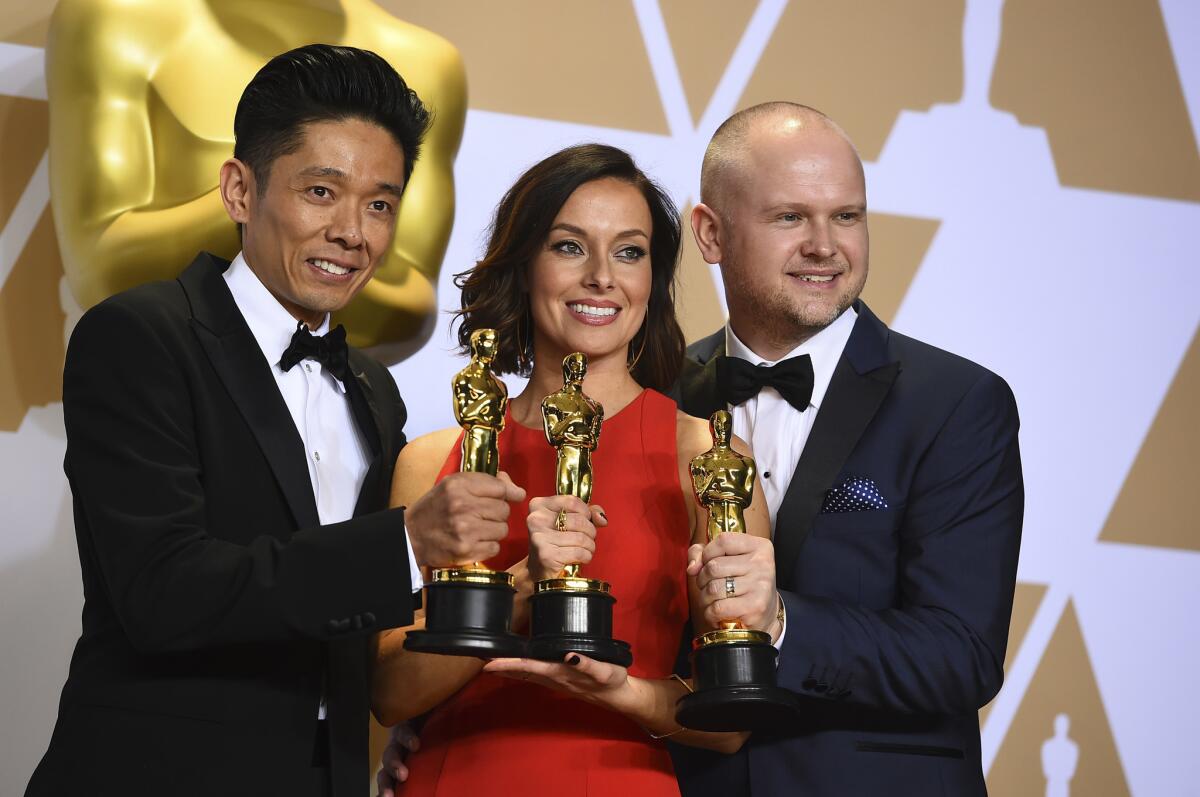
With his Academy Award win, along with David Malinowski and Lucy Sibbick, for their work in “Darkest Hour,” Kazuhiro Tsuji became the first Asian individual to win the Oscar for hair and makeup.
But the makeup artist, whom Gary Oldman pulled out of retirement for this project featuring the actor as Winston Churchill, doesn’t focus on his identity and being a first.
“I don’t want to think about [being] Asian,” he said backstage at the Academy Awards. “I’m just doing what I love to do. As soon as we start to think about the race we are, it’s not good. It doesn’t work well.”
- Share via
Maybe let’s forget that Oscar performance of ‘Coco’s’ ‘Remember Me’?
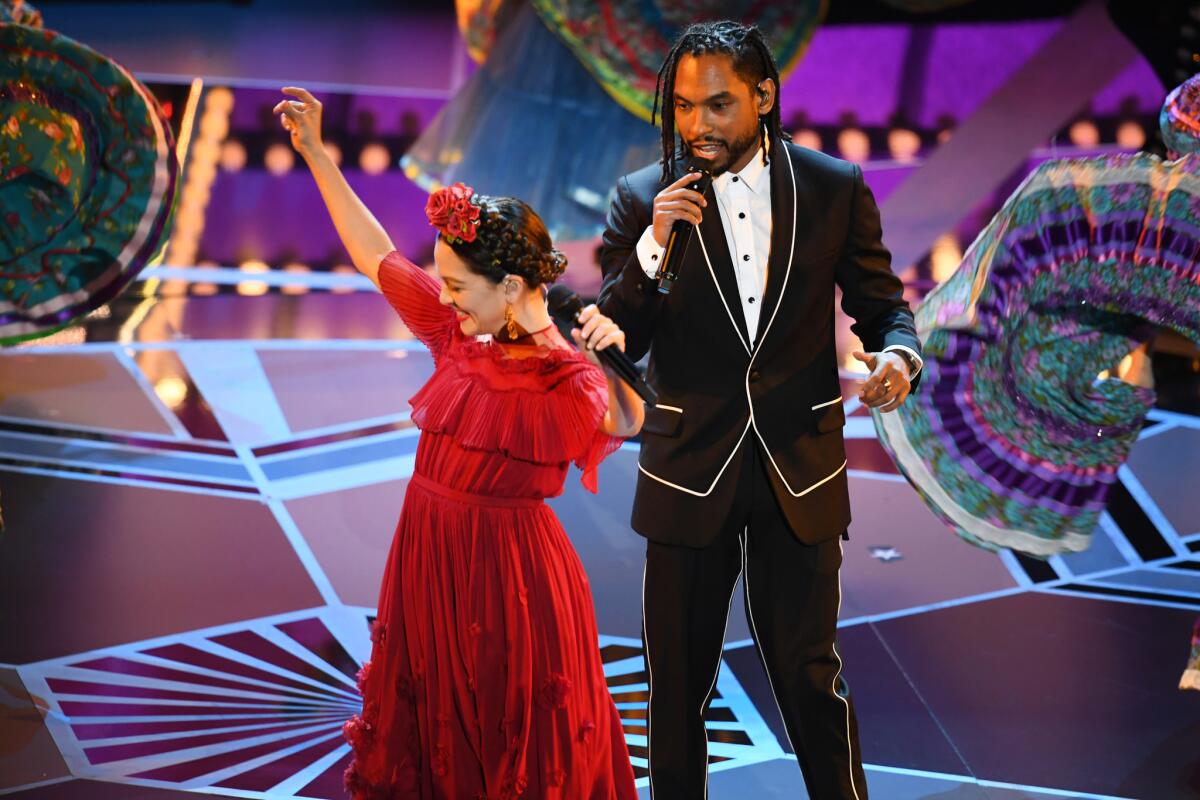
Well, that was … kind of awkward.
Considered by many to be the front-runner for the original song Oscar, “Remember Me” (from Disney’s “Coco”) got an iffy rendition that started out with the very charming Gael García Bernal warbling a few lines in what appeared to be his impression of a 12-year-old boy.
Then Miguel and Natalia Lafourcade showed up, and though they certainly sang better than Bernal did, the two seemed stifled by needing to wind their way through the troupe of dancers twirling around them.
Great song, shaky performance.
- Share via
‘A Fantastic Woman’ wins for foreign language film
“A Fantastic Woman” wins the 2018 Academy Award for foreign language film.
- Share via
Mary J. Blige digs deep for Oscar performance of ‘Mighty River’
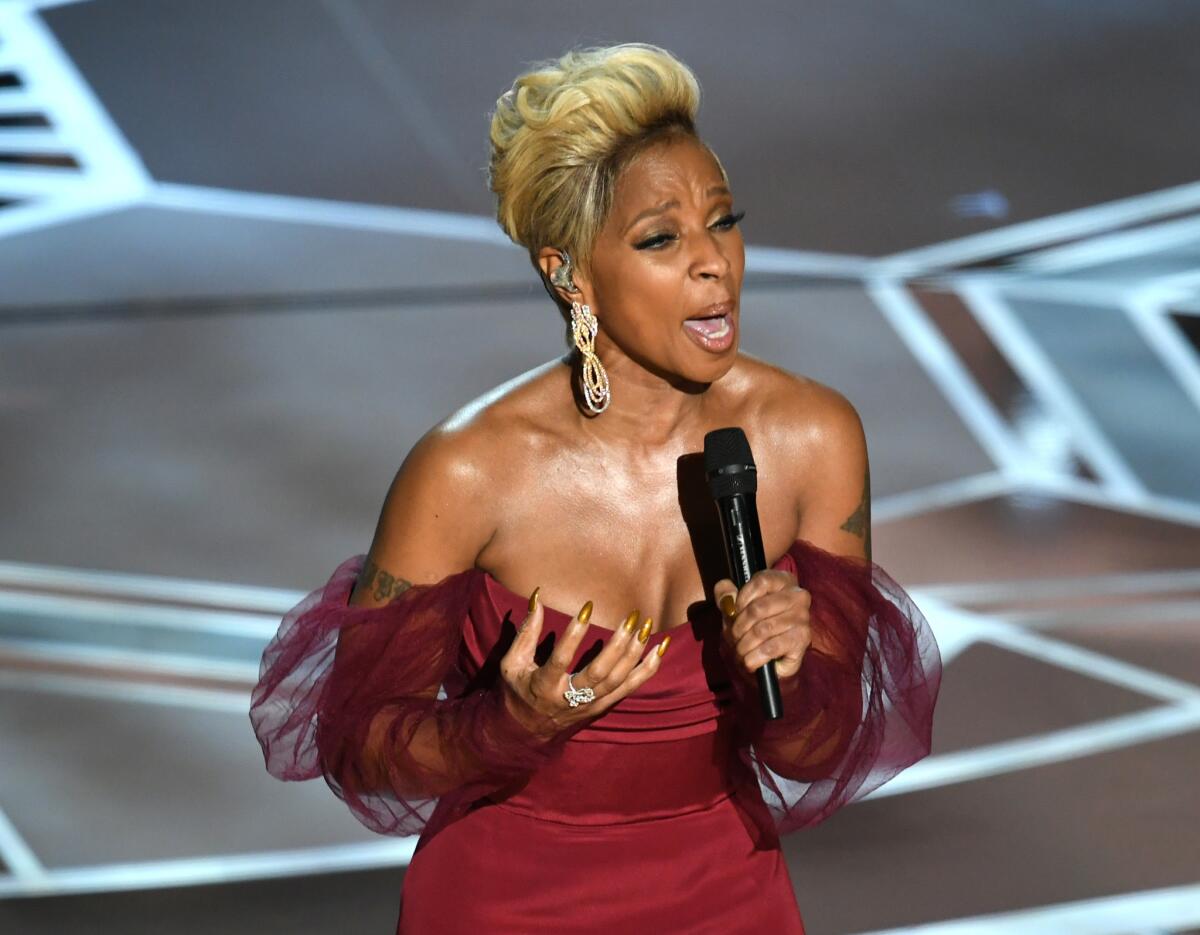
Mary J. Blige gave the first of the evening’s five performances of the tunes nominated for original song — but she definitely didn’t come with a soft launch in mind.
Singing “Mighty River” from “Mudbound” (which also led to a nod for Blige in the supporting actress category), the veteran R&B star dug deep into the gospel-fired composition she co-wrote with Raphael Saadiq and Taura Stinson, pushing her voice close to the breaking point as she sang about how “greed is a monster” and described the need to “put our differences aside.”
- Share via
Janet Mock at the Oscars: It’s time for better representation, in front of the camera and behind it
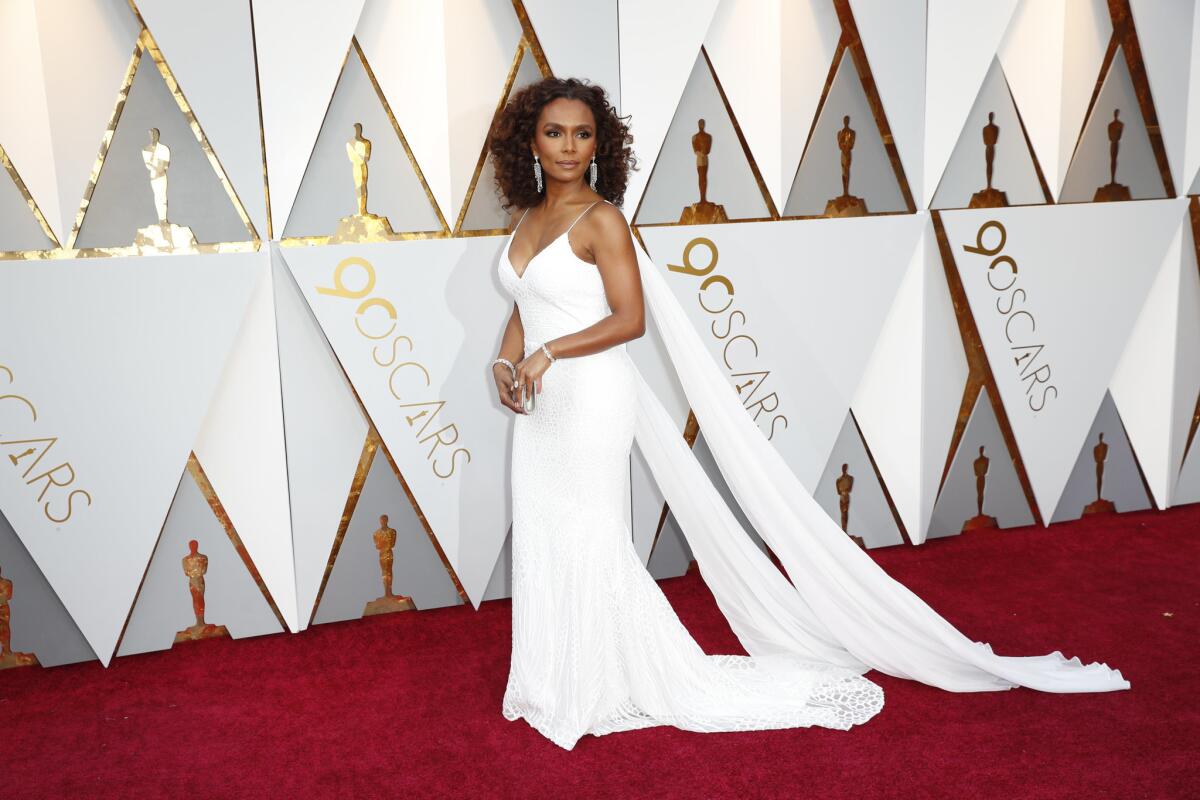
I think right now there’s greater awareness. I can’t wait to see the actual action. The actual action that people do to actually, hopefully change things from the gender pay gap to, of course, sexual assault and harassment in the workplace. And making sure also … behind the scenes that we shift and change, and that people who are actually being portrayed on camera are written by and directed by and costumed by folk from those communities.
— Trans activist Janet Mock
- Share via
Paul D. Austerberry wins for production design
Paul D. Austerberry wins the 2018 Academy Award for production design for “The Shape of Water.”
The other nominees include:
- Share via
‘Dunkirk’ wins for sound mixing
The 2018 Academy Award winners for sound mixing are Mark Weingarten, Gregg Landaker and Gary A. Rizzo for “Dunkirk.”
- Share via
Greta Gerwig and Laura Dern crowd-source their documentary presentation
Just before she was to present best documentary feature, Greta Gerwig was having her makeup touched up - - “I did you on ‘No Strings Attached!’ the makeup artist reminded the actress - - when co-presenter Laura Dern arrived backstage. Gerwig was jittery with excitement.
” I can’t breathe in,” she said with a smile.
“I know,” Dern said. “I wish I didn’t wear eyeglasses.”
“When we walk out, should we hold hands?” Dern asked Gerwig. “I think arm-in-arm is awkward.” She noticed a clutch of reporters observing the actresses’ conversation and asked for advice.
“Holding hands? That’s cute, right?”
“We crowd-sourced it!” Gerwig said.
Just as they made their decision, an accountant from Price Waterhouse Cooper handed Dern the envelope. “Can you confirm that this is for documentary feature?” the accountant asked the actress.
Because we aren’t playing around with those envelopes this year, y’all.
- Share via
#MeToo founder Tarana Burke answers the question: What next?
After a momentous year in which Hollywood began to confront sexism and sexual misconduct in the industry, #MeToo founder Tarana Burke walked the Oscars red carpet with a compelling question lingering in the air: What next?
“We’ve only been talking about sexual violence for four months, so when people are already rushed to say what’s next, we have a lot to unpack where we are right now,” Burke said. “And so we’re continuing to unpack and look at sexual violence, and really, what’s next is figuring out how to get sexual violence resources. We have millions of people around the world who have opened up and are talking about their needs, and now we need to figure out how to meet those needs.”
- Share via
‘Dunkirk’ wins for sound editing
The 2018 Academy Award winners for sound editing are Richard King and Alex Gibson for “Dunkirk.”
- Share via
From Harvey Weinstein to ‘Black Panther,’ some of Jimmy Kimmel’s best zingers from his Oscars monologue
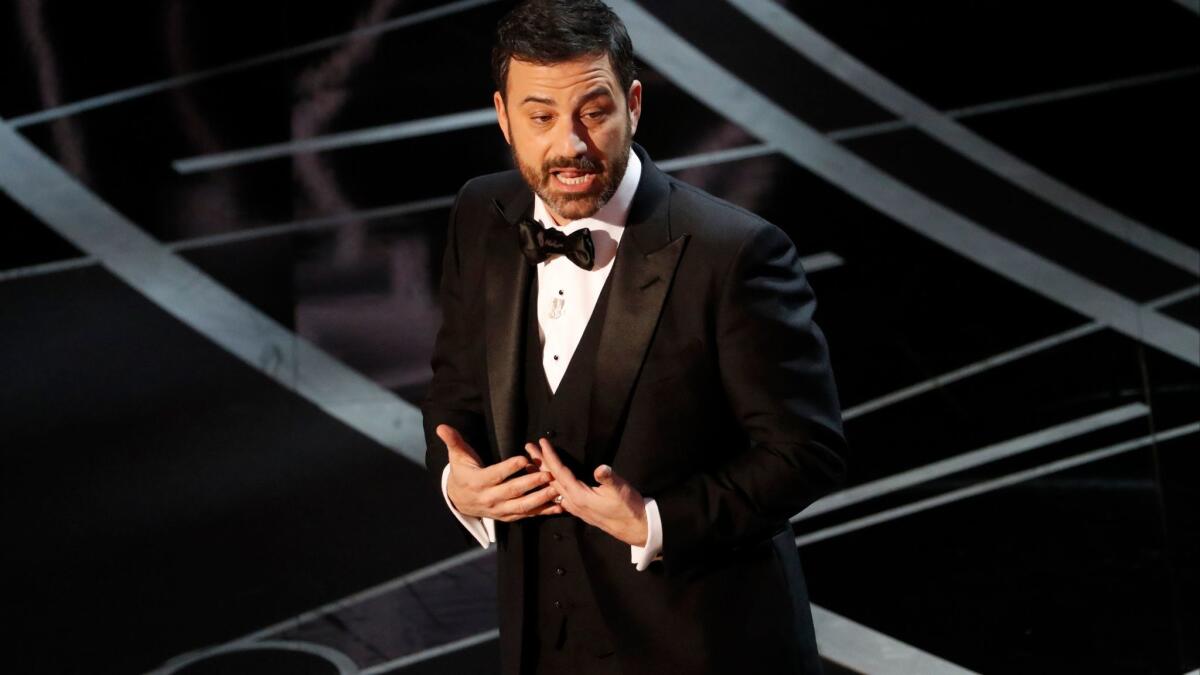
Jimmy Kimmel returned for his second stint hosting the Oscars, hopefully this time without the wrong film being named best picture at the end.
Here are some of the best bits from his opening monologue:
After thanking the academy for having him back a second time: “Some of you will be going home with an Academy Award. This year when you hear your name called, don’t get up right away. Give us a minute, we don’t want another thing.”
About the “thing” that happened: “Last year, about a week before the show, the producers asked me if I wanted to do comedy with the accountants, and I said ‘No, I don’t want to do comedy with the accountants.’ And so the accountants went ahead and did some comedy on their own.”
About the Oscar statuette itself: “Oscar is the most beloved and respected man in Hollywood and there’s a good reason why. Just look at him, he keeps his hands where you can see him, never says a rude word and most importantly, no penis at all. He is a statue of limitations.”
- Share via
Forget the gold: These Olympians are all about glam at the Oscars
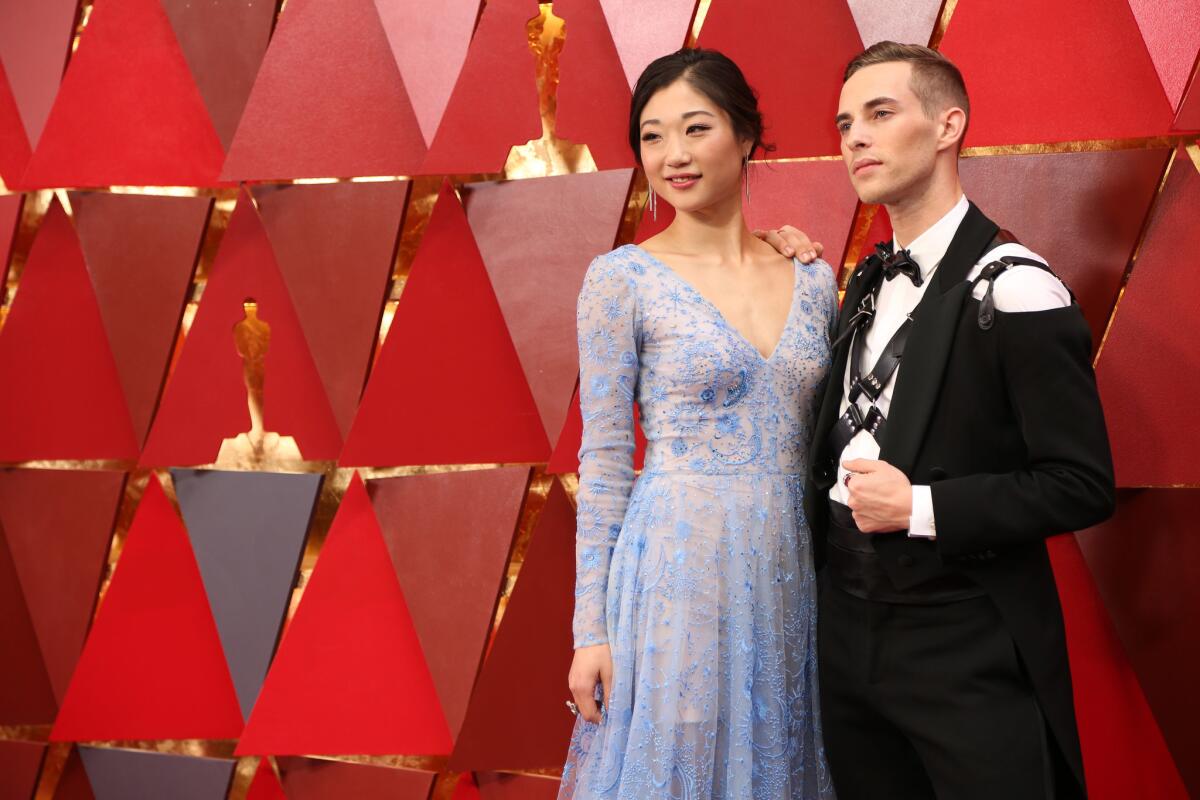
It’s a long way from Pyeongchang, South Korea, to Hollywood, but you wouldn’t know that to look at the athletes at the Academy Awards on Sunday night.
Several Olympians graced the red carpet, not bedecked with medals, but with style.
Besties and figure skaters Mirai Nagasu and Adam Rippon were styling, with Nagasu in light blue and Rippon rocking a leather halter.
Alpine skier Lindsey Vonn broke out the black for the event with beads and sparkles and sequins to spare. Vonn was joined on the carpet by Spanish tennis star Garbiñe Muguruza.
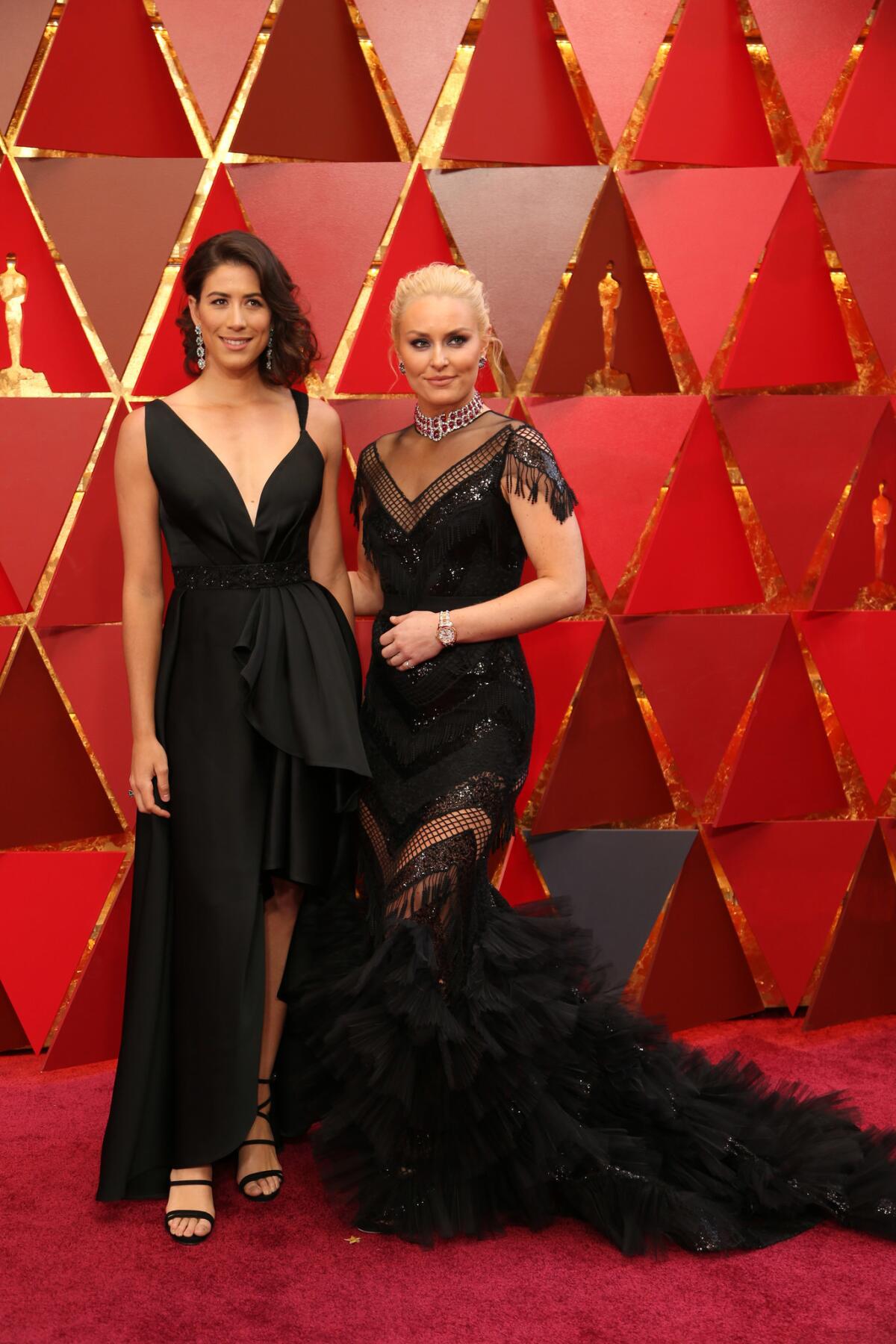
- Share via
Eva Marie Saint is older than the academy and proud of it
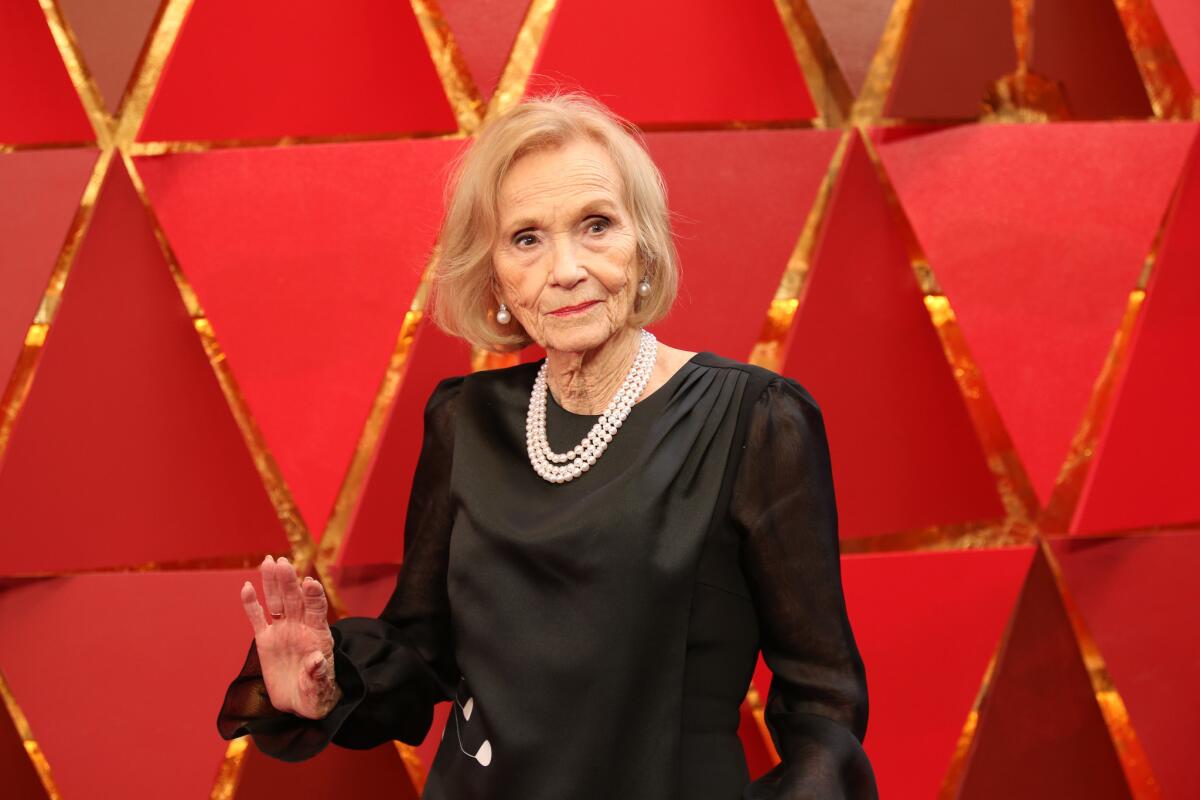
I just realized something: I’m older than the academy. ... I’m very proud of that. Just keep moving.
— Eva Marie Saint, 93, who presented the award for costume design
Read more about Eva Marie Saint and her Hollywood history here.
- Share via
At the Academy Awards, power dressing is a bold move
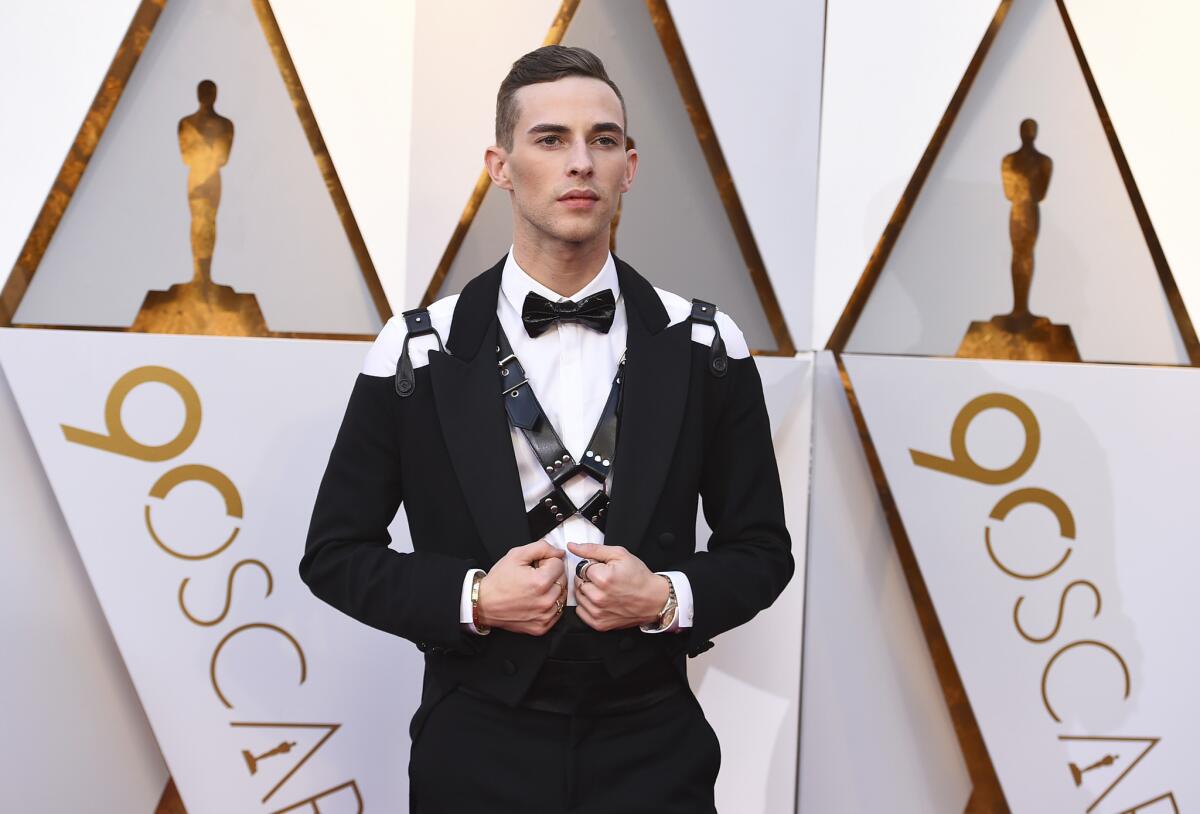
Although some men might think veering into velvet is a big step forward in formal wear, a few Oscar attendees made a bold interpretation of power dressing for the red carpet.
Fresh off winning a bronze medal at the Winter Olympics in Pyeongchang, South Korea, figure skater Adam Rippon fearlessly showed off the trends for cutouts and bondage in his black Moschino suit designed by Jeremy Scott.
Besides excising the shoulders from the tuxedo jacket, Scott accessorized the Olympian with a patent leather bow tie, a leather studded chest harness and a satin cummerbund. Compared with the weather in South Korea, Hollywood was balmy at 62 degrees on Sunday. So Rippon didn’t wear his socks under his ensemble, which Scott described as “a nod to old Hollywood with a twist.”
- Share via
Rachel Morrison on her historic Oscar nomination
What three words describe the feeling of being the first woman to receive an Oscar nomination in the cinematography category? “Fulfilling, inspiring, terrifying,” Rachel Morrison said Sunday on the red carpet.
“And to be the first is, obviously, there’s an extra pressure. It’s momentous. I know there are women looking up to me now, and hopefully this will open doors for people across all budgets, across all projects.”
Morrison just might be back next year, as she’s the director of photography on director Ryan Coogler’s hit “Black Panther.”
“Ryan I’ve known since ‘Fruitvale [Station].’ He’s like the brother I always wanted and never had, so just to hang out with Ryan for six months was the best part of ‘Black Panther’ for me.
“The set’s awesome too. You get to do things, certainly for me, that I’ve never done before. Bit stunt sequences, the CGI elements which turned out to be a lot less intimidating than I thought they’d be. We all were trying to do something special … with a message and much more grounded authentic look at the world. So I’m incredibly proud of the results.”
- Share via
‘Icarus’ wins for documentary feature
“Icarus” wins the 2018 Academy Award for documentary feature.
- Share via
Taraji P. Henson appears to throw shade at Ryan Seacrest on the red carpet
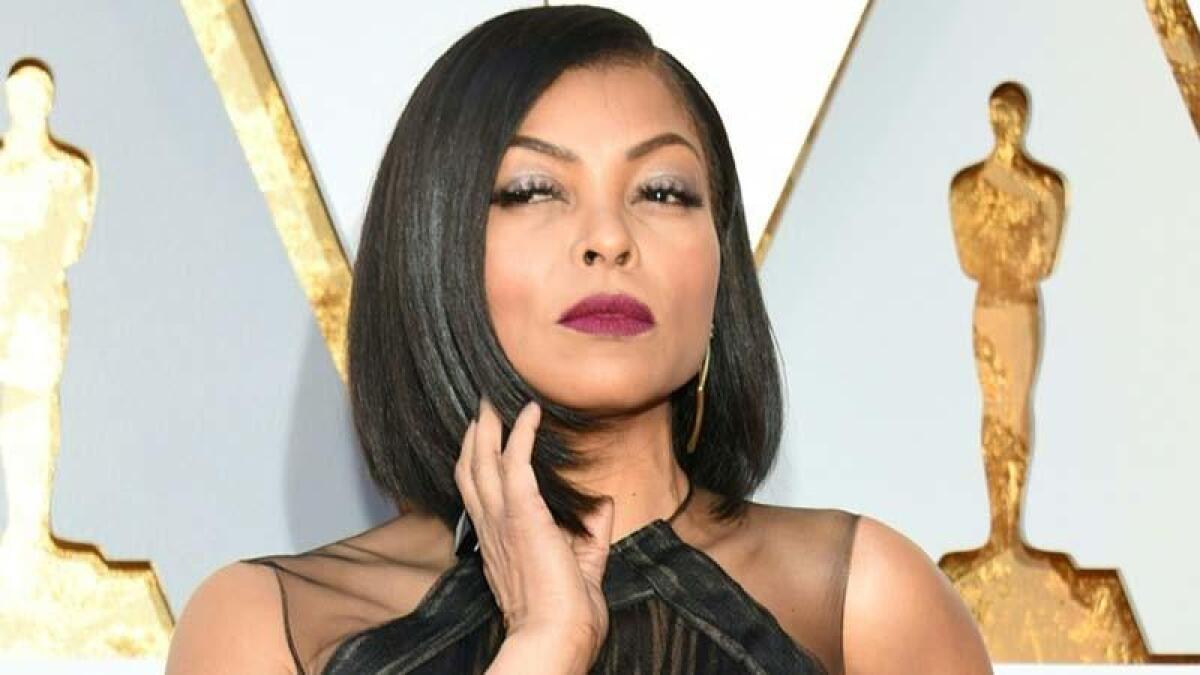
There was a definite bit of shade of the Oscars red carpet Sunday, thanks to Taraji P. Henson.
As Ryan Seacrest soldiered through a handful of interviews, he initially managed to escape even the slightest mention of the sexual harassment allegation that was leveled against him recently.
Henson apparently didn’t get the memo.
Taraji P. Henson says she wasn’t dissing Ryan Seacrest at the Oscars
“You know what, the universe has a way of taking care of the good people,” she said to him directly, flicking a finger under his chin as she continued, “You know what I mean?”
Seacrest replied, “I agree.”
The “American Idol” host disagrees with his accuser and has since October denied the accusations made by his former stylist, Suzie Hardy. In November, a third-party investigator hired by E! News found “insufficient evidence” of misconduct. Hardy went public with details last week.
- Share via
Mark Bridges wins for costume design
Mark Bridges wins the 2018 Academy Award for costume design for “Phantom Thread.” The film’s star, Daniel Day-Lewis, is pictured.
- Share via
‘Darkest Hour’ wins for makeup and hairstyling
The 2018 Academy Award winners for makeup and hairstyling are Kazuhiro Tsuji, David Malinowski and Lucy Sibbick for “Darkest Hour.”
- Share via
Sam Rockwell wins for actor in a supporting role
Sam Rockwell wins the 2018 Academy Award for actor in a supporting role for “Three Billboards Outside Ebbing, Missouri.”
- Share via
Wakanda forever: ‘Black Panther’ cast shines on Oscars red carpet
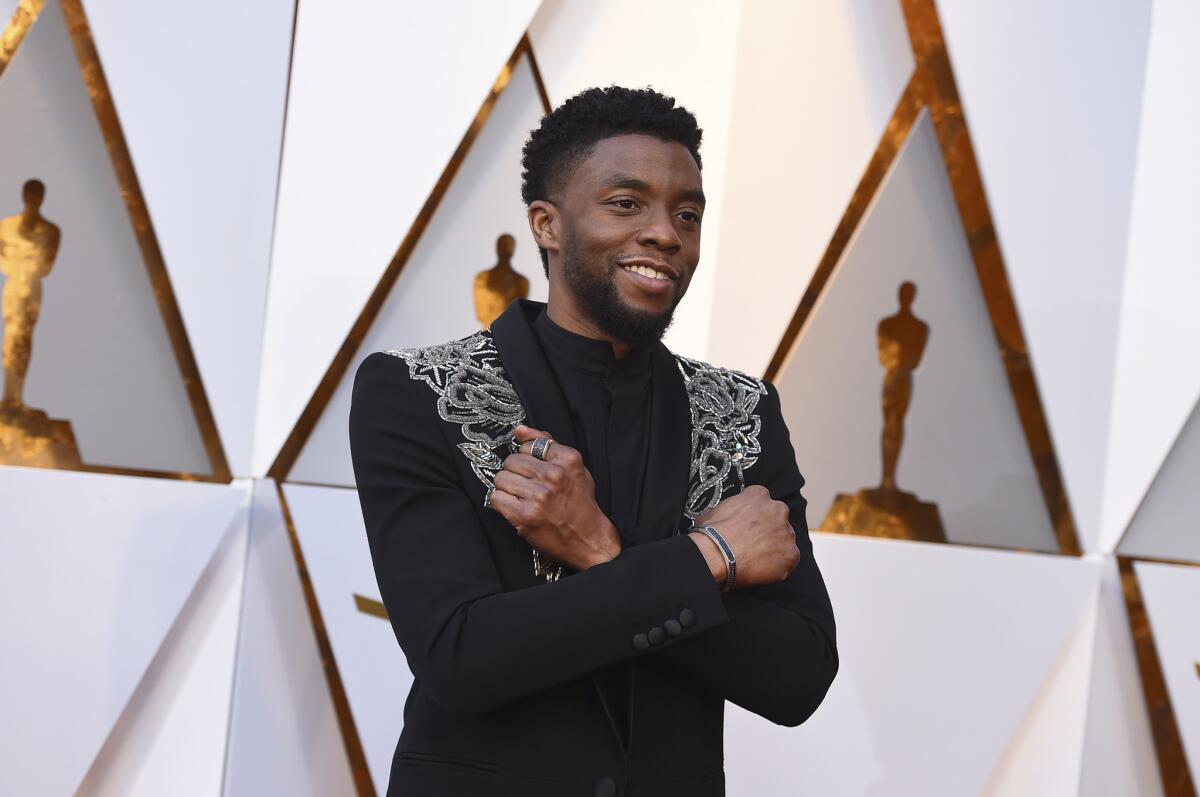
Fresh off the film’s third weekend topping the box office, several members of the “Black Panther” cast graced the Academy Awards red carpet looking like Wakandan royalty.
“The Walking Dead’s” Danai Gurira and Oscar winner Lupita Nyong’o were spotted on the carpet together, with Gurira in pale pink and Nyong’o rocking black and gold.
“Black Panther” star Chadwick Boseman repped Wakanda several times on the carpet, posing for photos and shouting “Wakanda forever” to thrilled onlookers.
And, of course, Daniel Kaluuya was featured prominently on the carpet, given his nomination for lead actor in Jordan Peele’s horror hit “Get Out.”
Check out the style below.
Read more about the continued box office dominance of “Black Panther” here.
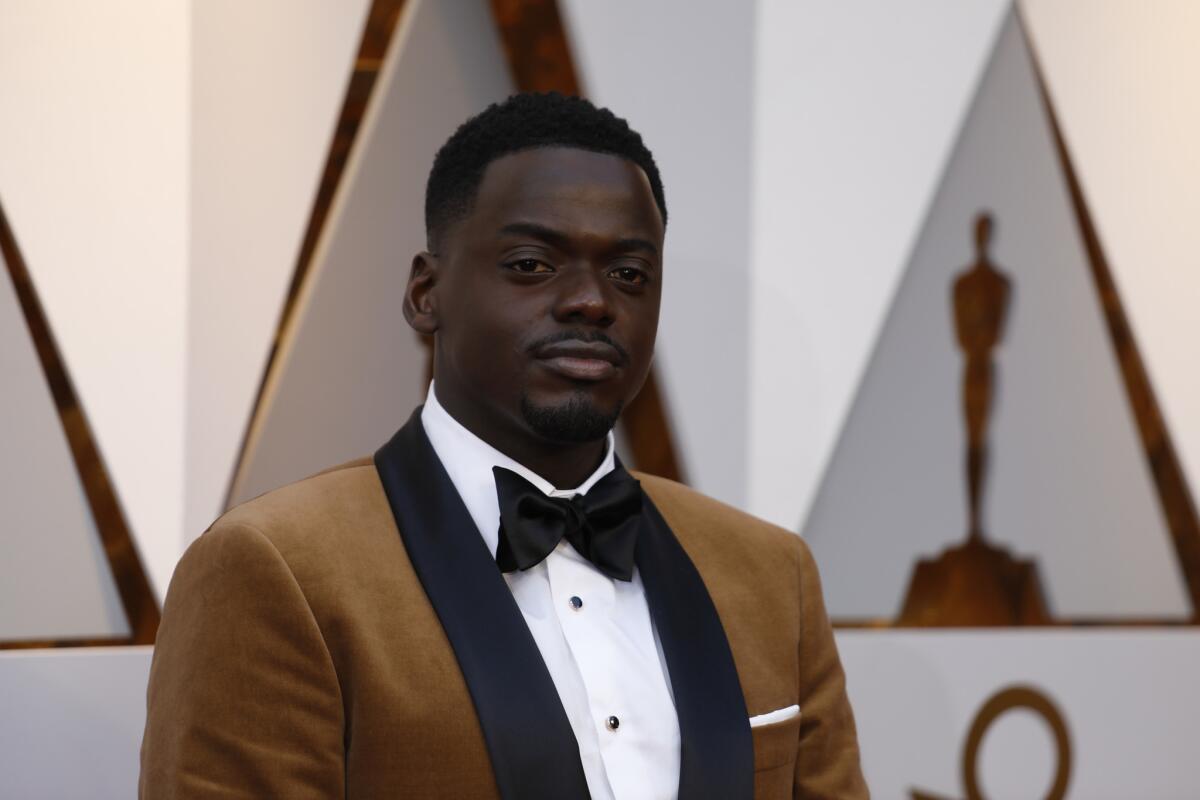
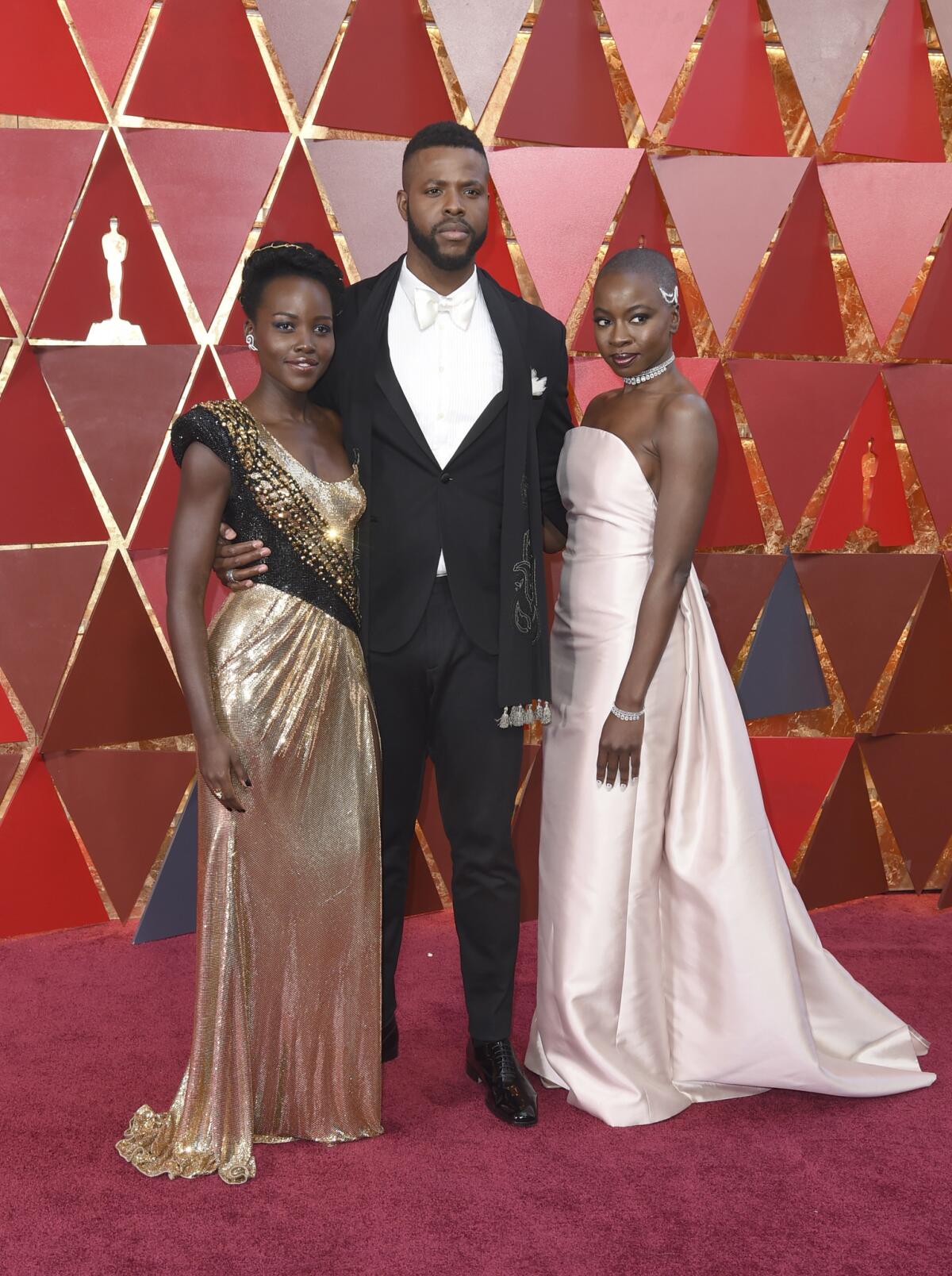
- Share via
Michael Stuhlbarg on making films that resonate with the LGBTQ community
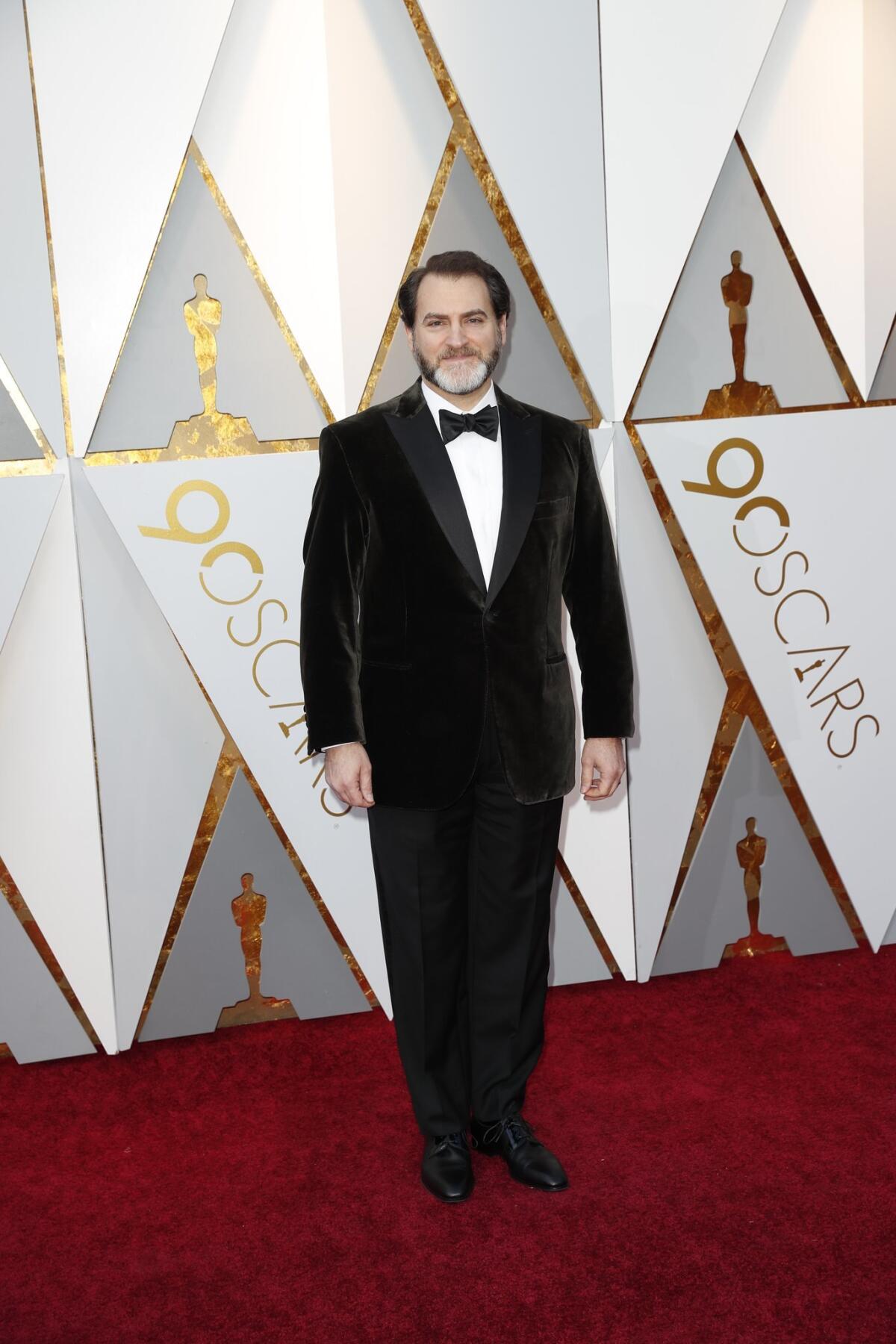
It’s been a long year. ‘Call Me by Your Name’ came out at the Sundance Festival and people seemed to respond to it right away, and so we’ve been talking about it all year long, which has been thrilling and a good thing. I’m glad that the films have been received well. I think films about love in particular are specific to all of us, and I would say thank you [to the LGBTQ community] and I would say I support you and I hope to tell more stories that resonate with you and with us all.
— Michael Stuhlbarg, “Call Me by Your Name” actor
- Share via
‘Phoenixes’ Ashley Judd, Mira Sorvino talk Weinstein, Time’s Up on Oscars red carpet
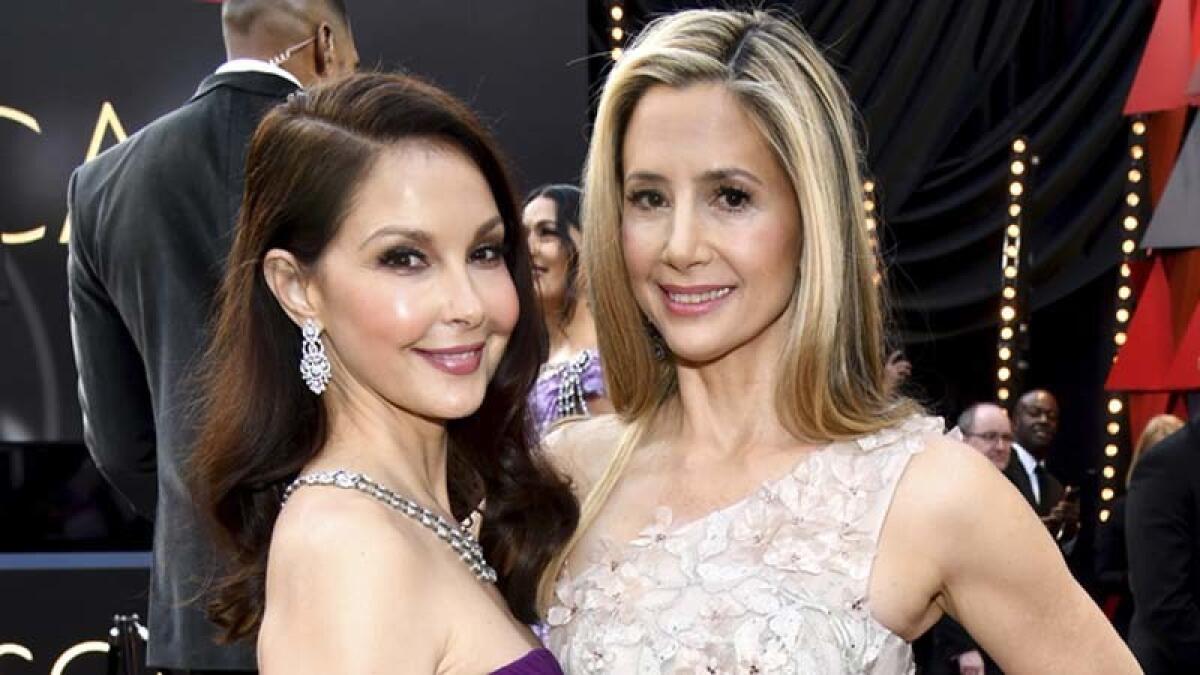
Oscars presenter Ashley Judd brought Mira Sorvino to the ceremony as her date on Sunday night. And the two women had plenty to say about disgraced producer Harvey Weinstein and the Time’s Up movement that sprouted in his harassment scandal’s wake.
“I want people to know that this movement isn’t stopping,” Sorvino told Vanity Fair’s Krista Smith during ABC’s red carpet coverage. “We’re going forward until we have an equitable and safe world for women.”
Time’s Up advocate Sorvino, who won her supporting actress Oscar for 1995’s “Mighty Aphrodite,” said she is actively supporting anti-sexual harassment legislation in California.
“We want to take our activism and our power into action and change things for every woman, everywhere working in any workplace,” Sorvino said.
The two women, who were among the scores of women who publicly accused Weinstein of harassment, highlighted the active support they’ve received since coming forward and the various initiatives that are encouraging change for for women in Hollywood and beyond.
Though no official dress code was implemented on the Oscars red carpet, the movement was still a popular topic of discussion.
Judd recounted her alleged 1997 encounter with Weinstein and said she told her “devastating” story the moment it happened.
“What’s so spectacular about this moment is that finally the world is able to hear,” Judd said. “We women, one, our voices have been squelched, and two, those of us who have come forward, we’ve often been disbelieved, minimized, shamed. So much of the movement is about externalizing that shame and putting it back where it belongs, which is with the perpetrator.”
Judd described them as “phoenixes that can light the way” in Hollywood and beyond.
The women noted that 20,000 people have donated to the Time’s Up Legal Defense Fund, which has already raised more than $21 million since it was established at the beginning of the year.
- Share via
Jimmy Kimmel is pumped backstage before the Oscars, and Kelly Ripa is ready for interviews without Ryan Seacrest
With 10 minutes to go before showtime Jimmy Kimmel emerged from his dressing room, where dozens of staffers outfitted in black awaited him. One launched into a spontaneous chant: “Best show ever! Best show ever!” It rang through the halls and continued as Kimmel walked toward the stage.
Also following behind him? Kelly Ripa and Helen Mirren, who emerged from the elevator leading to the backstage area just as the chant was in full swing. “Dame Helen Mirren is here! Let’s have a little respect, for Christ’s sake!” Ripa kidded. The talk show host has a prime spot backstage to interview celebrities after they win their big prizes. She will be conducting interviews for her talk show, “Live With Kelly and Ryan,” without her co-host, Ryan Seacrest.